2023 Follow us on iGamingCapital.mt We bring you the latest in iGaming €8 (WHERE SOLD)

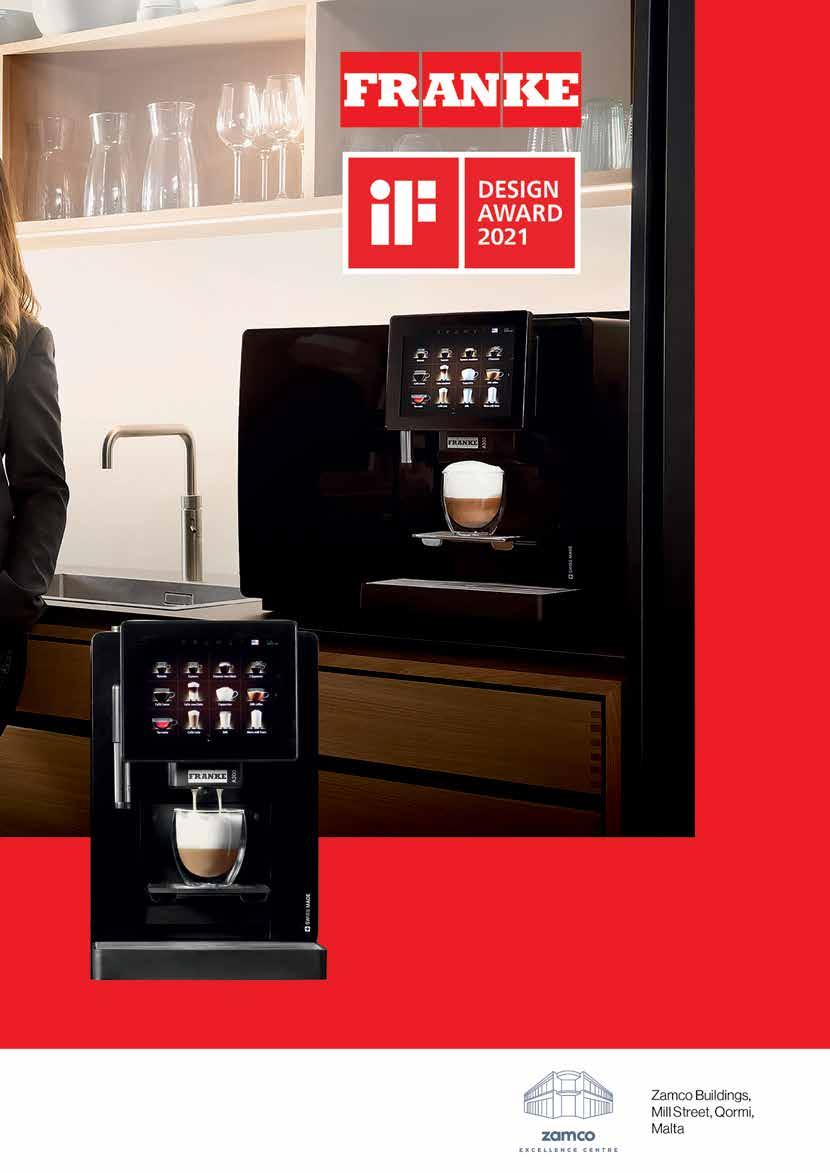






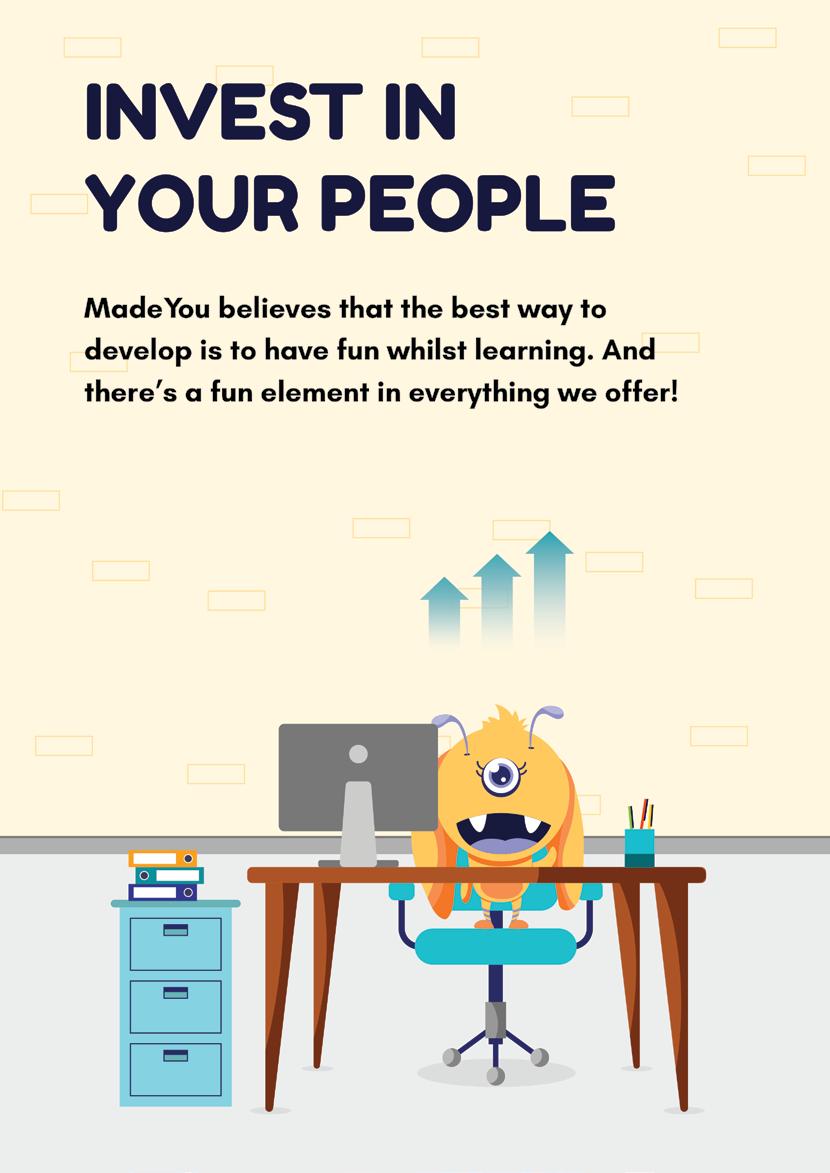
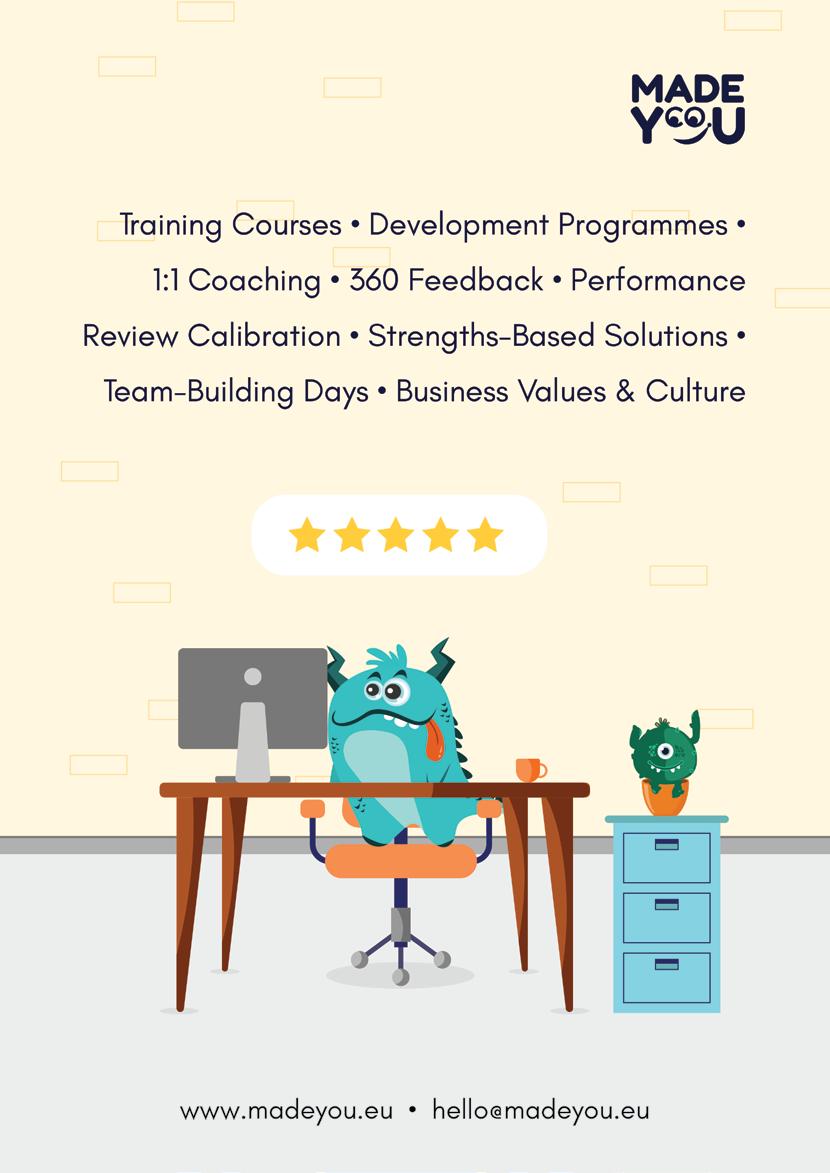

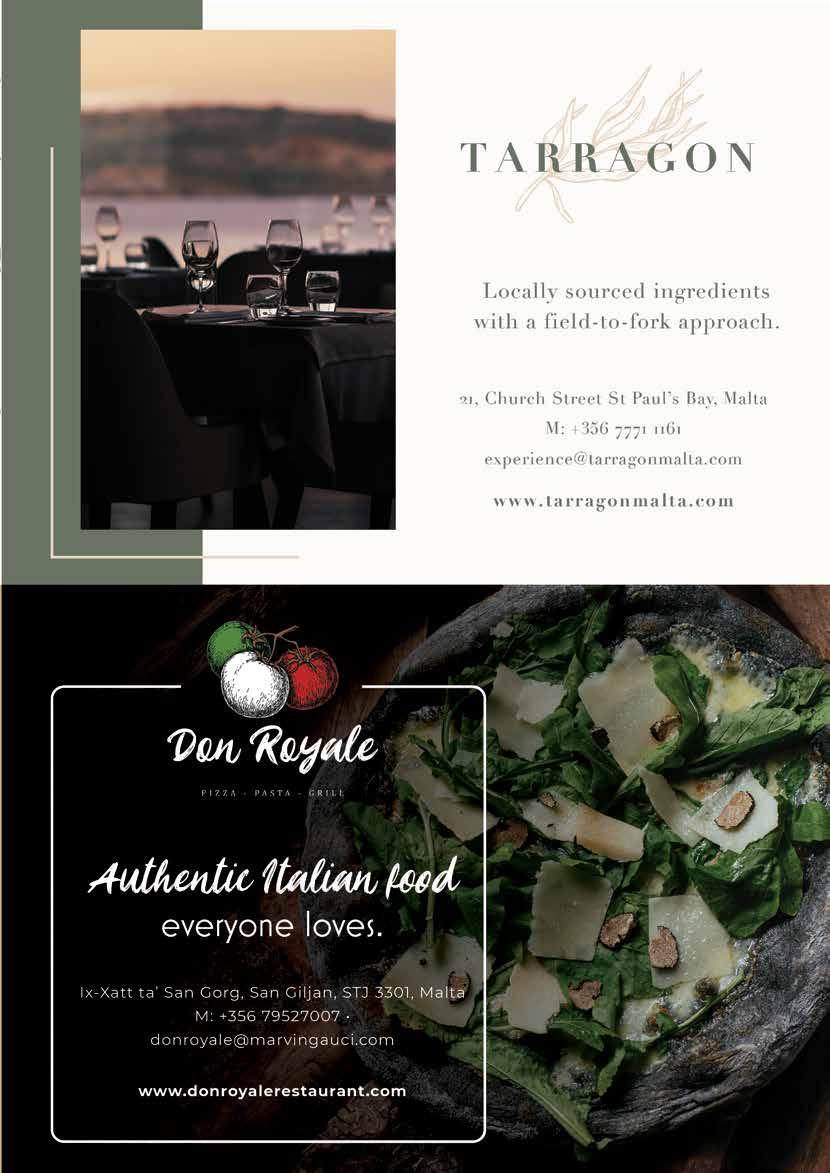
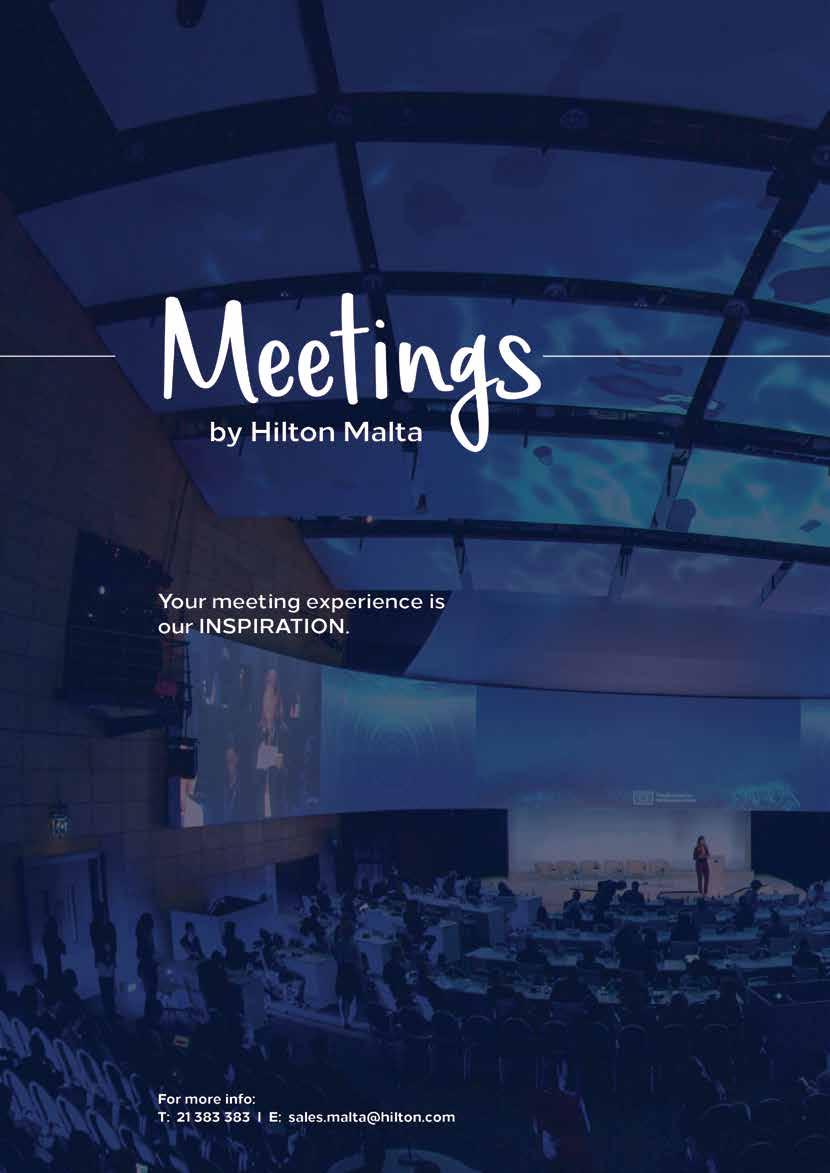

MALTA CONTINUES TO BE A HUB FOR iGAMING AND EMERGING INNOVATIVE TECHNOLOGIES
In one-to-one interviews, leading stakeholders shed light on where the gaming industry stands and where it’s heading.
INNOVATION & CONSOLIDATION –HARNESSING THE FUTURE OF MALTA’S iGAMING INDUSTRY

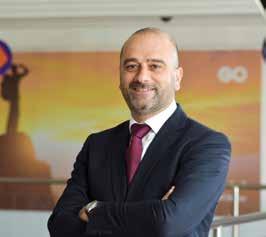
The experts delve into the present complexities of Malta’s iGaming industry and where its future lies.
A CELEBRATION OF SUCCESS, GROWTH AND GREAT ASPIRATIONS
Fresh from celebrating 10 years since the company’s launch, Stefania Curmi, Head of HR South at LeoVegas, reveals what’s next for Team Leo.
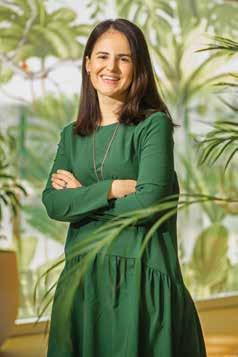
CASTING A WIDER NET TO BROADEN MALTA’S PRESSURED TALENT POOL
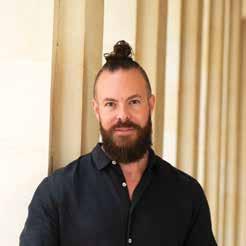
remote working be the answer to employing staff from far and wide? The experts weigh in on the good and bad of recruitment in iGaming.

BUILDING A FUTURE ON PEOPLE, SERVICE AND VISION
Executive Officer Lahcene Merzoug is upbeat about PressEnter Group’s future. He shares his outlook for the company in the months ahead.
TAKING REMOTE AND HYBRID WORK TO THE NEXT LEVEL
As businesses continue to adapt to remote and hybrid work set-ups, Arthur Azzopardi, Chief Officer at GO Business, explains how GO’s products can facilitate this.

016 2023 EDITION CONTENTS
20
Chief
38
30
Could
42
56
50 C O T N
ASSISTING GAMING COMPANIES TO NAVIGATE THE LEGAL AND BUREAUCRATIC WILDERNESS
Head of Licensing at IGA Group, Keith Seisun, expands on the company’s extensive services.

SHAKING UP PAYMENTS SOLUTIONS FOR iGAMING CLIENTS
FinXP CEO Jens Podewski highlights the company’s latest steps in providing a reliable, practical alternative to
banking.
MINDFUL OFFICE DESIGN

Cassar, Founder and
Designer of
of his
walks
for Bally’s
SOFTWARE AND AI: WHAT’S NEXT FOR iGAMING?

Three CEOs give
on where
in
might take
HOW TO IMPROVE DECISION-MAKING FOR BETTER BUSINESS IMPACT

Vistage Malta Chair and Coach, Julian Azzopardi, shares just how important better decisions are for driving positive impact.
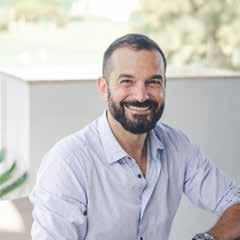
THE RISE AND RISE OF MALTA’S PROPERTY RENTAL MARKET

Three leaders from Malta’s
rental market weigh in on how this powerful economic
goes hand in hand with the iGaming industry.
017 2023 EDITION CONTENTS
traditional
64
72
68
their predictions
tomorrow’s tech
iGaming
the future. 76
property
sector
108
THAT MAKES A HOME AWAY FROM HOME Sean
Lead
Design Hub Studio,
us through one
latest office design projects
Interactive. 98 E N S T

PUBLISHER
Content House Ltd
Content House Group 3, Level 2, Mallia Buildings Triq in-Negozju, Zone 3, Central Business District, Birkirkara CBD 3010 Tel: 2132 0713 info@contenthouse.com.mt www.contenthouse.com.mt
EDITOR
Martina Bartolo Parnis
HEAD OF SALES & BUSINESS DEVELOPMENT
Marie Claire Camilleri
SENIOR BRAND SALES EXECUTIVE Wanaha Camilleri
DIRECTOR OF SALES & OPERATIONS Lindsey Napier
CREATIVE DIRECTOR & DESIGN Nicholas Cutajar
Content House Ltd would like to thank all the protagonists, contributors, advertisers and the project team that have made this publication a success.
Articles appearing in this publication do not necessarily reflect the views of Content House Ltd. All rights reserved.Reproduction in whole or in part without written permission of the publishers is strictly prohibited.
iGaming Capital is distributed to iGaming companies operating in Malta and to relevant business and commercial stakeholders in Malta, including leading law firms, financial services companies and business consultancy firms, as well as to local auditors, accountants and accountancy firms. It is also distributed to Government ministries, entities and departments, as well as to IT and software development companies, recruitment agencies, business centres, car showrooms, yacht marinas and architecture firms. Beyond the free distribution network, iGaming Capital is sold at leading newsagents around Malta.
A maturing industry
Almost 20 years since the establishment of Malta’s iGaming industry, the island continues to be the destination of choice for many companies seeking growth and success within an iGaming hub of international repute.
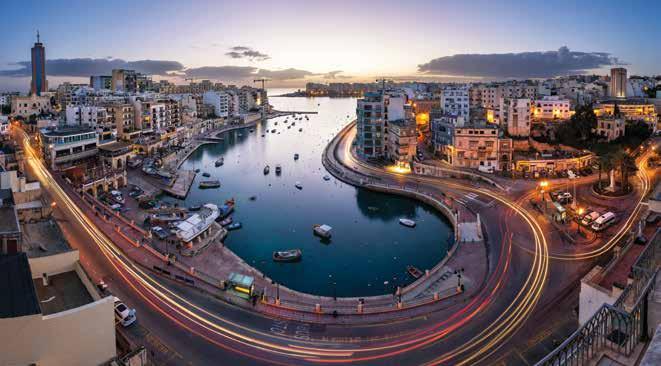
Despite the many curveballs the past few years have thrown, remarkably, the industry has continued to thrive – the recently published Malta Gaming Authority’s Annual Report for 2021 has shown notable increases both in revenue generated as well as new licences issued, which reflect sustained confidence in this ever-growing market segment.
In this annual edition of iGaming Capital, we delve into a range of topical issues, from a detailed overview of where the industry stands in view of regulatory and HR challenges to the opportunities that lie ahead in the fields of Environmental, Social and Governance (ESG), and the convergence of spheres that could make Malta a wider hub for online entertainment.
Experts in the field of Artificial Intelligence share their views on how new technology is finding its place within the online gambling world, and the efforts needed to make it more accessible and trusted.
In addition, industry leaders shed light on the successes and challenges their businesses are facing within Malta’s iGaming ecosystem, and share insight on what they anticipate will be testing, as well as exciting, for the industry in 2023.
With this and much more, we hope you enjoy leafing through the pages of iGaming Capital.
Martina Bartolo Parnis
019
2023 EDITION FOREWORD
Innovation Consolidation:
future
MALTA’S
GAMING
After almost two decades dedicated to establishing, nurturing and growing Malta’s robust iGaming industry, local and international developments – from a global pandemic to the country’s temporary greylisting – have threatened its stability. And yet, it appears to be going from strength to strength. Martina Bartolo Parnis speaks to the experts to understand the industry’s present, and where its future lies.
At a time when countless industries are starting to find their feet again following two extremely volatile years – with more global instability threatening to disrupt the progress achieved since the lifting of COVID-19 restrictions – it is remarkable that Malta’s iGaming industry not only navigated capably through the storm, but emerged stronger than before.
The Malta Gaming Authority’s (MGA) 2021 annual report published in September 2022 echoes this, showing year on year growth since 2019. Indeed, the total Gross Value Added (GVA) generated by the industry in 2021 is estimated at €1,019 million – compared to €893 million in 2020 – making up

020
COVER STORY 2023 EDITION & HARNESSING THE
i
INDUSTRY OF
around 7.7 per cent of the country’s economy. The number of licences issued in 2021, which include spillover from the previous year, amounts to 46, bringing the total number of licences to 351, and the number of companies in operation up to 341, compared to 323 in 2020.
The numbers have been on a consistent upward trajectory, reflecting the industry’s capability to acclimatise to everchanging local and global regulatory and social conditions, with the crucial support of the Government, which is an essential ingredient in its recipe for success. Earlier this year, Silvio Schembri, Minister for the Economy, EU Funds and Lands, pledged the Government’s consistent support for the industry, and announced the establishment of an iGaming Council, aimed at facilitating governmental relationships between parties, offering high-level advice and collaboration on future policies.
However, despite the gains made by the industry over the past years, there have also been losses, and, as the experts detail, these are indeed difficult times.

Russell Mifsud, Director and Gaming Lead at KPMG Malta, traces some of the current challenges back to the start of the pandemic. “Early on, land-based operators took a hit, which in a way created opportunities for Malta as they began looking into securing an online gambling licence, and doing so through Malta was attractive for those looking for a dot-com, rather than dot-country set-up. However, the pandemic also fast-tracked other countries’ efforts to start regulating online gambling, which allows them to capture tax that would otherwise leak into offshore markets, therefore reducing the reach that the MGA licence once had.”
Mr Mifsud adds that Malta’s greylisting by the Financial Action Task Force (FATF) in June 2021, which happened in tandem with the pandemic, hit the country hard and caused significant unease for companies based here. “We saw many cases of ‘guilty by association’ for banking or payment considerations, for instance. Payment solutions companies would charge a higher amount to accept funds to Malta-based businesses, because they would deem them to be riskier, which squeezed margins further for operators.”
From an investment perspective, the KPMG Director asserts that measuring the impact of greylisting is even harder as, “while we can measure what we see, it’s harder to measure ‘what could have been’, such as a company’s plans to expand its operations in Malta, open a new department or recruit more people.”
Since being removed from the grey list last June, Mr Mifsud believes that Malta has come out stronger. “It was comforting for associations and operators to know that there were no shortfalls in the gaming industry and the MGA was in the clear. Nevertheless, being off the grey list is an opportunity for the country to show that it has pulled up its socks, got its house in order and is now stronger than it ever has been.”
021 2023 EDITION COVER STORY >
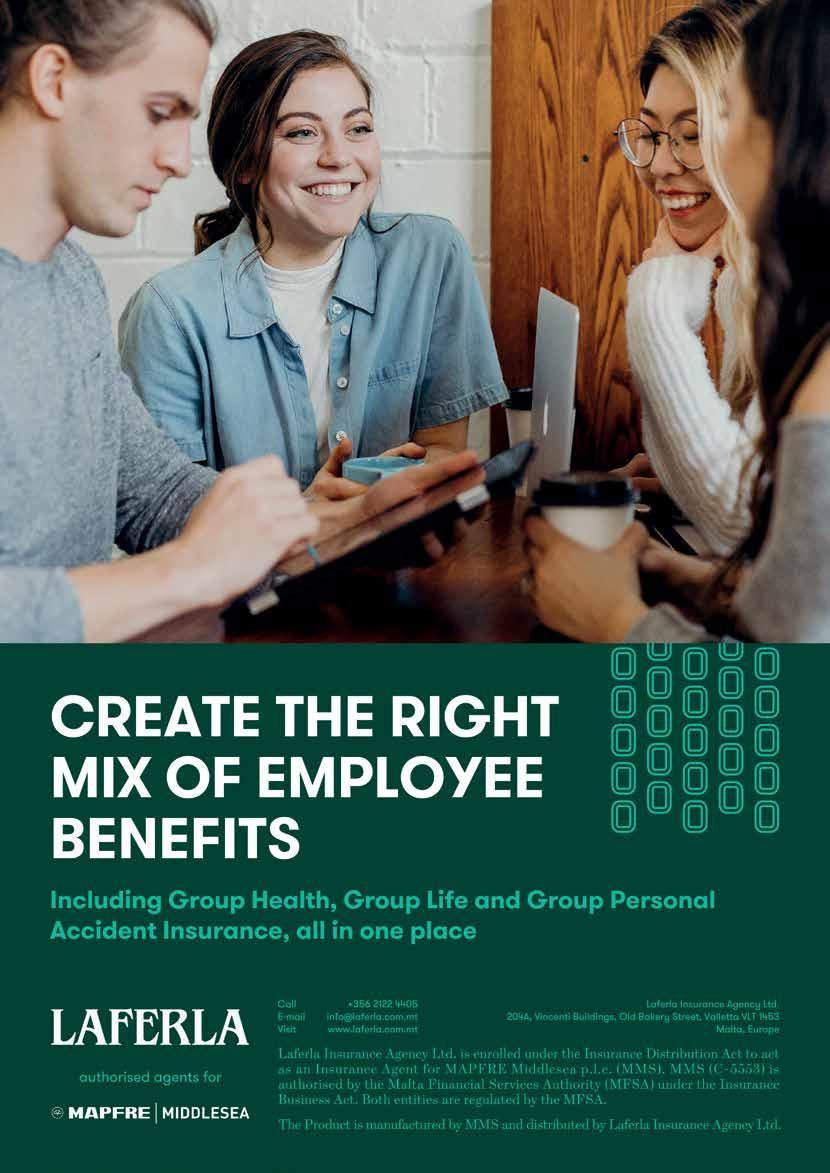 Russell Mifsud, Director and Gaming Lead, KPMG
Russell Mifsud, Director and Gaming Lead, KPMG
Responsible gambling, which has become a key focus across Europe, is also posing challenges. Mr Mifsud says an ongoing debate at industry level is that overcomplicating regulation, and forcing an operator to apply more measures, may encourage players to move to unregulated entities, giving rise to the black market, which is not only less bureaucratic for the user, but may offer more attractive returns because they are not constrained by the same parameters as regulated entities.
“Responsible gambling continues to challenge the industry, even from a compliance perspective, such as advertising restrictions for player protection, which makes it especially hard for new companies to get their name out there,” says Mr Mifsud. “Dot-country regulation complicates matters further as each country has its own measures and regulations, with little harmonisation, forcing companies to really beef up their compliance teams which continues to put pressure on margins. The key word the industry keeps looking at is sustainability.”
Zeroing in on the positive developments, Mr Mifsud says that the ecosystem Malta created is hard to replicate. With almost two decades of experience, the island has built a comprehensive set of stakeholders that makes it an attractive destination for new operators who know there are numerous B2Bs, affiliates, Payment Service Providers (PSPs), and a whole spectrum of professional service providers to fast-track their efforts.

“We’re also seeing a convergence of spheres, which is one of the exciting areas in the industry. A perfect storm is brewing, being driven primarily by the US but also having a knock-on effect on Malta, where gambling, media, video-gaming, eSports – entertainment more broadly – are coming together and creating a new beast,” says Mr Mifsud. “Malta is investing time and resources to strengthen the ecosystem and future-proof it.”
US operators are closing in on the knowledge gaps that exist between online and land-based gambling, and Malta has seen significant investment from the US to acquire businesses based here – most recently with the acquisition of LeoVegas by entertainment giant MGM Resorts International.
Mr Mifsud points towards the rise of ESG (Environmental, Social and Governance) consciousness as another positive development, which has been a source of significant investment for many companies, including KPMG itself. “The ESG agenda is now climbing toward the top of CEOs’ objectives. It is increasingly front of mind at Board level, in the media, and among consumers. It presents a real opportunity for the industry to collaborate more collectively, move the needle on public perception, and have a net positive impact on society, which may help counter some of the social qualms that exist around what can often be considered to be an industry in the firing line. Beyond the sustainable benefits, embedded ESG strategies present the potential for a competitive edge, by effectively navigating the remote gaming industry’s ecosystem, and anticipating its upcoming Corporate Sustainability Reporting Directive (CSRD) reporting commitments.” >
023 2023 EDITION COVER STORY
“[ESG] PRESENTS A REAL OPPORTUNITY FOR THE INDUSTRY TO COLLABORATE MORE COLLECTIVELY, MOVE THE NEEDLE ON PUBLIC PERCEPTION, AND HAVE A NET POSITIVE IMPACT ON SOCIETY.”
The industry’s adaptability is a key positive element that stakeholders are quick to praise. Lahcene Merzoug, CEO at PressEnter, says that although most businesses were impacted by the pandemic with regards to finding a new way of working in very little time, many were able to continue with a ‘business as usual’ approach – albeit, a new one.
“We decided to invest in a new office at the end of last year, expanding our footprint further in Malta. We now have state-ofthe-art headquarters based in Silema which have been designed to provide the optimum working environment for our staff. During that time, we also recruited some of the best talent in the industry and I think that’s because Malta created a fantastic environment for iGaming to thrive.”
Throughout the pandemic and beyond, PressEnter upheld its ‘people first’ ethos, putting it front and centre of the company’s culture, ensuring that colleagues never felt isolated, were reminded they are valued and part of a team – even if they were working from home. “We did this by sending care packages such as fruit baskets, exercising gear and cakes on birthdays. We also care deeply for the overall health of our staff, and we offered free mental health consultations with a well-respected organisation in Malta,” says Mr Merzoug. “We stepped up, and I think this was reflected in the fact that we didn’t see any of our employees leave the company as a consequence of the pandemic. We are very proud of that fact.”
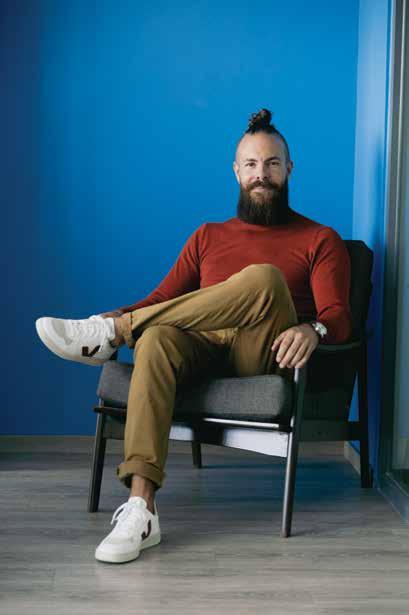
Reflecting on the past year, Mr Merzoug says the company’s expansion strategy, both offline and online, has been one of its foremost achievements. “Offline, we have grown our team and launched our new office, which was officially opened by Silvio Schembri, Minister for the Economy, EU Funds and Lands a few months ago,” he explains. “Online, we launched UltraCasino and RapidCasino, headed by superb leadership teams that are highly experienced in the markets they are live
in. We have also integrated new and exciting content from some of the best game providers in the industry, including adding a sportsbook to our portfolio, and we received our Romanian licence.” >
Photo by Inigo Taylor
024 2023 EDITION COVER STORY
“WE ALL HAVE A ROLE TO PLAY IN THIS THRIVING ECOSYSTEM THAT WE HAVE HELPED TO CURATE. IN OUR INDUSTRY, MALTA HAS LONG BEEN KNOWN AS ONE OF THE BEST, IF NOT THE LEADING JURISDICTION IN IGAMING.”
Lahcene Merzoug, CEO, PressEnter
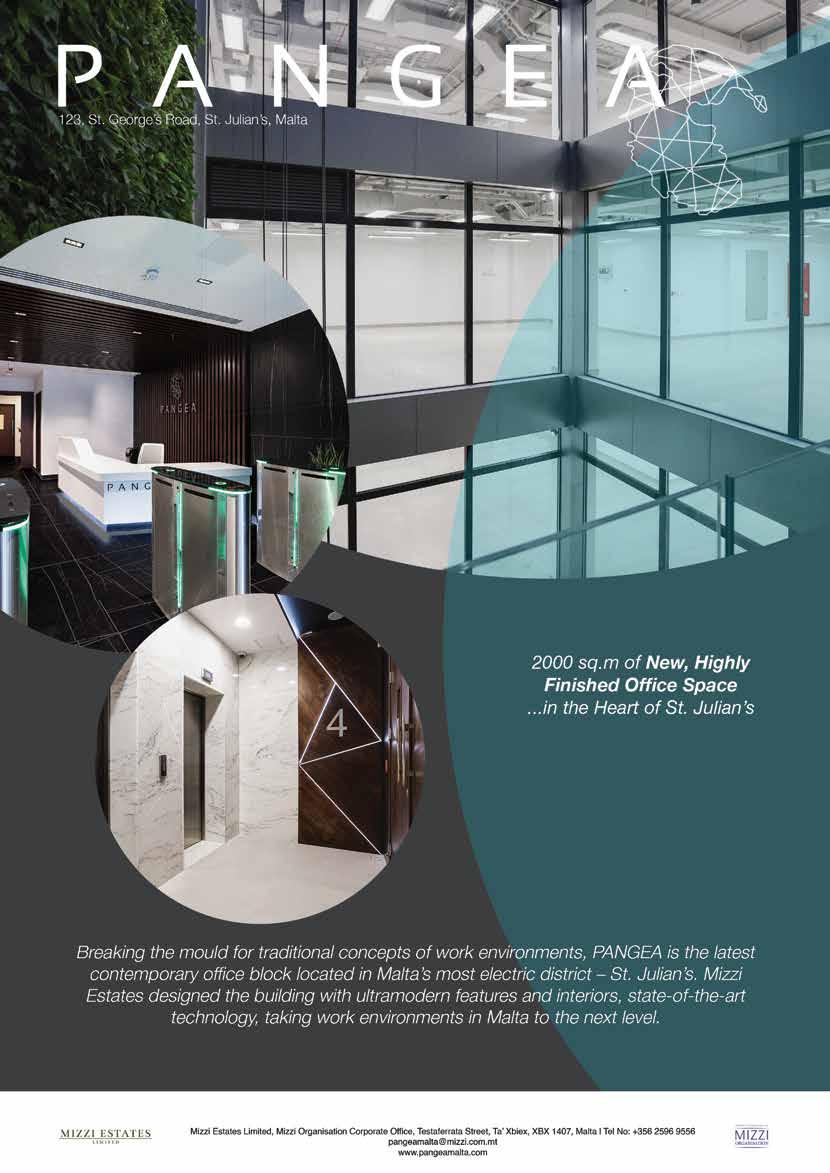

Sharing his views on Malta’s removal from the grey list, the CEO says this will undoubtedly make a difference to all businesses in Malta, and not just those that operate in iGaming. “The fact that Malta was removed within 12 months is testament to the Government’s commitment to resolving this situation as soon as possible. All businesses in Malta have a responsibility to ensure that it’s not a situation that the jurisdiction finds itself in again,” says Mr Merzoug.
“We all have a role to play in this thriving ecosystem that we have helped to curate. In our industry, Malta has long been known as one of the best, if not the leading jurisdiction in iGaming, and this is why we increased our own commitment by taking new premises and making it a fundamental part of our expansion plans moving forward.”
Citing the general health of the industry as “fairly good”, Stefan Nelson, Chief Finance Officer at LeoVegas, affirms that “Malta’s long-standing position as a key gaming hub in Europe, with its robust understanding of the opportunities and challenges that the industry is facing, is positive. There’s a lot of good iGaming talent on the island, we have the right support from Government, and there is the right technological infrastructure needed for us, as a company and large employer, to thrive.”
Access to talent, however, is an ongoing challenge for the company, that recently marked 10 years in operation. Mr Nelson says the island’s size and fierce competition make it difficult for a large operator like LeoVegas, both for hiring substantial talent, as well as finding the right people for senior roles. “Our company is nothing without its employees and positive culture. Finding recruits with the right level and kind of experience can be tough, particularly for certain roles, such as developers. We have big ambitions, and without the right resources it will be challenging for us to grow the way we want to.”
With that in mind, Mr Nelson says this is a challenge faced by other tech and iGaming companies, which reinforces the need to remain an attractive employer and offer an exciting environment coupled with prospects for growth. “Since COVID-19 and the rise of working from home – which I’m proud to say we handled well, adapting quickly and ensuring everyone felt safe and able to work – employees’ expectations have changed. I believe it’s important to have a strong corporate culture, to listen to what our staff wants and be flexible enough to have a working hybrid model that is adapted to the new normal.”
Positively speaking, LeoVegas’ acquisition by the hospitality and entertainment mammoth, MGM Resorts, brings many new opportunities. “MGM Resorts have super brands within their family, now our family, and a strong balance sheet, which provides us with financial flexibility to grow both organically and through M&A. LeoVegas has a strong culture, lots of great people and solid products and brands, so our joining of forces promises a very exciting future.”
Weighing in on the welcomed announcement in June that Malta was to be removed from the grey list, Mr Nelson says it was crucial that Malta got off as fast as it did, for Maltese businesses, foreign businesses and the economy.

“We’re seeing some light at the end of this tunnel and the country is heading in the right direction. However, it will take time to regain some of the trust that has been lost. We are still impacted by banks that are shy to work with Malta and the industry. We’re very happy that Government took the right steps to correct the situation within one year, it was impressive and created a lot of goodwill. But we should stay humble and continue with this positive momentum in order to regain that trust and get to where we should be.”
Looking ahead towards 2023 and the issues that are expected to dominate the industry, Mr Nelson believes the wave of local regulation that is sweeping across Europe will be top of mind. “As we and other iGaming companies have offered our services through a Maltese gaming licence, we are now shifting towards local licences as more and more countries start to regulate. How Malta and the industry handle this will be decisive, both for the economy and for the companies that operate here.” >
2023 EDITION COVER STORY
027
The Chief Finance Officer also believes there will be more consolidation in the industry, partly driven by increased local regulatory and compliance requirements, as well as higher taxes, demanded by the countries offering gambling licences, which will make it harder for smaller companies to cope. “We see ourselves as one of a few consolidators in this industry, not least now being part of MGM Resorts, where we certainly have the capacity to consolidate, and I expect to see this trend continue with greater force going forward.”
The PressEnter CEO believes that it is a good time to be a Malta-based licensed operator, also in light of Government’s pro-active stance towards the industry, however the challenges that existed this year will continue into the next. “Although we do have some of the best talent in Malta working at PressEnter Group, as we continue to grow, attracting the right people will become more difficult,” says Mr Merzoug. “That’s where we need to continue being an employer of choice, and create a culture where candidates aspire to work with us. There are also other factors that are outside of our control, such as the increased cost of living in Malta, which will undoubtedly impact our staff and anyone considering a career in Malta and looking to relocate here.”
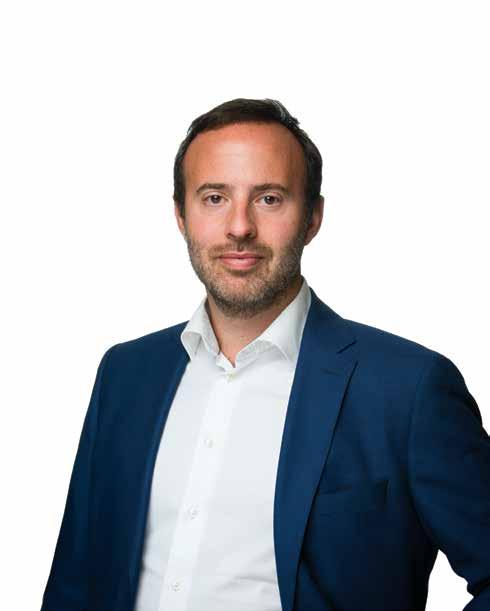
Indeed, the topics of human resources and cost of living are intricately intertwined. The KPMG Gaming Director believes there will always be gaps in the supply and demand of talent, particularly because the industry is constantly evolving and demanding different skill sets. However, the cost of living, which was one of Malta’s key attractions back in the day, has become a subject that’s impossible to avoid.
“I believe we need to understand the subject of human resources in general, not just in the iGaming industry. As an economist, I believe we need to see, holistically, where the future of Malta is, which includes workflow, an ageing population and managing the cost of living to ensure we can continue to attract young workers,” says Mr Mifsud.
As for the iGaming industry’s future, Mr Mifsud believes its success requires constant forward thinking. “We cannot rest on our laurels. Whatever decisions we’ll be taking as an industry, we need to find a way to leverage the Unique Selling Points we have today, fast-track our efforts and protect Malta’s future going forward.”
2023 EDITION COVER STORY 028
“MALTA’S LONG-STANDING POSITION AS A KEY GAMING HUB IN EUROPE, WITH ITS ROBUST UNDERSTANDING OF THE OPPORTUNITIES AND CHALLENGES THAT THE INDUSTRY IS FACING, IS POSITIVE.”
Stefan Nelson, Chief Finance Officer, LeoVegas
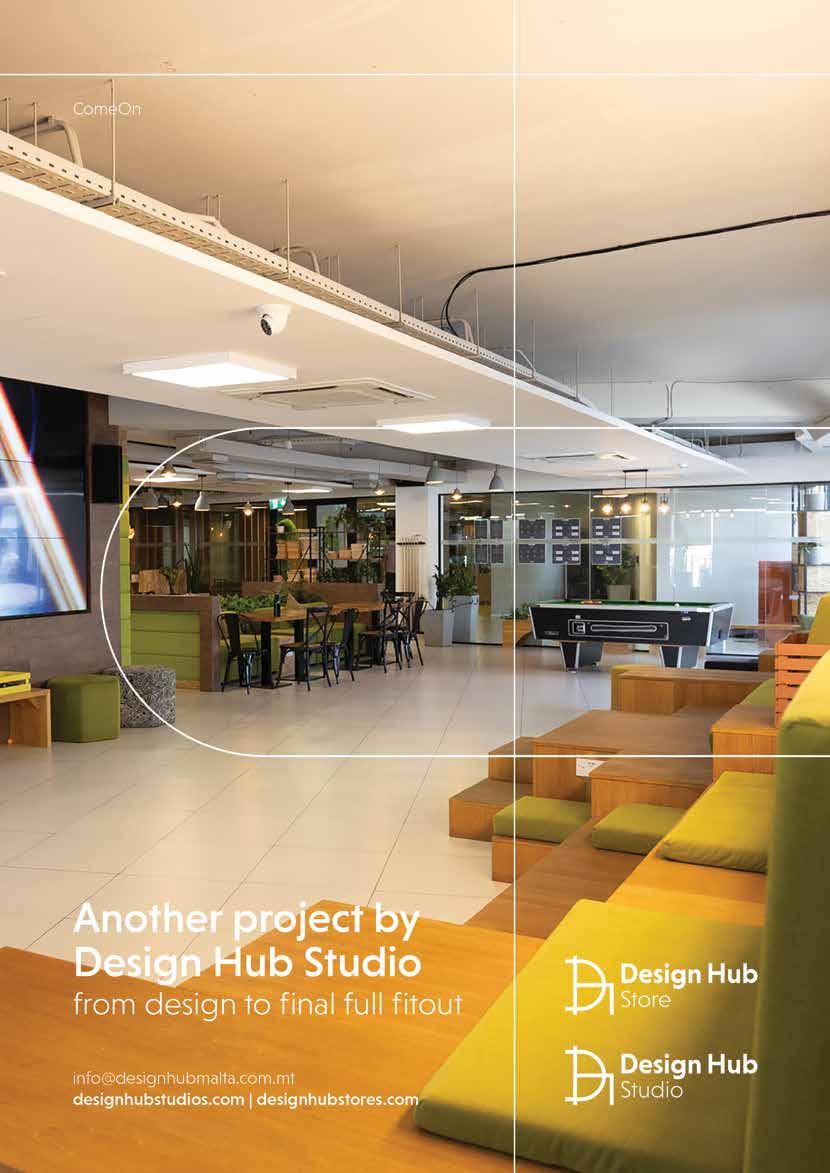
MALTA CONTINUES TO BE A HUB FOR

iGaming technologies AND EMERGING innovative
As Malta continues to consolidate its role as a major iGaming hub, as well as an innovator in the wider gaming spectrum and the digital arena, iGaming Capital features frank one-on-one interviews with top guns in Malta, that shed light on where these players – and their respective industry – stand today, and where they are heading. The four Q&A interviews are with Jesper Svensson, CEO of Betsson Operations, Trevor De Giorgio, Head of Compliance at Play’n GO, Kenneth Brincat, CEO of the Malta Digital Innovation Authority, and Ivan Filletti, CEO of the Malta Gaming Foundation.
030 2023 EDITION Q&A
Nasdaq Stockholm-listed Betsson serves millions of customers every year, winning accolades for its player-centric approach along the way. Jesper Svensson joined the company as the Managing Director of its flagship brand in 2013, eventually being appointed as CEO of Betsson Operations.
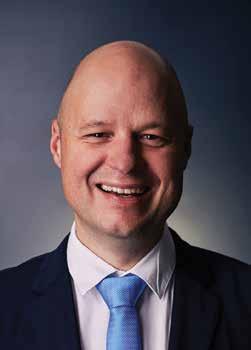
Betsson was among the first iGaming operators to set up shop in Malta. Today, it is one of the world’s, and Malta’s, largest and most successful gaming companies. What drew you here, and what keeps you here today?
Malta has been at the forefront of regulation when it comes to iGaming. In 2004, Malta became the very first EU jurisdiction to embrace regulation and licensing, and as a result of that, many operators looked at Malta as a potential base for some of their operations. At Betsson we embraced the opportunity presented by Malta some 20 years ago and opened our very first office here back in 2004.
Since those early days, Malta’s whole business infrastructure has developed exponentially. More importantly, we have seen some of our vendors set up shop in Malta in order to service the industry, making it easier for us to run our business. All of this means that we now have thousands of professionals who directly or indirectly work with the gaming industry, vastly increasing Malta’s talent pool and providing even more opportunities.
On top of that, there is, of course, everything else that Malta has to offer – its rich history, diverse culture, amazing weather, fun entertainment venues, the Mediterranean lifestyle, and the Maltese people themselves – hospitable, hardworking and welcoming.
Today, we consider Malta as our operational headquarters, with two offices on the island – one in Ta’ Xbiex and one in St Julian’s, employing close to 1,200 talented Betssonites. Our people represent approximately 60 different nationalities. In Malta, the largest proportion of them (around 30 per cent) are Maltese.
What support has Betsson found from local authorities?
We have always felt the support of local authorities in myriad ways. We also feel a strong connection and support from the Malta Gaming Authority, and I feel that it has always had a two-way communication which is beneficial to understand each other’s position and perspectives. I must also mention the valuable work that Gaming Malta is doing in promoting the island as a centre of excellence in the digital and remote gaming sector globally, while the educational initiatives, the student placement programme, as well as the Basecamp workspace, further nourish local talent.
Can you highlight some major milestones and successes in Betsson’s evolution?
Betsson traces its origins back to 1963 when it all started with a single slot machine in a restaurant in Sweden. In the mid-90s, we started exploring the world of online
gaming through the company Net Entertainment, even though the internet was still in its early days. We started working with the Betsson brand in 2003 and acquired it fully in 2005. Net Entertainment and the Cherry Group have since been separately listed and eventually bought for billions of euro, creating fantastic shareholder value. Over the years, we have acquired more brands and developed our own. We currently have a portfolio of more than 20 brands running mostly on our own technology platform.
In terms of regulations, we started off our online gaming offer on one licence from Malta. In the following years, the topic of regulation of online gaming started to gain momentum on a wider European level and some countries started looking into introducing their own licences. This trend is ongoing, and today we are licensed in 19 jurisdictions around the world.
What does the future hold for Betsson?
We are lucky to work in a sector that is expanding and in the digital space, where there are countless exciting options that are worth exploring. We have historically concentrated on Europe, but we are now looking for prospects beyond. Indeed, our growth strategy includes geographic expansion, and we intend to enter regulated or regulating markets where there are favourable circumstances and significant potential for growth. Lately, this has caused us to concentrate on Latin America.
Malta will remain strategic for us, of course, but because of the nature of our business, together with some of the limitations when trying to hire for specialised roles, we need to have presence in other countries too. Currently we have offices in 14 countries, with the latest one being Bogota, Colombia. That does not mean that we are planning to leave Malta – we still believe that Malta is the hub and centre of excellence for online gaming. >
031 2023 EDITION Q&A
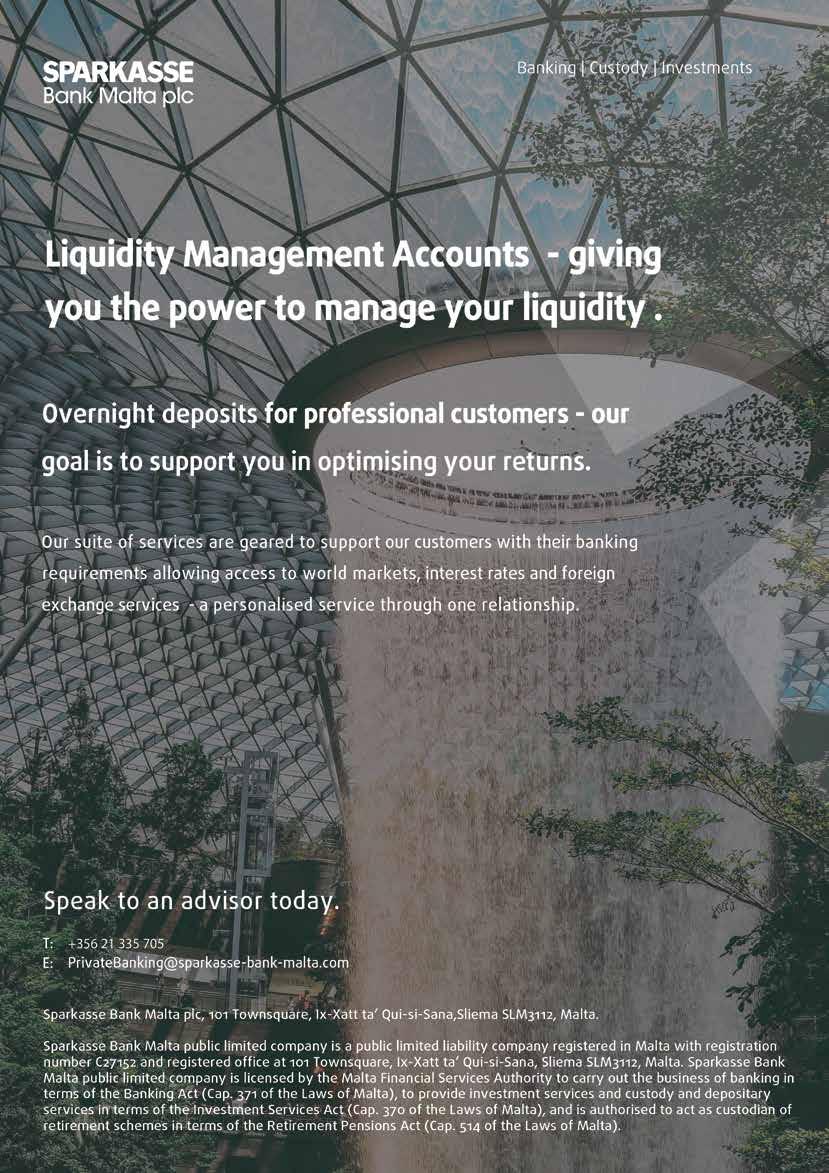
Malta has managed to retain its attractiveness as an iGaming jurisdiction despite growing competition and regulatory challenges. What’s behind its continuing success?

Malta has maintained its position as a top tier gaming regulator for a number of reasons. First off, the Malta Gaming Authority continues to work on further strengthening the reputation of the authority itself and also the regulatory structure in place. The changes made in various other sectors following Malta’s greylisting by the FATF have also been positive for both the regulator and the country. That being said, we cannot afford to let our guard down, and the role of the MGA as a gatekeeper vis-à-vis reputation is key and vital in growing stronger. Licensees on their part also have an important role to play. Operating within the parameters of their Malta and international licences is key towards strengthening the industry.
How is doing gaming business in Malta today different to how it was in previous years?
The industry in Malta has definitely matured over these past 20 years. It’s safe to say that it has gone from strength to strength, despite some hiccups along the way. The industry is resilient, as is the jurisdiction, and hence we have seen years of continuous growth.
Maturity is definitely the key word here, however, what has also changed, in my view, is the need to have a strong compliance culture in order to approach the new regulatory landscape all stakeholders face, particularly in Europe, where the lack of a common approach has led to piecemeal regulation, to the detriment of licensees and other stakeholders. Such bureaucracy allows unlicensed operators with little or no scruples for the safety of the consumer to thrive in certain environments. More needs to be done here to protect the industry.
There have been numerous other changes in the industry, technology-wise, games-wise, and even from the regulatory aspect – however, to me, the main takeaway is that this industry has matured.
What support has Play’n GO found from local authorities?
Local authorities in Malta have provided invaluable support. The Malta Gaming Authority on its part has always strived to offer the most well-balanced regulatory structure in place. By this I mean that the MGA has always sought to balance the interests of the customer, the industry, and also the jurisdiction when regulating the sector. Having a regulator that is industry-sensitive helps in developing a stronger market.
Can you highlight some major milestones and successes in Play’n GO’s evolution?
Going right back to the origin of the company in the early 2000s, I continue to be struck by the vision that our CEO and the foundation team had – that casino games would be played on mobile phones. This was before the smartphone existed, of course.
Play’n GO also invested heavily in our technology a number of years ago that now allows us to scale to meet the needs of our business and that of our customers. We can now effectively handle any volume of players, and are also able to launch games without any downtime at all.
Our games are built to be fun and entertaining first and foremost, and that ethos is probably THE success story of the business.
What does the future hold for Play’n GO in Malta?
Malta has been, and continues to be, a vital place for the iGaming industry to do business. The licensing regime run by the MGA is of significant importance to us and to our customers, so it is essential for the business to continue to call Malta our home. We are continuing to invest in our Maltese operations and have key staff from all areas of the business located here – we don’t see that changing anytime soon. >
033 2023 EDITION Q&A
Trevor De Giorgio is the Head of Compliance at gaming entertainment supplier Play’n GO. He previously served as Chief Legal and Compliance Officer at Greentube. In 2019, he won the Global Regulatory Award as Chief Compliance Officer of the Year.
Photo by George Scintilla
After one year at the helm, Kenneth Brincat gives us insight into his role as CEO of the Malta Digital Innovation Authority. The MDIA is the first regulator of its kind in the world, certifying Distributed Ledger Technology (DLT) platforms and smart contracts while handling the voluntary registration of technology arrangements.
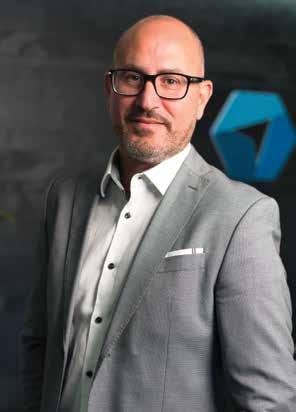
What value does the Malta Digital Innovation Authority (MDIA) offer investors in this sector?
Malta was the first jurisdiction in the world to establish a legal framework aimed at crypto assets and the underlying technologies. The approach Malta took was an innovative one – it is widely recognised that due diligence on the service providers and the services themselves is necessary in order to safeguard users and investors. However, Malta recognised that when it comes to innovative technology, there are additional risks that, as a jurisdiction, one would want to safeguard against. When failure of technology can result in major losses, be it of assets or otherwise, there lies a moral obligation to safeguard users through due diligence on the underlying technology.
The role of the MDIA lies in regulating with respect to technology safety. Indirectly, this safeguards investors, who can be assured that the technology is sound. The assurance being provided means that the technology at hand is doing what it is meant to do, and investors therefore have peace of mind that their money is being put into a serious product. Having such regulation in place also sends a clear message that Malta is serious about this sector, and on addressing matters related to it in the best possible way. We strongly believe that regulation can be used to enable, rather than hinder, technological innovation. This is backed up by the MDIA’s open-door policy, through which it is always available for dialogue on how to better enhance the local ecosystem, especially when collaborating with other entities.
What benefits can prospective investors in the innovation space expect when setting up in Malta?
Adopting such an approach has made Malta an attractive jurisdiction with multiple advantages. Most importantly, it shows that the country embraces a stance through which regulation helps in the attainment of the benefits that new technology offers. Investors find peace of mind in knowing that their investments are supported by a legal framework, especially since, by their very nature, it is difficult for the user to have an informed opinion on the security and safety of innovative technological services and products. Providing tools that enable such an informed opinion empowers users and gives investors further assurances when backing innovative technologies.
The Authority also offers a sandbox environment for early-stage developments in the field. What does this mean and how do investors and entrepreneurs benefit from it?
The Technology Assurance Sandbox is a facility designed to support the development of innovative digital products and services. The approach provides particular value to start-ups and smaller players, allowing them to have official recognition of their use of appropriate care and adoption of international standards when developing their solutions. We are now seeing the adoption of such technologyoriented sandboxes as a regulatory tool by the EU, as well as an enabling tool in the private sector, by, for example, Meta.
What are the main new trends and phenomena in innovative development that are best suited to Malta?
Many innovative technologies developed over the past few decades have enabled the scaling up of existing processes. For instance, while fraud detection in financial services was, until recently, largely a manual process aided by automated tools, recent advances in AI have enabled more thorough and fine-grained analysis that would have required too many resources using traditional approaches. Given the size of Malta, innovative technologies can be scaled up to a national level, while connecting the different applications for a harmonised approach. This can be seen, for instance, in the National AI Strategy, which specifies six projects that are aimed at adopting AI into everyday life with a focus on leaving a positive impact on society. The projects range from traffic management to education to health, with a common goal of collecting and collating data which would otherwise be difficult to analyse manually. AI techniques will enable the analysis of this data to improve and enhance the quality of our everyday lives. >
034 2023 EDITION Q&A


Malta has created welcoming infrastructure that makes it easy for a gaming organisation to come and set up here, and basically be a stage for its global ambitions. Our strength lies in our ecosystem: from the talent that is here, the companies, whether they are engaged in B2C or B2B activities, to all the additional services that are provided to the gaming sector, from legal to finance to tech. Companies interested in doing business in Malta will find a very welcoming government that safeguards and promotes the iGaming sector – which is not found in many other jurisdictions. Moreover, the Malta Gaming Authority is a tough but fair regulator, and highly esteemed within the sector. Then there are structures like the Gaming Malta Foundation. Our job is not just to promote Malta as a home of gaming excellence, but to actively take part in building it. It can be described as a centre, or a hub, but what we really are is a home.
How so?
We’re a home because we want people to feel comfortable here. We want the investors to feel comfortable here. We want the CEOs and support staff to feel comfortable here.
One aspect that really struck me, when borders were shut at the beginning of the pandemic, was the number of iGaming employees stuck outside Malta who wrote to us, pleading, “Bring us back home!” These were not Maltese people, but they felt that Malta was really their home.
When investors look into setting up operations in a country, they don’t just consider what’s in it for them. They want to know whether they will find talent, and whether their talent will be happy there. Will their talent’s families be happy there? So what Malta offers is the full ecosystem, that goes beyond the purely business element.
Gaming Malta has been very active in expanding the sector towards eSports and even video game development. Can you tell us more about this development?
We believe that, having built this ecosystem for iGaming, there’s nothing stopping us from building the same for the video game industry. The first strategic block is talent, and together with [video game developer] Unity Technologies, we created a programme at University and MCAST, which will see around 400 graduates academically certified by Unity. We have also built a 700sqm incubator space, a top-notch facility for high potential ventures called Basecamp, and we are working very closely with Malta Enterprise to create special incentives and initiatives for this industry.
The S-Tier ESL Pro League is also being held in Malta, bringing in professional eSports athletes from around the world. We’ve been able to leverage our position as a European jurisdiction and a top tourism destination, putting Malta on the map at the very highest level of the sport.
One of Europe’s top immersive tech companies, Draw and Code, recently relocated their research and development facility to Malta. One of their top investors is Entain, one of the largest iGaming groups. You can join the dots. There are video game studios like Exient, PlayMagic, 4A, working with the top publishers in the industry, and some great local success stories like Flying Squirrel and Anvil Studios. Amazing Geeks, owned by Voodoo, is based in Base Camp. Most recently, Keywords, one of the most important technical and creative services suppliers to the industry, announced that it will be establishing a presence in Malta. So there’s a lot happening right now – things are moving fast.
What opportunities should investors look out for?
Photo by Alan Carville
We are building up a very strong ecosystem between eSports, video gaming, and iGaming. What we are seeing is convergence of technology. People in these different industries talk to each other, especially when it comes to immersive tech. The use of Virtual Reality (VR), Augmented Reality (AR), developments in the metaverse – that’s what we’re building. We are steadfast in our commitment to having the right elements to build a platform for success, and we are open for business.
Editorial Note – These interviews were conducted for our sister brand, and international investment guide, Malta Invest 2023.
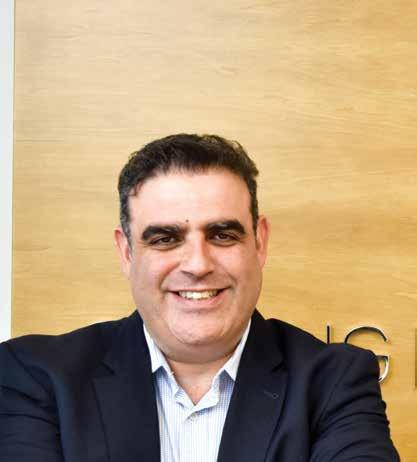
037 2023 EDITION Q&A
What is it about Malta that makes it such an iGaming powerhouse?
In his role as the Gaming Malta Foundation’s Chief Executive, Ivan Filletti engages with stakeholders and provides business support to ensure that Malta is the most attractive environment for the gaming industry to thrive.
future BUILDING A ON people,
service AND vision
Fresh from leading a resoundingly successful rebranding exercise, Chief Executive Officer Lahcene Merzoug is upbeat about PressEnter Group’s future. The CEO explains to Edward Bonello how he envisages growth for the gaming company in the months ahead.
Photos by Alan Carville
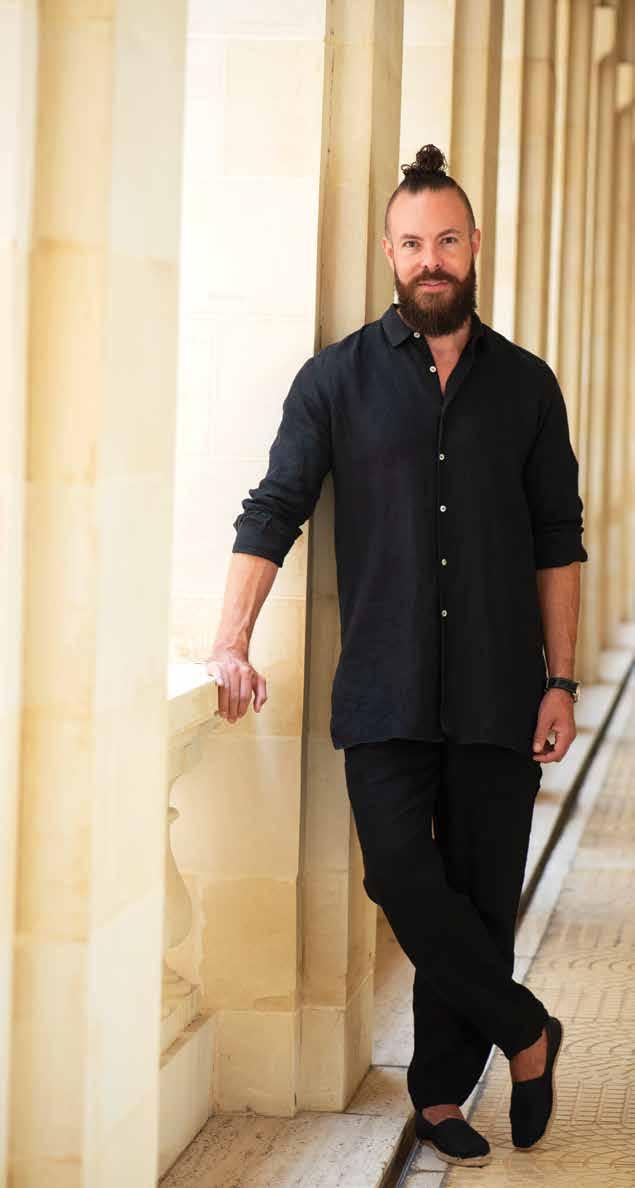
INTERVIEW 2023 EDITION
038
It has been a busy year for PressEnter Group, a year which has seen the gaming specialist company elbow its way into occupying more territory among the big gaming players. PressEnter Group, in fact, has grown significantly in terms of sales and physical office space, and is now looking at some exciting overseas prospects.

However, it is evident that at the top of the company’s priorities is ensuring the best complement of individuals to fill the ever-growing number of openings generated by the company’s growth. Mr Merzoug is proud to position PressEnter as a leading employer of choice, which attracts the very best professionals, who have the vision to take the company to the next level.
“Shaping the future of the online gambling industry requires a team of passionate, dedicated and skilled experts and specialists, and that is why PressEnter Group has continued to onboard new talent over the past 12 months,” Mr Merzoug says.
“In the past year, we have made key senior hires including the appointments of Hampus Eriksson as Chief Product Officer, Qurban Hussain as Chief Financial Officer, Terese Thagaard as Chief Legal Officer, Daniela Speranza as Director of Compliance, David Plumi as Commercial Director for LatAm and Nicolas Renaux as Head of Strategy and Business Development.” >
039 2023 EDITION INTERVIEW
“WE OPERATE ON A FOUNDATION OF TRANSPARENCY, CAMARADERIE AND MENTORSHIP, WHILE OFFERING A HUGE RANGE OF PERKS.”
“Talent attracts success, and success attracts talent. PressEnter Group has enjoyed huge success over the past few years – between 2020 and 2021, our profits tripled and our workforce quadrupled. The group then doubled its workforce again between 2021 and 2022,” Mr Merzoug explains.
“Make no mistake, PressEnter Group is a place for ambitious online gambling specialists. We provide an entrepreneurial environment where individuals are encouraged to push boundaries and achieve their full potential within a sizable, stable company structure and culture. We are lean and nimble while still being considered a key player. This makes us a unique company within the global online gambling industry which, combined with our people-first culture, allows us to attract the brightest minds and creative talents from across the sector,” he notes.
A key to this success is the company’s ability to maintain a strong and attractive company culture based on this people-first principle.
“The way we see it, it’s not just what we deliver but how we deliver it. We operate on a foundation of transparency, camaraderie and mentorship, while offering a huge range of perks. This includes a hybrid work model, mental well-being programme, twice-weekly breakfast, fully stocked kitchen, Friday social gathering on the terrace, stretching and deep-breathing sessions, private health insurance, and discounted gym memberships, as well as a birthday gift and cake. Our team members are the only resource better than our products, and we don’t let them forget it,” Mr Merzoug asserts.
PressEnter’s growth hasn’t been focused only around human resources though, as the company has, since June 2022, moved into new offices in Sliema.
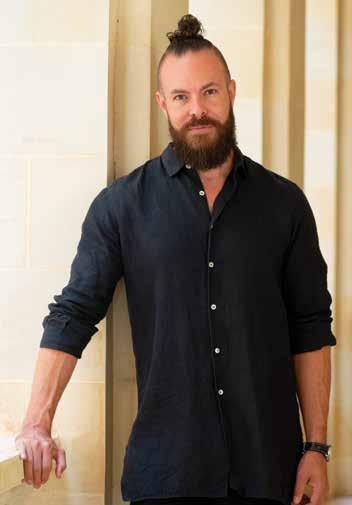
“To house our growing team, we took over six floors of a state-of-the-art building, commanding beautiful views of Valletta, which already feels like home. The space has been designed to provide an optimal working environment so that team members can achieve their full potential while also being able to take a break and switch off when they need to. Our new office was officially opened by Silvio Schembri, Minister for the Economy, EU Funds and Lands, with a special plaque unveiled to mark the momentous occasion,” Mr Merzoug proceeds.
PressEnter’s plans for growth reach much further; in fact one could say that they expand half-way around the globe to Latin America. “The appointment of David Plumi is a statement of intent for PressEnter Group’s plans for Latin America. He has been tasked with spearheading our drive into the market, and, so far, has overseen the launch of our Ultra Casino brand in Chile and Peru. We have already built significant momentum in both markets, with additional launches set for the coming months,” he expounds.
“Latin America is a vast region with so much untapped potential that it is a market that we simply could not ignore. It is great to see a growing number of countries now embracing legal, regulated online casino and sports betting, and we are in the process of applying for permits in the jurisdictions where we believe our brands will prove to be popular with players,” Mr Merzoug says.
PressEnter Group operates a portfolio of popular online gambling brands, and each has been designed and developed to deliver a superior player experience.
040 2023 EDITION INTERVIEW
“From the moment a player arrives at one of our brands, they are taken on a smooth and seamless onboarding journey with the aim to get them playing as quickly as possible,” Mr Merzoug explains.
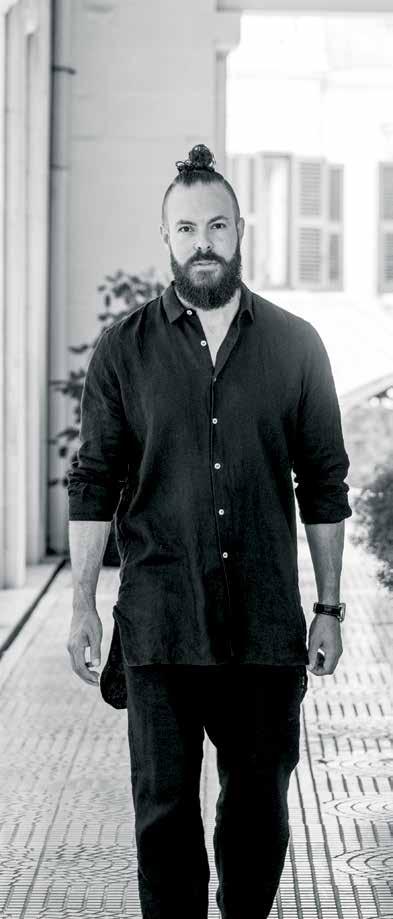
“Along the way, they can claim generous bonuses, choose from a wide range of localised payment options and chat with a member of our customer support team at any moment. Of course, once they have been onboarded, they can enjoy thousands of online casino games, access even more bonuses and be rewarded for their play and loyalty. Delivering a flawless player experience does not necessarily require cutting-edge innovation; it really comes down to getting the basics absolutely right, and that is something we have done.”
Asked about the recent rebranding exercise, Mr Merzoug is convinced that the new name and logo allowed the company to push forward on its mission to become a major online gambling operator.
“Our rebrand to PressEnter Group has given us a distinct identity that stands proud among other large-scale operators in the industry, to provide a clear, defined corporate brand which showcases our company culture. It has also allowed us to continue to onboard the best talent in the business,” he notes.
Looking ahead, Mr Merzoug is very optimistic about PressEnter’s prospects. “Our ultimate goal is to become a top-level online gambling operator, and over the next five years we will pursue that goal with more passion and determination than ever before. We have already made our debut in the highly competitive online sportsbook sector and obtained licences to operate in Romania and Ontario, Canada, which are important milestones for us. As the business grows its reach and product range, we will keep onboarding more specialists and experts while ensuring that we continue to celebrate and reward the phenomenal team that we already have in place,” the CEO concludes.
041 2023 EDITION INTERVIEW
“FROM THE MOMENT A PLAYER ARRIVES AT ONE OF OUR BRANDS, THEY ARE TAKEN ON A SMOOTH AND SEAMLESS ONBOARDING JOURNEY WITH THE AIM TO GET THEM PLAYING AS QUICKLY AS POSSIBLE.”
wider
PRESSURED POOL
CASTING A NET TO broaden talentMALTA’S
The pervasive issues surrounding the shortage of human resources on the island continue to loom – among them, the skills gap and a lack of experts for higher-level roles. Could remote working be the answer to recruiting from far and wide? Martina Bartolo Parnis speaks to the experts to find out about the good and bad in the world of recruitment for iGaming.
As the latest national census, which was published in August 2022, revealed, Malta’s population – which stands at 516,000 (nearly 100,000 over the population size measured in the last census carried out in 2011) – is ever growing. So, too, is the number of non-Maltese nationals living here; 11 years ago, the number stood at 20,289. Today Malta’s foreign population amounts to 115,449. However, despite the inflated numbers, the nationwide problem of human resources shortages persists – and the iGaming industry, alongside several others, is feeling the effects.
While the problem wasn’t caused by the pandemic, it certainly didn’t help. Hilda Rudbo, iGaming Manager at recruitment firm Boston Link, says that at the start, multiple industries were impacted significantly from
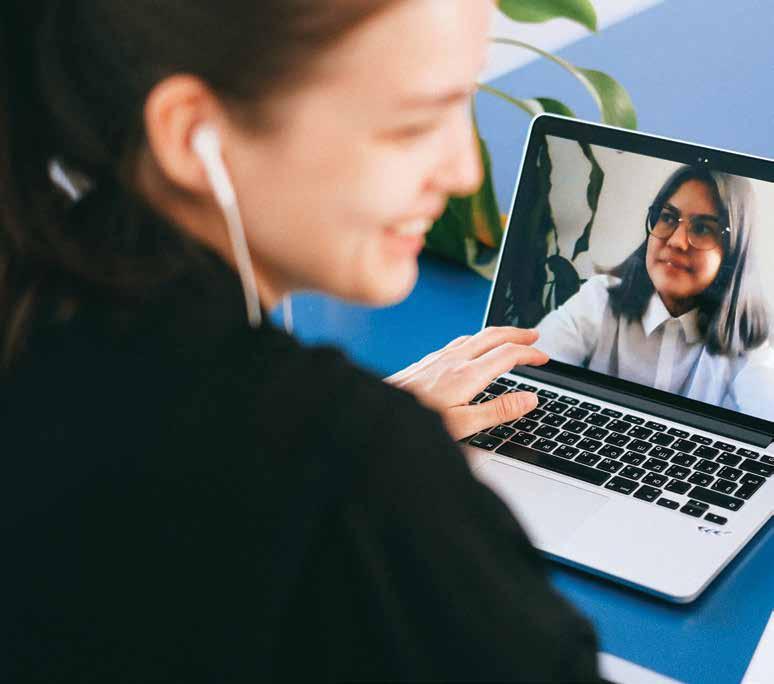
042 2023 EDITION FOCUS
markets, regulations are getting stricter and markets are changing drastically. As a recruiter, you need to be constantly on the ball. This is not due to the pandemic, but the industry in general.”
Melissa Tresoldi, Founder at Melody Recruitment & Consultancy, says that the pandemic posed several challenges, but the industry learnt valuable lessons from it too. “On one hand, finding key talent is harder than ever before, but on the other, it has created a societal and industry acceptance of remote working, which was not the norm before.”

“The bi-product of this means that companies can now spread their recruitment drives further afield, expanding the potential talent pool, mitigating the difficulties associated with fierce local competition,” she explains. “The greatest challenge has been for companies to adapt to this change, having teams spread out all over the world and having to manage that in a way that does not impact the day-to-day running of the business.”
Nikolai Livori, CEO at Kanon Gaming, is in agreement. With almost 15 years of experience, he asserts that the industry revolutionised the way offices operate, ushering in innovative set-ups that make work fun for employees. “Being a mostly online business, the possibility to work from home had always been there for gaming companies, but the pandemic pushed most online businesses towards remote working, at least during lockdown phases. The transition from office to remote was quite smooth, but recruitment was made harder, where you had to hire an employee you never really met in person.”
While Mr Livori personally feels that inoffice work is more productive, where some meetings and conversations simply don’t work as well behind a laptop camera, remote working has brought several advantages. “A company’s candidate pool is now much larger, and when mastered, it allows you to hire people who are not based in Malta, but rather in countries where there are more specialised resources.”
a human resources perspective, but the iGaming industry wasn’t the worst off. “Recruitment in general did take a dip after the first month or so, but with regards to iGaming, it was pretty much business as usual. We even started to see an increase in recruitment as many people worldwide had to stay home, which resulted in the online gambling industry booming more than ever.”
The boom in business pushed iGaming companies towards intense recruitment drives and becoming more flexible. “The biggest challenges we saw, and still see daily, relate to regulation,” says Ms Rudbo. “Due to online gambling being a tough industry to break into
On this note, the experts share their insight on the current status of recruitment and human resources within the industry, also in light of the many expats who left the country back in 2020. Indeed, information on the employment trends of non-Maltese nationals from Malta’s public employment service, JobsPlus, reveals a plateau in the arrival of foreign nationals between the end of 2019 and 2021.
Ms Rudbo says that getting people to move during the pandemic was extremely hard as, for many worldwide, the time wasn’t right. Uncertainty and unsafety made employees question what was most important to >
043 2023 EDITION FOCUS

them, however, interest in the iGaming industry was still there, which is where companies saw an opportunity, and adapted to allowing people to work remotely.
“iGaming is huge in Malta, people who want to work and build a career in the industry still want to move here, but it is becoming harder to recruit as time goes on,” Ms Rudbo explains. “Many people are considering moving to other cities in Europe where there are iGaming hubs, because Malta has become very expensive over the last few years. Rent and cost of living are too high for employees, especially juniors looking to start their career in iGaming. The industry and the island still attract people, but not as much as they used to five years ago.”
Ultimately, a company’s success at recruitment during challenging times all depends on what it offers, says Ms Rudbo. “If, as a business, your salaries are right for the market, you offer decent flexibility, with a healthy worklife balance, include perks and a development plan for your staff, ensuring they can see growth in their career, then it isn’t hard to attract and retain your employees. If a company allows remote working, it is great for the business because it is not limiting its talent pool, and so recruitment can be done nationwide.”

In Ms Tresoldi’s view, after the pandemic dented people’s plans to move abroad for work, she is now starting to see a return to “the old ways, with confidence returning and more people once again looking to travel and seek career opportunities abroad. That said, with the remote working world we now live in, working from home or from any offsite location is very popular and becoming an employee
expectation. This, in turn, leaves employers with a challenging choice of whether to offer remote working positions (or hybrid versions) or not, when previously, they may have preferred to only consider office-based positions for certain roles.”
In terms of recruitment, the HR consultant says that, at present, there is still a volume of open positions for recruitment teams to contend with. “As in the past, there may not always be the specialist talent available locally, but I believe with companies looking to hire both domestically and abroad, this should help them close these open positions,” says Ms Tresoldi.
Another consideration, she adds, is that the advantage for Maltese companies to offer remote working roles is not just confined to the gaming industry. “Meaning locallybased talent that would have previously been looking solely at domestic career opportunities, now have, for the first time, the possibility to cast their net wider too, and seek more attractive career prospects abroad while continuing to be based in Malta.”
As an employer, Mr Livori asserts that “Malta has a dry resource pool”, and iGaming companies require the same four resources as any other online business: tech, customer service, marketing and accounts. “As an employer, we have no choice but to invite expats for certain >
2023 EDITION FOCUS
“iGAMING IS HUGE IN MALTA, PEOPLE WHO WANT TO WORK AND BUILD A CAREER IN THE INDUSTRY STILL WANT TO MOVE HERE, BUT IT IS BECOMING HARDER TO RECRUIT AS TIME GOES ON.”
Hilda Rudbo, iGaming Manager, Boston Link
045
positions, because there are not enough Maltese who can fill them. Other roles, such as customer support, call for specific language requirements. The plateau in expat arrivals was of course linked to COVID-19 and travelling restrictions. We are now back to recruiting, or importing, resources from abroad.”
Mr Livori adds that Malta has all the ingredients – from warm weather to an English-speaking population – to attract foreigners to its shores and make relocating here a walk in the park. “However, all that glitters is not gold. Property rental prices keep increasing, the quality of living keeps deteriorating, and over-crowding is becoming an issue. Attracting people to the island is not difficult at all, but keeping them here is.”
Sharing his thoughts on the main HR issues currently afflicting the industry, the Kanon Gaming CEO says with certainty that it’s the quality of employees. He explains that, especially the larger companies begin to suffer from bloat, with around 80 per cent of the work being done by 20 per cent of the staff.
“There have been many acquisitions and public listings of iGaming companies, and most of them grow too fast
without the proper administration in place. This ‘bloat’ creates a large discrepancy between the productive employees and the rest,” says Mr Livori.
“As a result, large numbers of redundancies are made in an effort for the company to try to regain control of the business, and unfortunately, valid and good resources are laid off too.”
The subject of remote working continues to dominate HR discussions, and all three experts agree that flexibility is increasingly becoming a prerequisite for employees, many of whom seek to maintain a better work-life balance and value an increased level of trust, which results in a lower staff turnover. However, from the perspective of the employer, finding that balance isn’t necessarily easy.
“In the case of junior roles, such as customer service agents, employers might say that they are still new to the industry and unsure of the role, which could result in slacking or being less productive at home compared to the office,” says Boston Link’s Ms Rudbo.
“This also allows the employer to find out who the right employees for the company are.”
The Melody Recruitment Founder, meanwhile, says that while working from home offers the desired flexibility, some employees prefer to work exclusively from home, resulting in less face-to-face office interactions, both professional and social.
“Companies are being forced to find new and creative ways to keep their employees motivated and engaged, and ensure that vital working relationships between people and teams are not diminished in the process. What remains to be seen is the true effect of this culture change,” says Ms Tresoldi.
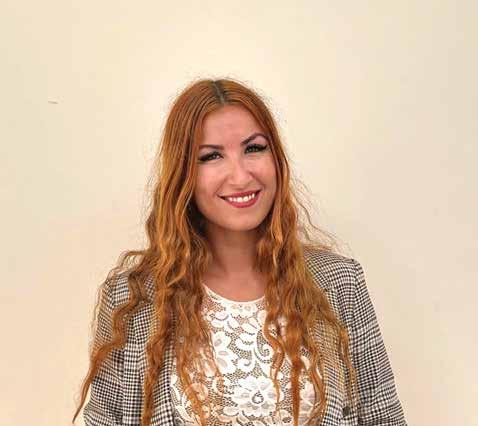
046 2023 EDITION FOCUS
“COMPANIES ARE BEING FORCED TO FIND NEW AND CREATIVE WAYS TO KEEP THEIR EMPLOYEES MOTIVATED AND ENGAGED, AND ENSURE THAT VITAL WORKING RELATIONSHIPS BETWEEN PEOPLE AND TEAMS ARE NOT DIMINISHED.”
Melissa Tresoldi, Founder, Melody Recruitment & Consultancy
>
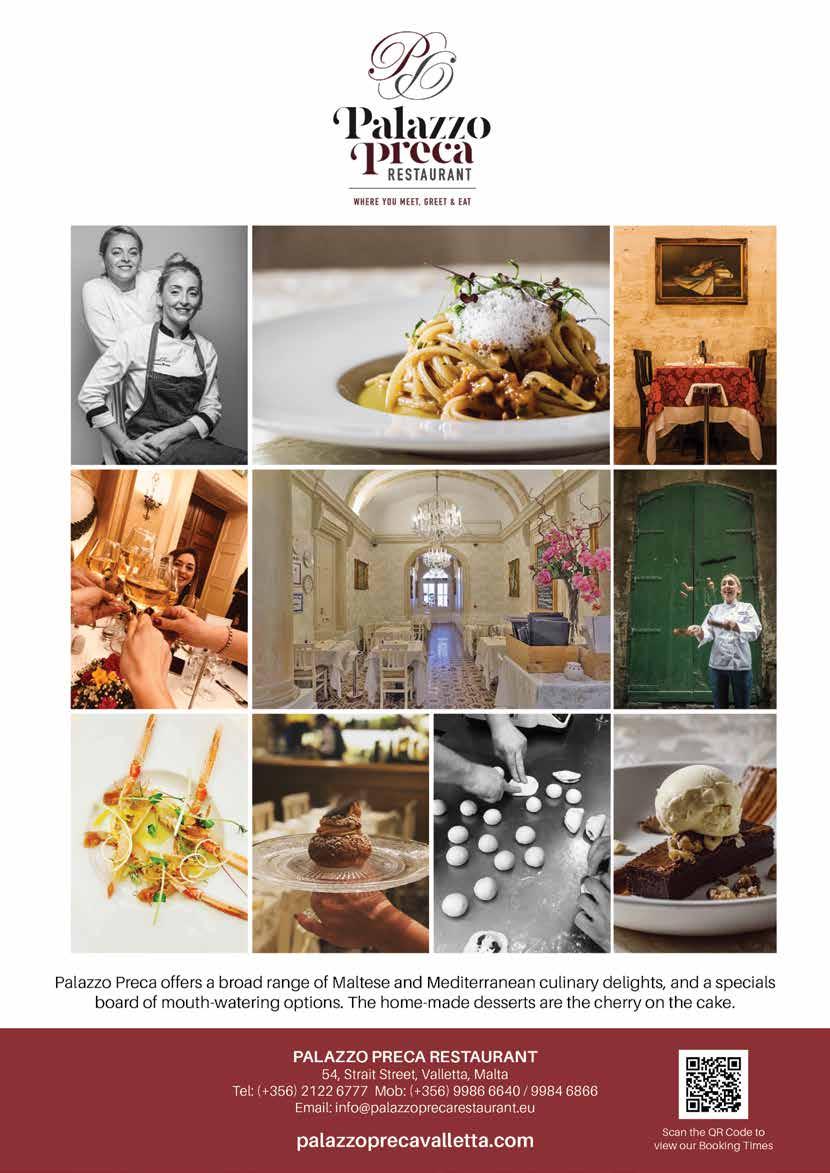
 Nikolai Livori, CEO, Kanon Gaming
Nikolai Livori, CEO, Kanon Gaming

In Mr Livori’s view, remote working could have risky far-reaching and long-term impacts. If 80 per cent of online companies switch to this model, he laments, within a few years, the need for iGaming companies to recruit locally will be gone. “Why would a company employ someone locally to work from home, instead of consulting with experts abroad?”
The CEO explains, “say we need to hire a large team of developers. There is already a shortage in Malta, but by hiring a team here, you could reap the benefits of them working together in an office. If, however, the team works remotely, why even open an office in Malta at all? It would be more cost-effective to open an office in the Baltics and hire a team there instead.”
Looking ahead to 2023 and the issues expected to dominate HR discussions, Ms Rudbo points again towards tough regulations that are only getting tougher with time. “I believe we will continue to see an increase in legal and compliance roles, as well as business development positions, to work alongside and push for market integration.”
Ms Tresoldi asserts the positive changes that came about over the last few years will continue to be leveraged and built upon by companies – flexible work conditions will continue being offered, along with new and innovative ways to harness employees’ potential and retaining them for the long term.
“Where previously, companies could rely upon their staff benefiting from shiny new offices with free coffee and snacks along with the odd competitive game of table tennis to bring their employees together, to forge effective working and social relationships, share ideas, handle conflict and have fun, to enhance staff satisfaction, retention and a buy-in to long term strategic goals, the question is how will they replicate those conditions and meet new challenges in the future, if the majority of their employees are working behind laptops from the comfort of their own homes,” Ms Tresoldi concludes.
In 2023, Mr Livori believes that companies that allow remote working will become more efficient from the perspective of policies and procedures, therefore many more remote or hybrid positions will become available. The fact that this opens up a global pool of resources, however, is a multi-faceted issue.
“If you’re an employee seeking a job in Malta, you’re not just competing with locally-based resources, but with applicants from around the world,” says Mr Livori. “From a business perspective, having a larger pool of resources cannot be considered an issue – if remote working is efficient for business, companies won’t need to relocate expats to the island, but rather employ them in their own country. Therefore, having a physical office will become a thing of the past, which will lead to less rental opportunities and fewer expats. Unless, of course, the hybrid model proves successful in the year to come.”
049 2023 EDITION FOCUS
“WHEN MASTERED, [REMOTE WORKING] ALLOWS YOU TO HIRE PEOPLE WHO ARE NOT BASED IN MALTA, BUT RATHER IN COUNTRIES WHERE THERE ARE MORE SPECIALISED RESOURCES.”
success, A CELEBRATION OF great ANDgrowth ASPIRATIONS
Throughout its 10-year history, 2022 will be the year that everyone who forms part of Team Leo will likely remember as a momentous one for the company, with so much achieved, and so much more to come. Martina Bartolo Parnis catches up with Stefania Curmi, Head of HR South at LeoVegas, to find out all about it.
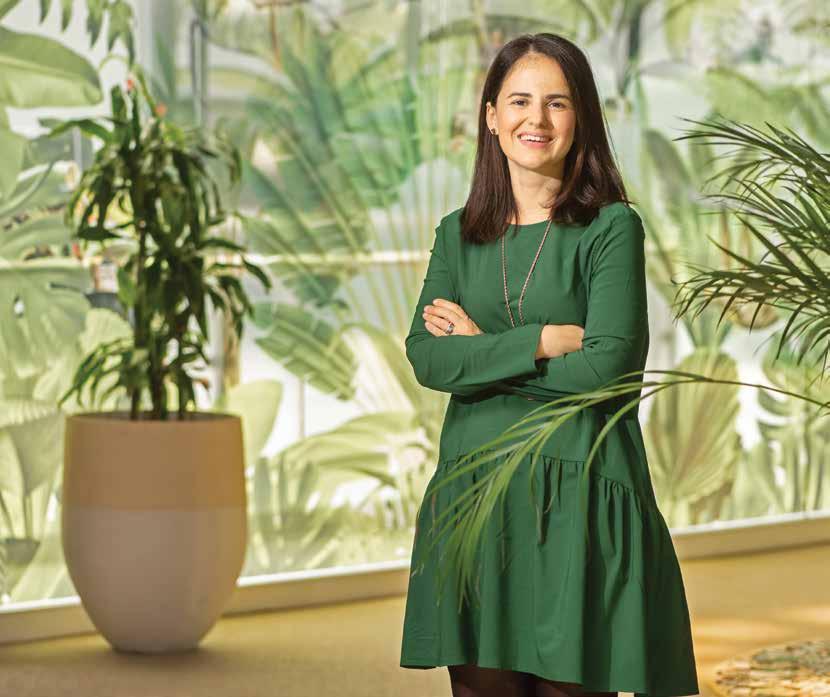
2023 EDITION INTERVIEW
Photo by Alan Carville
050
2022 is the year that iGaming mega brand, LeoVegas, won’t be forgetting in a hurry. Not only is it the year in which it signed and sealed its further global expansion through its acquisition by US-based hospitality and entertainment mammoth, MGM Resorts, but also the year in which it marked a significant anniversary of its own that’s certainly worth celebrating: 10 years since its launch.
In September, hundreds of LeoVegas employees from Sweden, the UK, the Netherlands, Poland, Italy, and the US, descended upon the island for three days of motivating presentations, networking, and lots of fun at the company’s Summer Summit, aptly titled Leo Festa. Among the eminent guests in attendance was Minister for the Economy, European Funds and Lands, Silvio Schembri, who opened the conference and welcomed participants to the island.
The company’s 10-year anniversary is a milestone the entire LeoVegas team is proud of. Stefania Curmi, Head of HR South, says the company started off with just a handful of people with a clear vision, and while the number of people has since increased significantly – 1,000 employees worldwide and counting – the vision has remained clear: to provide the very best experience to its customers.
“This journey signifies to our people that with hard work, determination and positivity, they can achieve great things. It’s encouraging to see that, despite our massive growth, we have not lost our enthusiasm and entrepreneurial spirit.”
Back in 2012, CEO Gustaf Hagman and a few fellow friends were trying to go live with a new, mobilefocused online casino website from an apartment

in Stockholm, which would soon take the iGaming market by storm. Over the past 10 years, the company has come a long way and matured significantly, says Ms Curmi. “We see this in all areas of the business, including our company culture, upskilling of our talent, compliance, and safer gambling.”
“The Malta office has been essential to the company’s success. The first few employees in Malta occupied a small area in the Plaza Shopping Centre, however, if you visit our offices today, you will see a massive difference,” she explains, adding there are now almost 600 employees over five large office floors. “The office is dynamic – visitors always comment on the energetic vibe, and although we offer hybrid working options, the office is definitely a fun place to be.”
With such a strong presence on the island, LeoVegas has established itself as a local household name and better still, Ms Curmi says it is well known for being an employer of choice. “I’m proud to say that we have just won the ‘Employer of the Year’ award at the 2022 iGaming Idol awards. These are exciting times.”
Sharing highlights from the summit, which she describes as “an absolute blast”, Ms Curmi asserts that “the global office team and communications team did a great job of organising a three-day event, with over 900 people under one roof.” >
051 2023 EDITION INTERVIEW
“THIS JOURNEY SIGNIFIES TO OUR PEOPLE THAT WITH HARD WORK, DETERMINATION AND POSITIVITY, THEY CAN ACHIEVE GREAT THINGS.”
“The event included an inspirational conference, various social activities, tours of Malta and so much more, in line with the theme, Leo Festa, which is a tribute to the traditions of Malta. We welcomed some special guests too – including Walter Zenga, former goalkeeper for the Italian national football team and Inter Milan. Football lies close to our heart, and we have partnerships with three top-tier football teams: Inter Milan, Atalanta, and Manchester City.”
The summit, which was held in St Julian’s, was a long-awaited and excellent opportunity for employees from various offices to meet and mingle in large groups for the first time since the COVID-19 pandemic – “so the excitement was heightened, as some people hadn’t met in person for a while. Nothing beats face-to-face interaction, and the summit was a great forum for collaboration, team-building and networking. Our people had the opportunity to really understand our upcoming plans and the opportunities that lie ahead for them. The energy felt by the end of the summit was indescribable – Team Leo is ready for the next 10 years.”
Forming part of the celebrations is the company’s other major milestone and beginning of its new chapter with MGM Resorts. This follows the US-based group’s public bid on LeoVegas in May 2022, for $606 million. By the end of August, MGM had acquired 96 per cent of the shares, bringing it one step closer to completing its acquisition of LeoVegas, which went on to apply for a delisting from Nasdaq Stockholm.

Under the broad wing of MGM Resorts, the mobile-first gaming company is seeking to expand its global presence and accelerate its digital growth by leveraging on the experience and expertise of the entertainment conglomerate.

052 2023 EDITION INTERVIEW
“THE ENERGY FELT BY THE END OF THE SUMMIT WAS INDESCRIBABLE – TEAM LEO IS READY FOR THE NEXT 10 YEARS.”
CEO Gustaf Hagman & Economy Minister Silvio Schembri at the LeoVegas Summer Summit marking 10 years since the company’s launch
Ms Curmi asserts that joining the MGM mega brand is an exciting next chapter in the company’s story. “Their culture and ours fit together really well. This will open many doors for us as a company, and in turn, it will provide our people with new opportunities to grow and develop. We have already seen great support shown by MGM towards LeoVegas, and we cannot wait to see what we can achieve together.”

With all that came to pass for the company in 2022, it’s fair to say that 2023 is well and truly looking exciting. “We have a good feeling that 2023 will be our biggest year yet! In collaboration with MGM, we have ambitious plans to grow our business, diversify our talent pool, and invest in our people’s development and well-being, all whilst upholding our culture and values. It has never been a better time to be part of the team at LeoVegas.”
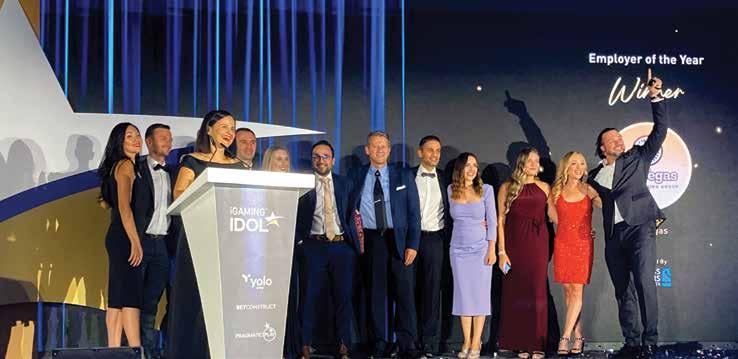
“WE HAVE ALREADY SEEN GREAT SUPPORT SHOWN BY MGM TOWARDS LEOVEGAS, AND WE CANNOT WAIT TO SEE WHAT WE CAN ACHIEVE TOGETHER.”
iGaming Idol Awards: LeoVegas won the Employer of the Year award
2023 EDITION INTERVIEW
053
pitfalls 360 FEEDBACK out
YOU SHOULD WATCH FOR
There has been a rise in the popularity of 360 Feedback Programmes, and rightly so – they’re an incredible development tool. Through a series of questions, you receive anonymous, actionable feedback from managers and peers, and direct reports which you’ll find extremely handy for performance improvement and professional growth. However, if implemented hastily or in an incomplete manner, it could also invoke hurtful or angry feelings among colleagues. Our advice? Keep an eye out for these common 360 Feedback pitfalls.

SUBJECTIVE SELF-REFLECTIONS
For a 360 Feedback Programme to truly work, it first requires a self-assessment questionnaire. Keeping an objective perspective on these can be difficult sometimes. Subjectivity will bleed in if you leave it entirely up to HR to write both the self-assessment and the 360 survey while also participating in the programme. If they know all the questions, how can they be objective?
Additionally, depending on how these questions are presented, those who want the most out of the programme may end up being too self-critical, while others may be too self-aggrandising in their answers.
Using external tools such as Hogan Assessments or CliftonStrengths will result in an objective self-report by answering questions that are specifically designed to

054 2023 EDITION
pull out strengths and development areas. These will also help you avoid the repetition trap. Given that an individual might be asked to participate in their peer’s 360 survey, it is quite important that these two are different from each other to maintain objectivity.
RUNNING 360 AS A ONE-TIME OCCURRENCE
If a football coach were to give their team feedback only once per season, it is highly unlikely they would be promoted to the next division. Yet, this is how many teams are managed. The future of business progression lies with real-time feedback.
In a real-time feedback approach, teams are kept up-to-date on their productivity levels, managers are less overwhelmed, and employees are facilitated with guidance that boosts their growth.
However, businesses are still opting for a once-ayear 360 Feedback (or worse, a traditional annual review to rate performance) instead of encouraging a feedback culture among all employees.
A real-time 360 set-up opens its survey at the beginning of the year. At any point, individuals can request feedback from their managers, peers or direct reports. Let’s say you’ve been working on a significant task with your colleagues. Instead of waiting till a particular point in the year to ask for their feedback, you can do so immediately after completion. This ensures accurate, focused and meaningful feedback.
Additionally, individuals can pull their report at any time. Why wait for next year to work on improvement and growth? With a real-time 360 framework, they can see their cumulative focus areas and implement the suggested changes as soon as possible.
EMPLOYEES ARE NOT PREPARED TO RECEIVE FEEDBACK
Value comes from translating feedback into actionable steps. However, before throwing individuals into a Pandora’s box of feedback, consider the following.
Firstly, audit the survey reports and filter out any negative or harmful feedback which could deter the individual’s performance and experience. Secondly, give an overview of the report itself before sending it to them. This ensures that they are understanding what they are reading and avoid rushing into quick judgements.
It is important for individuals to understand that they do not need to agree with all of the feedback but they do need to understand why some people would give certain feedback. Whether it’s agreed feedback or perception feedback, they both carry powerful information. Individuals should be encouraged to focus on two or three main actions they can take to improve themselves in the next six to 12 months.
OUR ADVICE
When the 360 Feedback process is taken on by inhouse HR teams, they are very likely to encounter at least one of these pitfalls. On top of their regular responsibilities, they have to create the surveys, distribute them, collate and deliver results, and most importantly, develop their staff – which they may have limited training for.
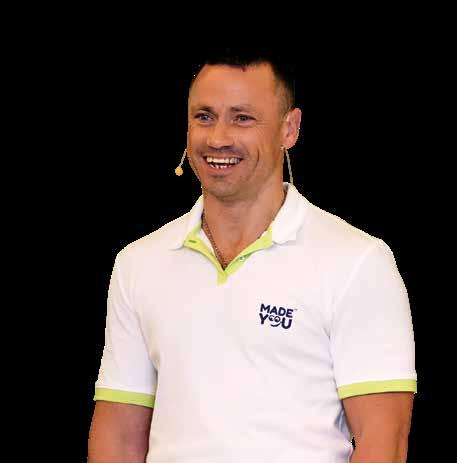
By entrusting the coaches at MadeYou, you alleviate all of these pressures off of your staff. Your MadeYou 360 coach will be responsible for creating, reviewing, aligning, auditing and crossreferencing the self-assessments and 360 surveys. They will help defuse any emotional responses by placing feedback within the context of their role, and above all, coach the individuals towards their next move for career development.
Start the year right and plan your 360 journey with MadeYou. For more information, contact hello@madeyou.eu or visit www.madeyou.eu.

2023 EDITION PEOPLE
TO THE
remote TAKING next level AND hybrid WORK
As businesses adapt further to the reality of remote and hybrid working, Arthur Azzopardi, Chief Officer at GO Business explains to Edward Bonello how GO CloudTalk enables teams to go on with their daily business easily, no matter the location.
2022 has proven to be the year of the great restart, as the COVID-19 pandemic gave way to a new energy, which companies are channelling into exciting, new projects. But the setbacks caused during the past 24 months were not all in vain, as many companies have learnt a thing or two about maximising their resources and running tighter, more efficient ships in the process.
A lot had to do with taking advantage of new tools such as video conferencing, which took the business world by storm. There is no doubt that these tools are not going anywhere anytime soon, as businesses have now understood the importance and advantages of remote and hybrid working.
As part of their continuous efforts to drive a digital Malta forward, GO Business has released a solution which will help businesses carry out remote and hybrid work more efficiently. “Remote and hybrid working have changed the way businesses operate,” says Arthur Azzopardi, Chief Officer at GO Business. “With remote and hybrid working arrangements here to stay, making sure your business has the right tools and setup is vital. With GO CloudTalk, employees will be able to conduct business on the go, from whatever location they are in.”
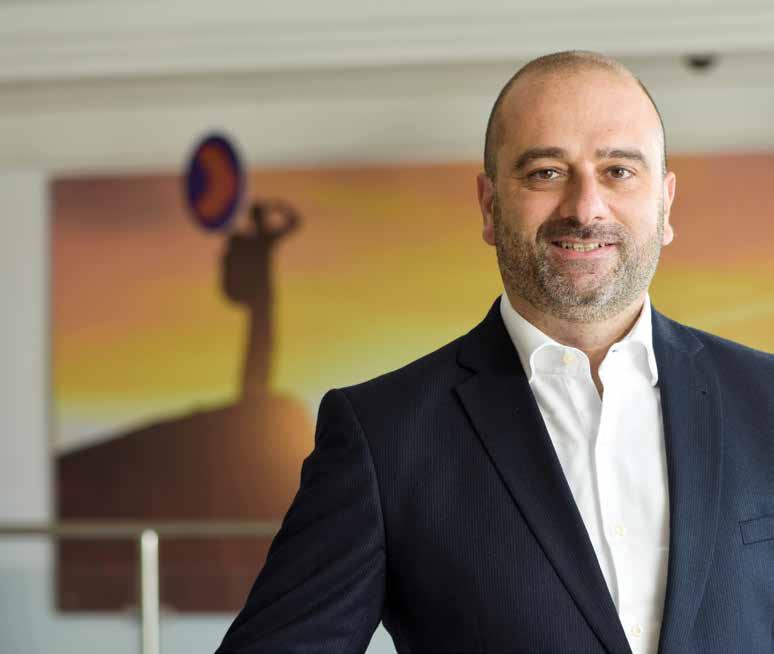
056 2023 EDITION COMMUNICATIONS
GO CloudTalk is guaranteed to keep hybrid and remote workers, as well as the data they exchange, safe.
“One of the major challenges faced by businesses when evaluating different solutions to facilitate remote work, is the time-old question of how to keep the data being exchanged secure. It’s no longer enough to have a strict on-premises security regime and assume that it will also work elsewhere. Businesses have come to understand the need for security across remote devices and networks as well,” Mr Azzopardi notes.
Remote and hybrid working policies in place are also crucial to protect employees and business. Clear guidelines ensure that teams are adhering to security measures, while implementing best practices for balancing working remotely with days in the office.

GO CloudTalk is a simple, unified communications product which is secure and provides a solution to several of the headaches businesses experience when dealing with hybrid work.

“A unified communications solution integrates all internal communication services such as messaging, voice and telephony, as well as team collaboration tools, in a secure way. This will certainly break down the siloes caused by dispersed teams and help organisations stay flexible,” Mr Azzopardi explains.
“One key feature of unified communication is that it allows team members to pick up calls coming into the fixed business line from a mobile device. Team members will be able to seamlessly transition between landline and mobile calls as needed. With seamless, integrated calling on landlines and mobile devices alike, teams will be able to connect in off-site or remote locations. Additionally, team members will be able to achieve the flexibility of mobile calls, without having to divulge their personal mobile numbers.” >
057 2023 EDITION COMMUNICATIONS
“WITH REMOTE AND HYBRID WORKING ARRANGEMENTS HERE TO STAY, MAKING SURE YOUR BUSINESS HAS THE RIGHT TOOLS AND SET-UP IS VITAL.”
Moreover, unlike on-premises tech, cloud-based solutions require no ongoing maintenance or servicing, and save businesses considerable capital expenditure on infrastructure. Thankfully, back-ups, redundancy, and the risk of equipment failure or downtime also become matters of the past.
“A cloud-based unified communications solution also allows businesses to fine-tune their tools as needed, adding new digital communication and collaboration functions. These may include instant messaging and call recording, as well as video and web


conferencing,” Mr Azzopardi continues. A unified communications solution such as GO CloudTalk, provides the remedy to all of these challenges in one consolidated solution.
“GO CloudTalk is compatible with a ‘bring your own device’ approach (BYOD), which will automatically cut down on upfront equipment costs, as it is compatible with existing employees’ computers, tablets, and smartphones. GO CloudTalk also allows businesses to set policies for their communications protocols. Companies can set a single office number that all or selected employees can answer, alongside individual
058 2023 EDITION COMMUNICATIONS
“IT’S NO LONGER ENOUGH TO HAVE A STRICT ON-PREMISES SECURITY REGIME AND ASSUME THAT IT WILL ALSO WORK ELSEWHERE. BUSINESSES HAVE COME TO UNDERSTAND THE NEED FOR SECURITY ACROSS REMOTE DEVICES AND NETWORKS AS WELL.”
numbers for each employee. It even comes with full answerphone capabilities,” Mr Azzopardi expounds.
This will not impinge on the team’s work-life balance though, as GO CloudTalk can be set in a way that guarantees that employees will not be disturbed outside of working hours.
“Over the years we have grown together with Malta’s businesses, providing them with the solutions needed to face the digital challenges of the day –this is no exception,” the Chief Officer at GO Business claims. “Our experts remain ready to help businesses get set up, and receive all the necessary support to help them get better every day,” Mr Azzopardi concludes.

059 COMMUNICATIONS 2023 EDITION
“A CLOUD-BASED UNIFIED COMMUNICATIONS SOLUTION ALSO ALLOWS BUSINESSES TO FINE-TUNE THEIR TOOLS AS NEEDED, ADDING NEW DIGITAL COMMUNICATION AND COLLABORATION FUNCTIONS.”
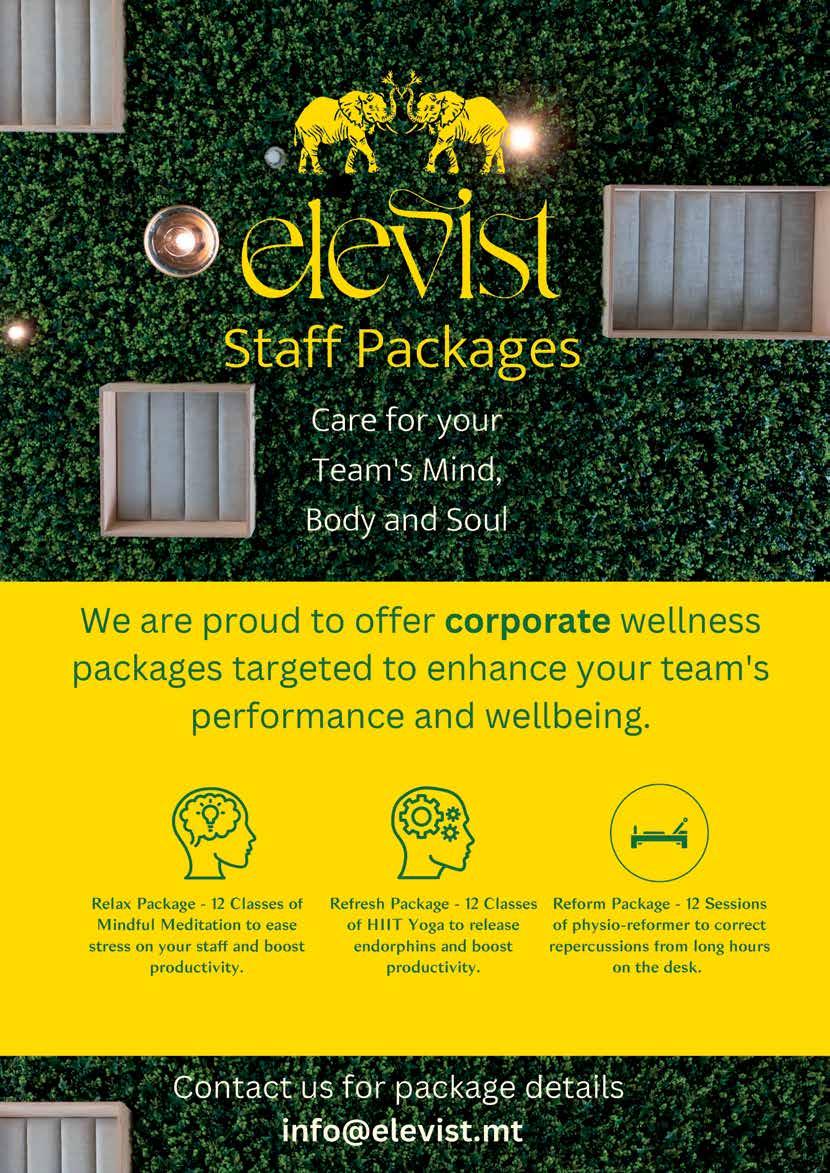
061 2023 EDITION KNOW Malta in numbers POPULATION 516,000 at end 2021 TIME GMT +1 INTERNATIONAL DIALLING CODE +356 AREA 316 KM² AVERAGE YEARLY TEMPERATURE 27OC GAMING IN NUMBERS COMPANIES LICENSED BY MALTA GAMING AUTHORITY 341 at end 2021 TOTAL NUMBER OF GAMING LICENCES ISSUED IN 2021 46 GROSS VALUE ADDED GENERATED BY THE GAMING INDUSTRY TO THE MALTESE ECONOMY IN 2021 €1,019 million – around 7.7 per cent of the economy FULL-TIME EMPLOYEES IN THE IGAMING SECTOR IN 2021 10,685 Sources: Malta Gaming Authority (MGA), National Statistics Office (NSO), Central Bank of Malta MALTA’S ECONOMY GDP GROWTH 14.7 per cent increase in second quarter 2022 compared to same quarter 2021 GOVERNMENT DEBT €8,559 million at the end of August 2022; an increase of €874.5 million from 2021 GOVERNMENT DEFICIT €359 million by the end of August 2022 ANNUAL RATE OF INFLATION 6.98 per cent in August 2022 GOVERNMENT RECURRENT REVENUE €3,623.9 million between January and August 2022; 12 per cent higher than that reported a year earlier
future ENGAGING THE
iGaming Capital catches up with Pedram Padidar, COO at Enteractive, to talk about recent successes, growing the company in the US, and the focus for 2023.
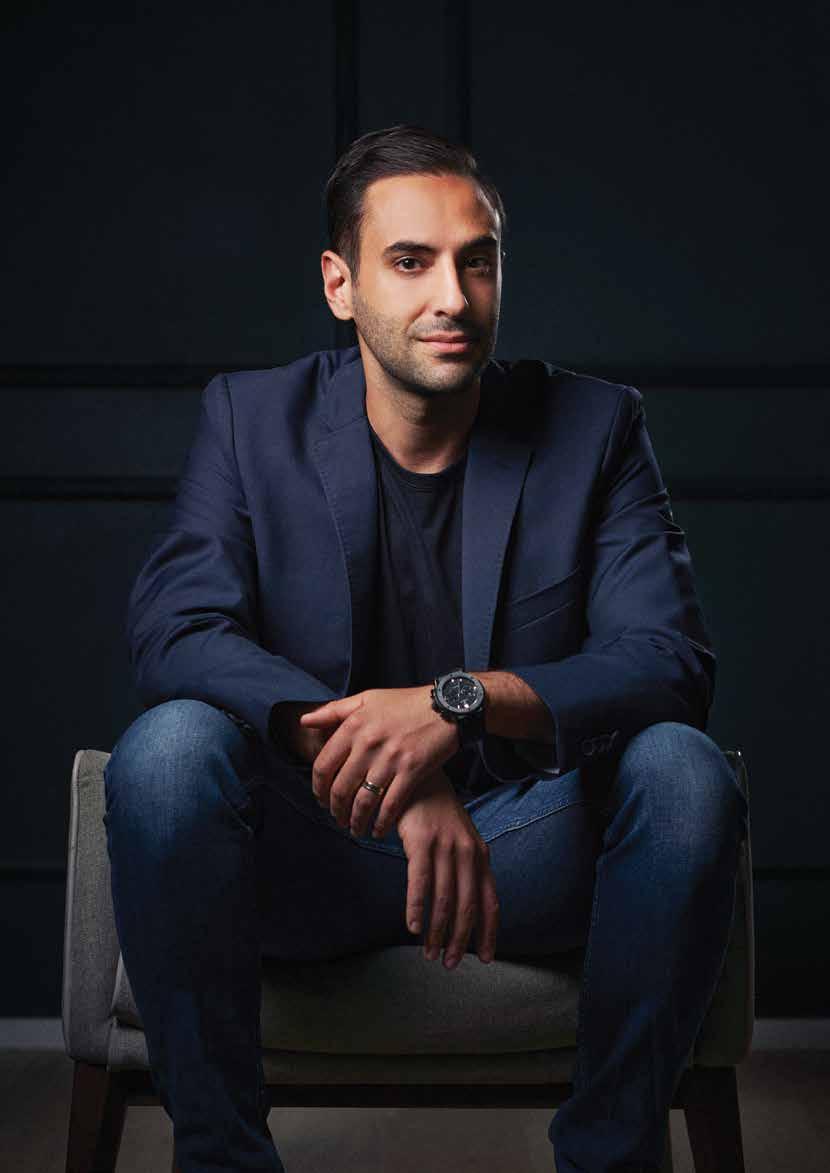
What have been the highlights for Enteractive in 2022?
I would say our global growth. We have managed to onboard new clients as well as enter new markets and open a new office. And, of course, the US is steadily growing also. It’s a huge market that we’ve been working towards for some time now, and we managed to launch it successfully and received great feedback from our clients, so now, it’s all about scaling further and fine-tuning our operations to the specific needs of the US operators and their customers.
What industry development has pleased you most? Conversely, which has surprised you the most?
One thing the industry has been doing is expanding that global footprint, opening up more markets and creating more opportunities for growth – Latam, Asia, the North American market obviously, with many more states being regulated in the US, as well as Canada, such as Ontario’s regulation. That’s been a pleasant surprise; how quickly regulation has developed across much of North America. The whole industry has become much more global.
062 2023 EDITION BUSINESS
Photos by Aleksey Leonov
What are the key trends that you are seeing within the industry through your interaction with clients and prospects?
We’re starting to see much more personalisation complementing globalisation across the industry, not just in terms of communication, but with suppliers coming out with slots, for example, that are more personalised, for different markets and different regions. That’s exciting to see, and it’s great for the future of the industry.
With such a focus on player engagement, would you say the iGaming industry has weathered the last few years well, and is it continuing to grow market share in the entertainment sector?
I think that as a result of the pandemic we saw most online businesses flourishing – it was a perfect scenario when people were at home. And, to some extent, if you look at Netflix as an example, the number of users has dropped since reaching their peak, and now there’s more competition from services such as Hulu and Apple TV. Since we see the iGaming industry being a part of the entertainment sector, and there is so much competition in terms of grabbing the end users’ share of attention, it’s a question of where you choose to spend your time.
But even with other events squeezing people’s wallets, like the energy crisis, inflation, and so on, I think history has shown us that the iGaming industry is usually not affected too negatively by social and economic downturns. It gives people an opportunity for both entertainment and excitement while at home. Entertainment will continue to exist – it is how you consume it that will be different.
At the end of the day, I believe that sports will continue to be very important to people, and we are very fortunate to represent some of the world’s best sports betting operators. That connection to sports gives us a lot of energy and joy, and I think that is reflected in our conversations with the players of today and tomorrow.
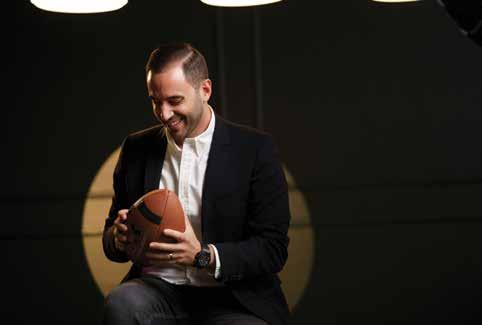
From Enteractive’s perspective, what is the ‘checklist’ that you recommend to your clients to increase retention and playing volumes?
It’s about looking at the individual – not all patterns are the same, not all offers are received the same, not everyone is looking for the same thing. The key will be to facilitate that unique experience and to provide the users with what they’re looking for, knowing your users so that you can provide that entertainment for
them immediately. This eliminates friction. There’s less reason to stray from a brand because you’re looking for something new, and they make that easy for you. So the users are happy to keep going back to the same place where they are comfortable and have everything they need.
How does Enteractive’s approach to personalisation differ from other CRM solutions?
The very high level of personalisation that Enteractive provides is being able to talk to the players and communicate with them on their terms, in their language, with native speakers. And to try to do that when it suits them, being available to answer any questions that might come up when they’re looking for that entertainment. Most of all, it’s about building relationships with players; it’s about having that connection.
But I wouldn’t necessarily say that it differs from other CRM solutions because at the end of the day, all CRM solutions are looking to achieve the exact same thing. We just have the capability and infrastructure to have agents reaching out, talking to players and building relationships with the ones that want to connect with
It’s not about ‘either/ or’. It’s about all the combined efforts that cover all possible bases and keep the players happy – that is when you
should we look out for from Enteractive and the industry in general for 2023?
I think one question is whether we’ll see more regulation coming in across various countries. With changing governments in European markets, is that going to mean changing regulations for gambling as well?
And then, similar to 2022, the industry’s global footprint will continue to expand in 2023. I think that will definitely continue – across the pond in the States, in Latam, and here in Europe, it will be about watching out for changes coming, rather than launching new markets.
For us at Enteractive, the big activity will be continuing our growth in the US, launching our office over there and building on the successes of 2022. But also developing even more opportunities in other markets where we’re already active – including Latam, Asia and Europe. We’re available for global operators, and we’re ready to grow.
063 2023 EDITION BUSINESS
SHAKING UP
payments
iGaming FOR solutions

CLIENTS
FinXP CEO Jens Podewski highlights the company’s latest steps in providing a reliable, practical alternative to traditional banking.
It has been an exciting year for FinXP. Since its establishment eight years ago, the company has built a solid reputation for providing clients in so-called high-risk industries with market-leading payment solutions that offer an alternative to traditional banks. Now, it is seeing demand for its signature products spiking, while bringing exciting new offerings to market.

For FinXP co-Founder and CEO Jens Podewski, it all comes back to an issue the iGaming sector knows all too well.
“iGaming operators continue to seriously struggle with their existing banking relationships,” he explains. “They have problems receiving settlements, clearing funds from their acquirer partners, and even processing the payments of winnings to their clients. For us, it’s a challenge but a positive one, because it’s an area where we can really step in and make a difference.”
Having himself gained experience in the sector before starting FinXP, Mr Podewski understands the challenges operators face,
064 2023 EDITION INTERVIEW
and the solutions they require, on a personal level. He is therefore pleased – but not surprised – that the demand for FinXP’s dedicated Euro IBAN accounts, IBAN4U, continues to grow, while discussions with major new strategic partners are taking place, bringing the company into greater focus. “There is strong interest not only in what we are doing but in the solutions we can offer,” he says. “We have already realised a number of tailormade solutions with our clients. Above all, we are listening to them.”
Meanwhile, FinXP’s product portfolio continues to grow with the development of multi-currency accounts – a growing necessity as businesses increasingly operate across borders – as well as with the XP White Debit Mastercard. “Our
experience has shown that there is a strong interest in the market; not just for a dedicated IBAN account, but for a way to actually spend the money,” Mr Podewski explains.
He describes the new product as part of a wider vision to further develop the IBAN4U offering. FinXP already offers a unique B2B2C solution for instant pay-outs, allowing iGaming operators to settle winnings with clients in a second using FinXP’s technical banking infrastructure. By linking players’ IBAN4U accounts to personalised debit cards, customers can use the funds in their accounts at ATMs, points of sale, online retailers –and of course, to place their next bet.
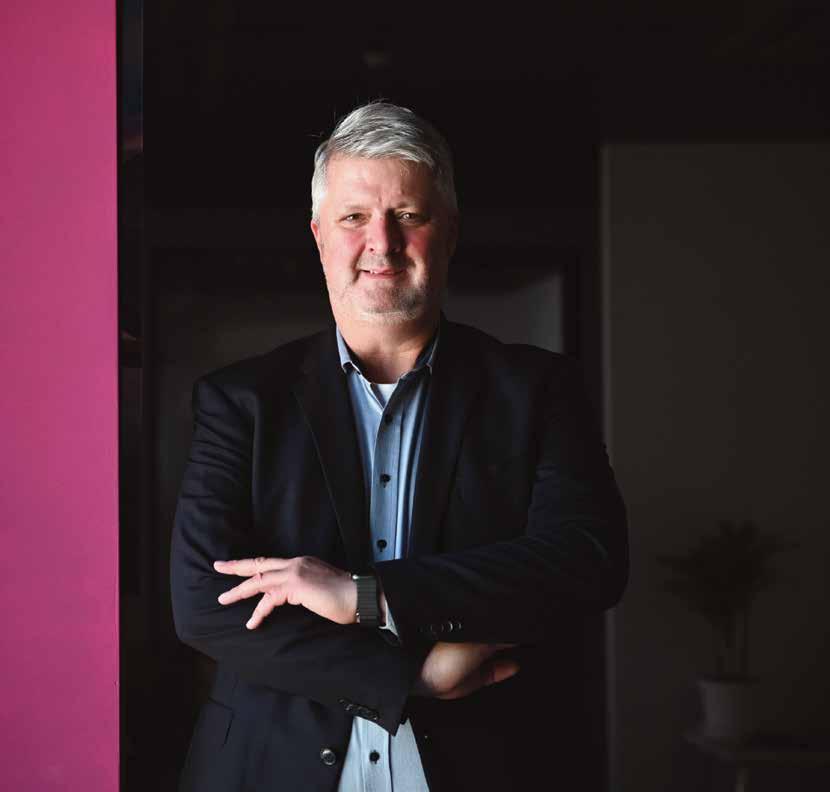
065 INTERVIEW 2023 EDITION
> “iGAMING OPERATORS CONTINUE TO SERIOUSLY STRUGGLE WITH THEIR EXISTING BANKING RELATIONSHIPS... FOR US, IT’S A CHALLENGE BUT A POSITIVE ONE, BECAUSE IT’S AN AREA WHERE WE CAN REALLY STEP IN AND MAKE A DIFFERENCE.”
“All this is possible because we are the issuer,” Mr Podewski says. “There’s no third party that the operator has to work with: it’s all FinXP. And of course, because we are the issuer, it also means we can guarantee that the card can be used for gaming transactions.”
The card also offers a practical solution for companies – and larger organisations in particular – looking to empower employees by making it easier for them to purchase services and products for the company.
Of course, for all the exciting developments of the last year, it has not been without its challenges. Mr Podewski says one of the biggest difficulties he has faced has been finding the right people to support the company’s growing operations. “It’s not easy to
find experts in the market, people who understand the business and go the extra mile, and who aren’t there just to check boxes,” he says. “Looking at our roadmap, we know well in advance what team members we need to add, but finding the right people quickly, remains difficult.”
Keeping up with changing compliance regulations has also been a challenge. “It feels like every week there is something new that you have to adjust to and deal with,” Mr Podewski says with a smile. “But the good news here is that we invested a lot in compliance to fulfil the requirements coming from the regulator. We had an external audit to ensure we meet our requirements 100 per cent, and it’s something we’re able to say we handled very well.”
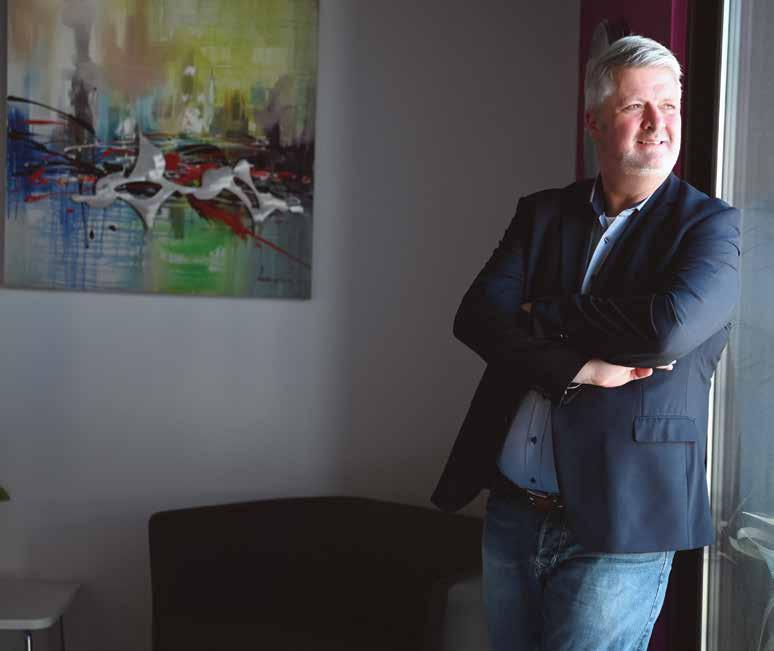
066 2023 EDITION INTERVIEW
Mr Podewski stresses the importance of keeping ahead of the ever-changing landscape in this regard. He highlights the positive development of Malta’s removal from the FATF grey list earlier this year, as well as the associated changes to the anti-money laundering (AML) rulebook.
Also foremost on his radar is the anticipated PSD3, the next evolution of the EU Payment Services Directive and Open Banking legislation. “It may be some way away, but it’s a major development and one we need to start taking stock of right away,” he says.
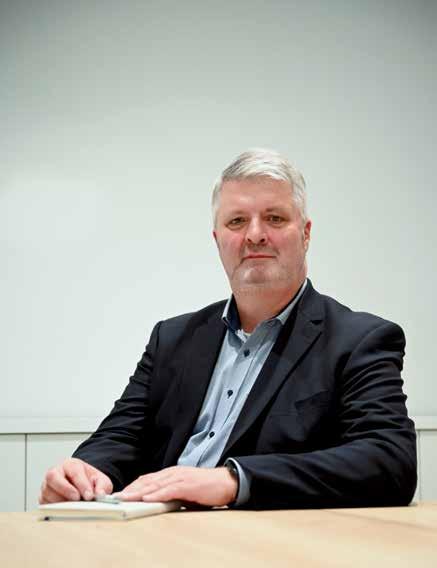
So what lies ahead for FinXP? Well, the company, Mr Podewski reveals, has signed a partnership with some of the
biggest players in the market to create a unique pay-out solution expected to be made available by the end of Q1 2023, and which will allow FinXP’s clients to settle payments worldwide whether by wire, bank transfer, card, mobile, or cash.
In the meantime, he is looking forward to further physical events and face-toface meetings now that the impact of the pandemic is much lower. “It’s all about our clients,” he concludes.
“Listening to them, providing tailormade solutions, and serving them as they know we have always done in the past.”
www.finxp.com

2023 EDITION INTERVIEW
“LOOKING AT OUR ROADMAP, WE KNOW WELL IN ADVANCE WHAT TEAM MEMBERS WE NEED TO ADD, BUT FINDING THE RIGHT PEOPLE QUICKLY, REMAINS DIFFICULT.” 067
AssistingGAMING COMPANIES legal TO NAVIGATE THE
AND bureaucratic
WILDERNESS
iGaming companies have a reliable partner in IGA Group, which is specialised in assisting them sort out all matters of licensing, compliance and internal auditing, so they can focus on what they do best. Head of Licensing Keith Seisun expands on the company’s extensive services offering with Edward Bonello
“G
aming industry operators are often focused on running the show, coming up with new and exciting products, attracting traffic, and growing their business. In fact, they often are left with little time to take care of other secondary yet crucial aspects of running their business,” claims Keith Seisun, Head of Licensing at IGA Group. “That is where we come in, bringing expertise and dedication, that can make a difference.”
Keith Seisun joined IGA Group in 2021, following three years with the Malta Gaming Authority as a Systems Auditor. After graduating from Goldsmith University in London with a Bachelor’s degree in Computing and Information Systems, he went on to graduate from the University of Derby with a Master’s degree in Business Administration.
IGA Group has been servicing companies operating in the iGaming sector in Malta since 2017 and specialises in assisting both start-up and large companies from their earliest stages.
“IGA Group boasts a wide portfolio of services, as it can assist gaming companies in a number of fields: from
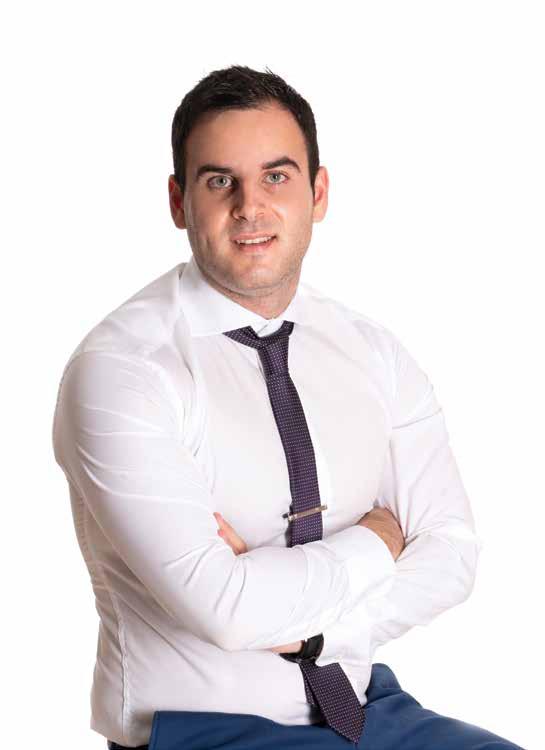
2023 EDITION LEGAL
068
Photo by Sean Azzopardi Photography
company formation, licensing from different jurisdictions and compliance, to internal auditing and guiding operators to maintain their business operation – our expertise can provide gaming companies with the peace of mind required to be able to operate smoothly and without hitches,” Mr Seisun explains.
The company, however, goes beyond assisting gaming companies in the preparation of documentation ahead of the due diligence processes. Once a licence is issued, an ongoing compliance process is kicked off and IGA Group is there to oversee all aspects of compliance, such as ascertaining that all policies and procedures are updated and are being followed throughout the company, ensuring that all technical set-ups are implemented and maintained, as well as submitting all required reporting to relevant authorities.
With regards to Internal Auditing, IGA Group is proficient in helping companies guarantee that all areas are maintained and being updated according to the businesses’ needs, and that reporting obligations are being adhered to.

“Obtaining the licence is only the first step in setting up and operating a properly regulated and fully compliant gaming operation,” Mr Seisun continues. “In order to achieve this, ensuring an ongoing compliance process is a must. All operators are different, and we make sure to understand the different needs of each, to provide them with a bespoke service that best suits their needs.”
“The same goes for whenever we are asked to assist with internal auditing. The industry is fastpaced and changes are a regular occurrence,” adds Mr Seisun. “We understand that companies might find it challenging to keep their house in order while keeping up with all the shifting scenarios. That is why we make it a point to provide an unbiased and objective view of the >
069 2023 EDITION LEGAL
situation at hand. Being independent from the operation, we evaluate and report to the highest level in the organisation, even providing solutions to certain issues that might need addressing.”
Good governance remains key, and it is only attained through rigorous internal auditing and compliance. IGA Group acts as a reliable outsourced service, which can provide the required guidance and assistance on several related matters with proper testing and implementation of set procedures.
“Often, companies put procedures in place, comfortable in the knowledge that they would work on paper, which however wouldn’t have been stress-tested in a reallife scenario. This exposes companies to unnecessary risk, as we often find out. Our technical knowledge of the iGaming sector enables us to analyse in the most minute detail the processes and procedures which would have been established, and find ways of improving them for the benefit of the client,” Mr Seisun expounds.
“From an operator’s perspective, it is imperative that internal procedures are in place and that everyone is on board with them. This also includes having a good technical infrastructure implemented, which would need to be maintained and well documented. Furthermore, it is also important for businesses to understand the value of implementing such set-ups. It is tempting to go for a box-ticking exercise which satisfies authorities – yet there is a lot more to be gained from having the proper structures in place that promote good governance,” he notes.
Mr Seisun adds that IGA Group also offers a host of services intended to support companies with their Anti-Money Laundering obligations, as part of their internal auditing obligations. “AML has grown in importance over the last years as authorities, local and international, are using a finer-tooth comb with all economic operators, no less operators in the iGaming industry.”
“At IGA, we have vast experience in helping companies to prepare for an FIAU (Financial Intelligence Analysis Unit) compliance review,

070 2023 EDITION LEGAL
“OBTAINING THE LICENCE IS ONLY THE FIRST STEP IN SETTING UP AND OPERATING A PROPERLY REGULATED AND FULLY COMPLIANT GAMING OPERATION.”
as well as with addressing any findings by recommending remedial action. We can also be present with representation during FIAU and MGA (Malta Gaming Authority) compliance reviews, preparation of a Business Risk Assessment and Customer Risk Assessment, due diligence, act as an MLRO (Money Laundering Reporting Officer) on behalf of companies, and any other related service.”
And all the hard work pays off, as in the last year, IGA Group has been awarded the SiGMA Best Gaming Consultancy award for 2021 and SiGMA Best Corporate Service Provider award for 2022. “The last few years have been tough, but we worked as a team and all our dedication has paid off. We are proud to receive this recognition as it encourages us to continue providing a sterling service to our clients in the iGaming industry, helping them reach their goals,” Mr Seisun concludes.

071 LEGAL 2023 EDITION
“THERE IS A LOT MORE TO BE GAINED FROM HAVING THE PROPER STRUCTURES IN PLACE THAT PROMOTE GOOD GOVERNANCE.”
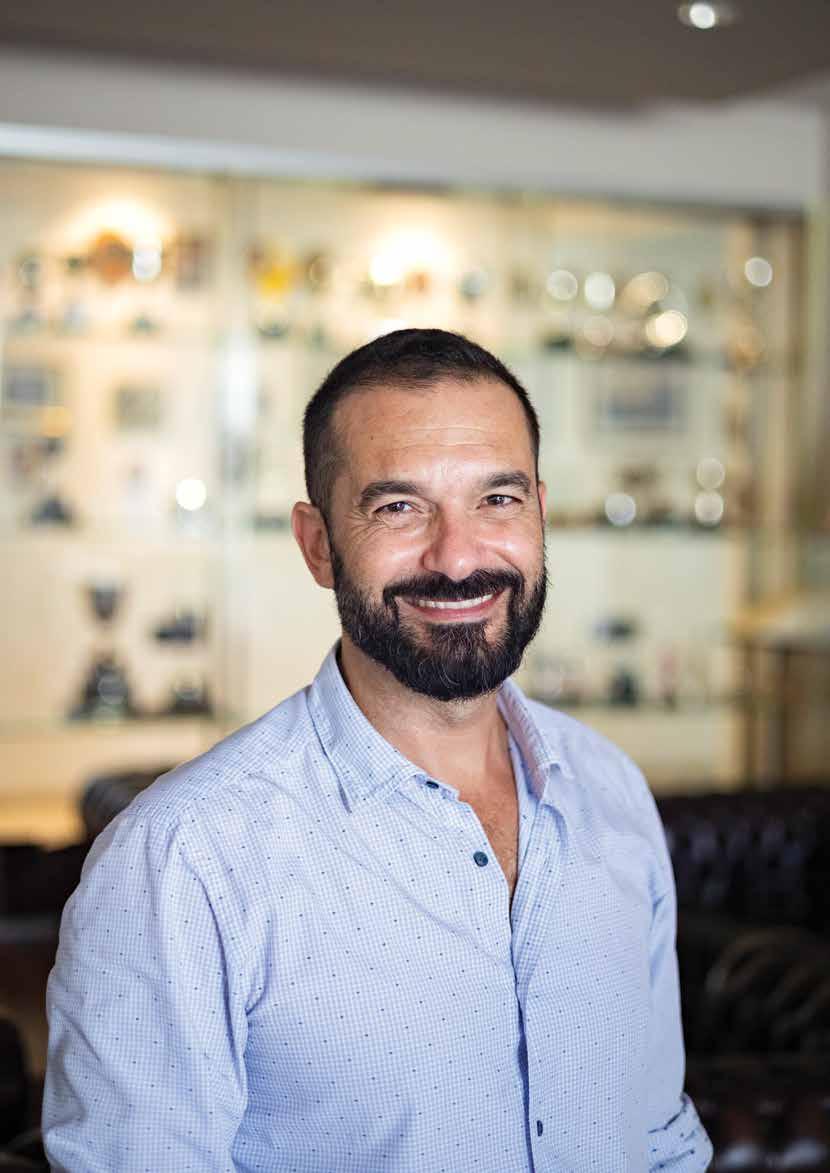
BUSINESS 2023 EDITION
Photo by Inigo Taylor
HOW TO IMPROVE better BUSINESSFOR decision-making IMPACT 072 “VISTAGE MALTA ACTS AS A SOUNDING BOARD FOR DECISION-MAKERS, THOUGHT LEADERS AND COMMUNITY ACTIVISTS SO THAT THEY CAN FOCUS ON WHAT IS MOST IMPORTANT: CREATING POSITIVE IMPACT.”
Vistage Malta Chair and Coach Julian Azzopardi – who is also CEO of the company’s franchise holder, UP Ltd – delves into the far-reaching ramifications that the decisions of top-level leaders can have on their companies, families and communities. He shares just how important better decisions are for driving positive impact and leaving behind a true legacy.
Spanning six continents and counting over 27,000 members, Vistage Malta is part of a global family with a universal mission: to support business owners, leaders and executives through the toughest challenges of their shared trajectory.
How does Vistage do it? By facilitating high-level – at times even difficult – conversations among C-suite employees from companies of all sizes.
Experienced business leaders chair confidential peer advisory groups and executive coaching sessions – a proven formula that gets members to talk through a variety of issues relevant to all present.

For his part, Julian leads both a Small Business Group and a Key Executives Group, where he says his role is to challenge, question and guide participants through some of their toughest issues and concerns.
This is why trust is at the heart of the work Vistage does. As Julian explains, becoming a confidant to leaders in critical moments of their careers sometimes requires digging deeper into certain issues through individual coaching sessions. This empowers them to get the help they need to take better, sometimes life-changing, decisions. The ultimate goal? To make sure that each member leaves the room in a better place than the one they came from.
“Vistage Malta acts as a sounding board for decision-makers, thought leaders and community activists so that they can focus on what is most important: creating positive impact,” Julian says.
‘CAREFRONTATION’
The trust that lays the foundation for sessions at Vistage is intended to extend far beyond coaching and into the fabric of members’ own work cultures. The healthy leader-team dynamic to strive for is one where both parties know beyond a doubt that they have each other’s back.
Unconditional trust allows for what Vistage describes as ‘carefrontational’ conversations between decisionmakers and their teams, where all involved can question, debate and disagree with care and respect for each other – all the while united in their mutual commitment to the organisation’s overarching objectives. This is what leads to greater accountability and commitment across the team, driving performance, morale and results in the process.
In Julian’s words, “trust will ultimately define your corporate culture and become a defining factor of what ‘working here’ really looks like and means.” In fact, he has often witnessed that the strongest performing companies are those where trust between the business owner, CEO and entire C-suite of decision-makers is unquestionable.
“Interestingly, conversations about difficult, conflicting issues – without hidden agendas, fear of backlash or resentment – are the conversations that need to be had the most, but are engaged in the least,” he says. >
073 2023 EDITION BUSINESS
A CULTURE OF SHARED OWNERSHIP
While some businesses may be tempted to believe that they must first reach a certain arbitrary standard – whether defined by income or otherwise – before they can create a culture of shared ownership, Julian makes an argument to the contrary.
He admits that standards of performance and behaviour do need to be set early on in a business’ lifecycle, as these are a reflection of the business leader and will determine the code of conduct that the business will operate from.

However, he asserts that scarce resources should serve as an incentive for business leaders to devolve more decision-making to their teams. Having clear and sound standards in place can make it easier for leaders to trust the individuals around them to take good decisions. With the same reasoning, a scarcity of personnel could be an opportunity for leaders to elevate their existing team to higher positions and share some of the responsibility.
Moreover, apart from identifying an organisation’s objectives and determining the standards that must be observed to get it there, leaders should also be able to articulate both the benefits of adhering to those standards as well as the consequences of failing to do so. Julian highlights studies in Flow research on how to improve focused concentration, which reveal that the deeper an individual’s understanding of the risk of underperforming, the more they are triggered to perform.
THE BIG PICTURE
Clearly, the people at the top are the ones who need to focus on a business’ bigger picture. But the reality for many is that they ‘don’t have time to think’ or are ‘too hands-on to plan strategically’ – claims that come up routinely in Julian’s sessions.
His advice is simple: “Leaders need to let go more.”
Whenever leaders stray from the bigger picture, they get caught up in the mundane, day-to-day chores, putting out fires and managing by crisis. This all comes down to the quality of the decisions they take.
“Sometimes, we are our own worst enemy. If I am constantly thinking of how I am going to get to the end of the day, I will never be able to plan for any eventuality that could seriously hurt my business.”
Vistage gives members the opportunity to think of where they want to go, and then reflect on how their current decisions or behaviours are holding them back from getting there quicker and with less pain. Quoting Einstein to underscore his point,
074 2023 EDITION BUSINESS
“THINKING CONSCIOUSLY ABOUT HOW TO IMPROVE VERSUS THINKING UNCONSCIOUSLY ABOUT HOW TO SURVIVE IS WHAT DIFFERENTIATES LEADERS FROM MANAGERS.”
Julian warns that: “The world as we have created it is a process of our thinking. It cannot be changed without changing our thinking.”
And that’s why Julian’s own mission is to bring Vistage to as many business leaders and executives as possible so they can fulfil their mission with greater impact and benefit their stakeholders, employees and communities. “My guarantee to all members is that they will join the largest global CEO-coaching and peer-support network of 27k+ leaders whose purpose is to look out for each other,” he says.
And Vistage is unlikely to be another stressor added to a CEO’s plate; quite the opposite. “A lot of what we recommend is about slowing down, which can have a massive impact on an organisation,” Julian continues. “Thinking consciously about how to improve versus thinking unconsciously about how to survive is what differentiates leaders from managers. In a fast-paced environment we need better thinkers to guide the doers, because if we’re not thinking, we’re not innovating.”
Since creativity requires purpose, leaders must intentionally carve out space to pause, think and focus so they can finally create.

BUILDING LEGACY
To Julian and all at Vistage, the kind of legacy you want to leave behind is one where no one knows you’re not around. This would mean that your lessons have been learnt – that your legacy is being lived. Perhaps nothing beats knowing that what you are doing today will leave the people who work with you and trust you better off. It is good to know you are adding value, whether to your employees, suppliers or customers.
“A business’ success is not measured by how many millions it makes, but by how much impact it delivers to those who are part of that business,” he says. “It doesn’t matter if you work for NASA or the corner detergent store.”
Vistage even claims to ‘help first-time CEOs make great decisions that benefit their companies, families, and communities’ – a ripple effect that, incredibly, comes from the top-level decisions of a single leader. Julian upholds this by saying that, in his own experience, if he cannot be the leader he is in the workplace, he would likewise find it very difficult to be the type of leader he needs to be for his family.
ON THE HORIZON
Excitingly, Vistage is in the process of launching the Vistage Emerging Leaders and Advancing Leaders Programmes, which offer executives in the fast lane towards promotion the opportunity to hold themselves accountable for their own self-development and lead boldly through difficult times.
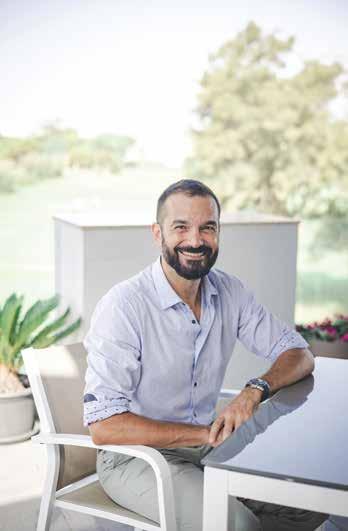
For more information about how joining Vistage could help your business, visit vistage.mt
Photo by Inigo Taylor
075 2023 EDITION BUSINESS
“A BUSINESS’ SUCCESS IS NOT MEASURED BY HOW MANY MILLIONS IT MAKES, BUT BY HOW MUCH IMPACT IT DELIVERS.”
Software AND
In this high-tech world, swift advances in software and Artificial Intelligence (AI) are changing the face of global industry – including iGaming. Here, three CEOs share how new technology is shaking up the industry today, and give their predictions on where tomorrow’s tech might take iGaming in the future.

2023 EDITION FOCUS 076
AI: WHAT’S next FOR iGaming?
Once the stuff of science fiction, AI has quickly become a daily reality. Movies have cast this faceless technology as both villain and hero, offering a cautionary tale and a vision of what could happen when you remove humans from the technological equation. Nevertheless, AI is shaping our future, in all walks of life and across industry.
In the world of iGaming, AI already plays an essential role. Software advances continually transform it, enabling gaming brands to record trends, patterns, and player behaviour traits, and use this data to evolve, upgrade, protect and compete.
>

2023 EDITION FOCUS 077
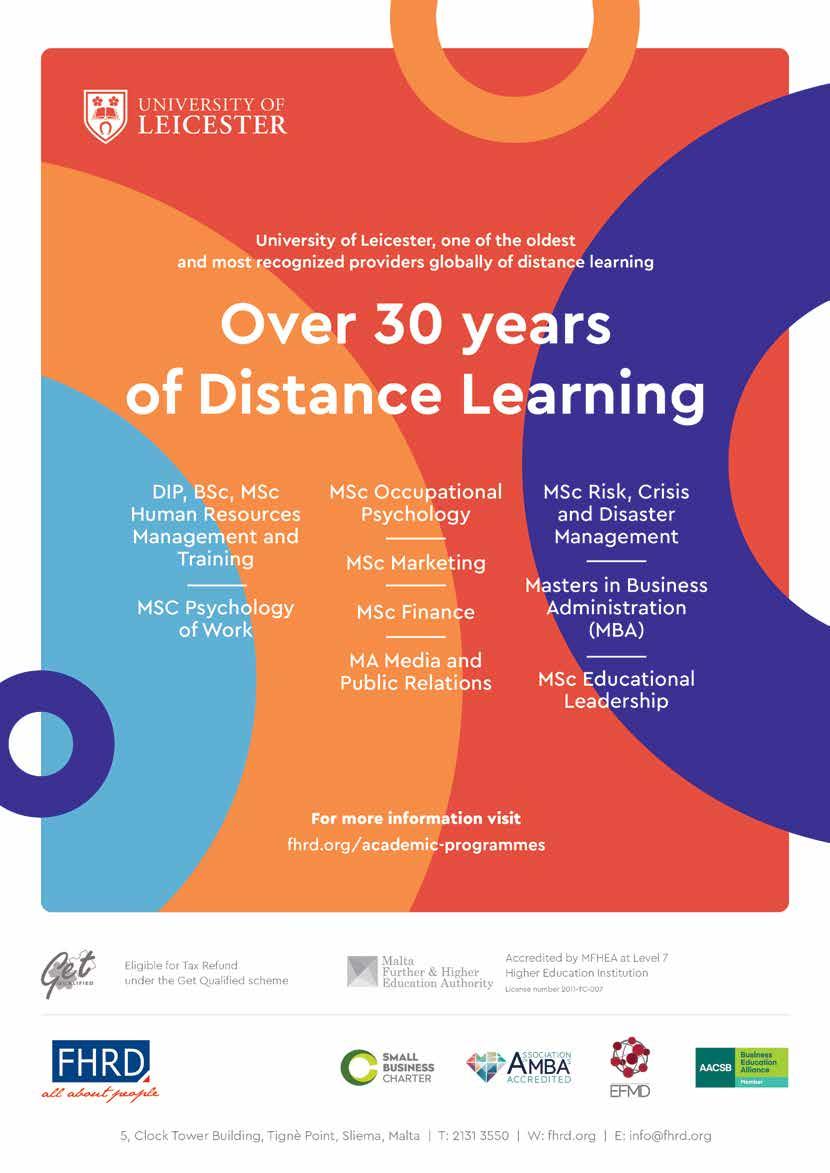
“The iGaming industry is one of many that collects information about players and games,” says Nikolai Livori, Founder and CEO of Maltaborn iGaming company, Kanon Gaming. “Advanced iGaming companies apply AI to analyse and predict player behaviour – spotting bad-habit patterns in compulsive gamblers for responsible gaming – as well as finding the right player for targeted marketing. A player enters the AI journey when they first become a customer and all information after that – such as logins, deposits, wagers, time on site and so on – builds a persona that can be utilised by the company.”
AI also supports operations, as Angelo Dalli, CEO and co-Founder at UMNAI, an AI solutions provider, points out. “iGaming uses AI for various tasks, including operational cost reduction, automated analysis of gaming transactions to extract marketing insights, basic customer support and, within risk management frameworks, limiting and identifying operational, and financial risks to the operator.”
Recent developments in AI have even supported the industry’s trajectory from a technical and regulatory standpoint, he highlights. “New forms of AI technology, which can explain the precise factors and decisions taken to arrive at an action, increase the trustworthiness of such systems in gaming and helping operators to meet compliance and regulatory requirements. Regulations have made it more difficult to match players with suitable bonus schemes, tournaments and marketing offers, so what used to be straightforward, is now complicated or based on less information.”
Gege Gatt, CEO at customer engagement automation company, EBO.ai, also recognises AI’s potential to meet regulatory requirements and help the industry match the everincreasing service expectations of players. “Regulatory compliance is an opportunity,” he says.
“The successful companies of tomorrow will be those most capable of building products that serve regulatory needs and create trustworthy solutions for players. Customers expect better service and a proactive, tailored player experience, while businesses must reduce costs
and constantly reposition their offering. AI is capable of processing language with astounding accuracy. Understanding different player intents and mapping these to a resolution pathway that does not require human intervention means businesses increase efficiency and serve a better player experience through an instant, 24/7, multilanguage, multi-channel automated service, in a safer, responsible-gaming environment.”
While AI advances have improved live casinos and betting – particularly within eSports, highlights Mr Livori – operators and players are still apprehensive.
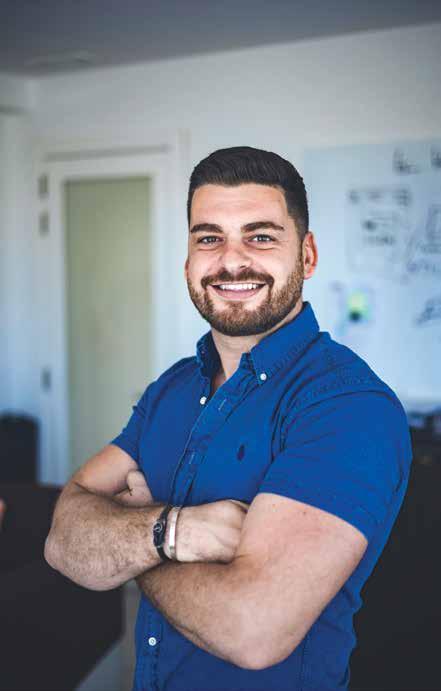
2023 EDITION FOCUS
“iGAMING IS IN CONSTANT GROWTH WORLDWIDE, AND ALWAYS WILL BE.”
Nikolai Livori, Founder and CEO, Kanon Gaming
079
Photo by Inigo Taylor
>
“Most operators tend to not give enough focus to their tech department, with some companies –unless a technical person leads them – oblivious of AI within the industry and its advantages,” he asserts. “Meanwhile, since AI advancement can create redundancies, it is an increasing area of concern for employees.”
“The key word here is trust,” continues Dr Gatt. “We rely on AI more and more, but it hasn’t yet earned the broad and universal confidence of all stakeholders. You don’t build trustworthy AI simply by making it better at pattern detection, but by seeking societal engagement through an ethical framework, as well as lawful, repeatable, ethical, explainable and robust processes.”
Indeed, a lack of trust in AI across iGaming may well prevent it from reaching its full potential. “AI creates a ‘black box’ model, which provides answers without explanation of the decision-
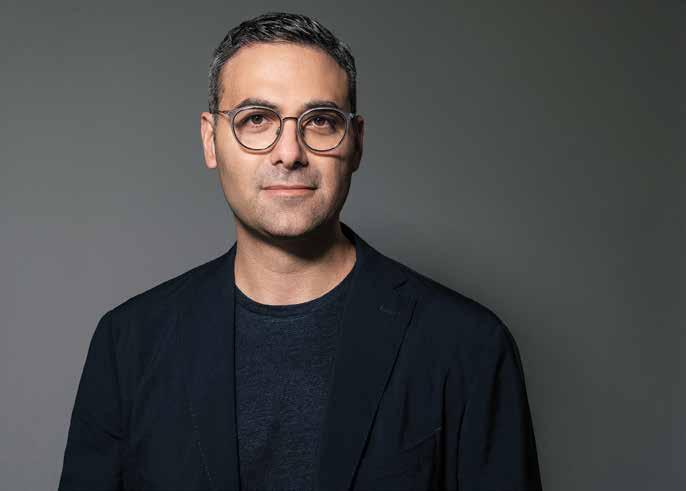
making process behind them,” explains Dr Dalli. “The lack of transparency makes it hard for operators, regulators, and players to trust such systems, especially when there are important impacts on financial performance or player privacy. The industry already feels the backlash against untrustworthy and opaque AI systems. Players that believe AI may have affected their outcome may challenge such systems – and the operators running them.”
And trust is not the only issue holding AI back. “As machines become less artificial and more intelligent, they will more closely resemble the way humans approach problems and tasks. The usefulness of AI will increase as it moves from narrow domain to decision-support, making AI relevant in scenarios that seemed unsuitable only months ago,” Dr Gatt predicts. >
080 2023 EDITION FOCUS
“WE RELY ON AI MORE AND MORE, BUT IT HASN’T YET EARNED THE BROAD AND UNIVERSAL CONFIDENCE OF ALL STAKEHOLDERS.”
Gege Gatt, CEO, EBO.ai
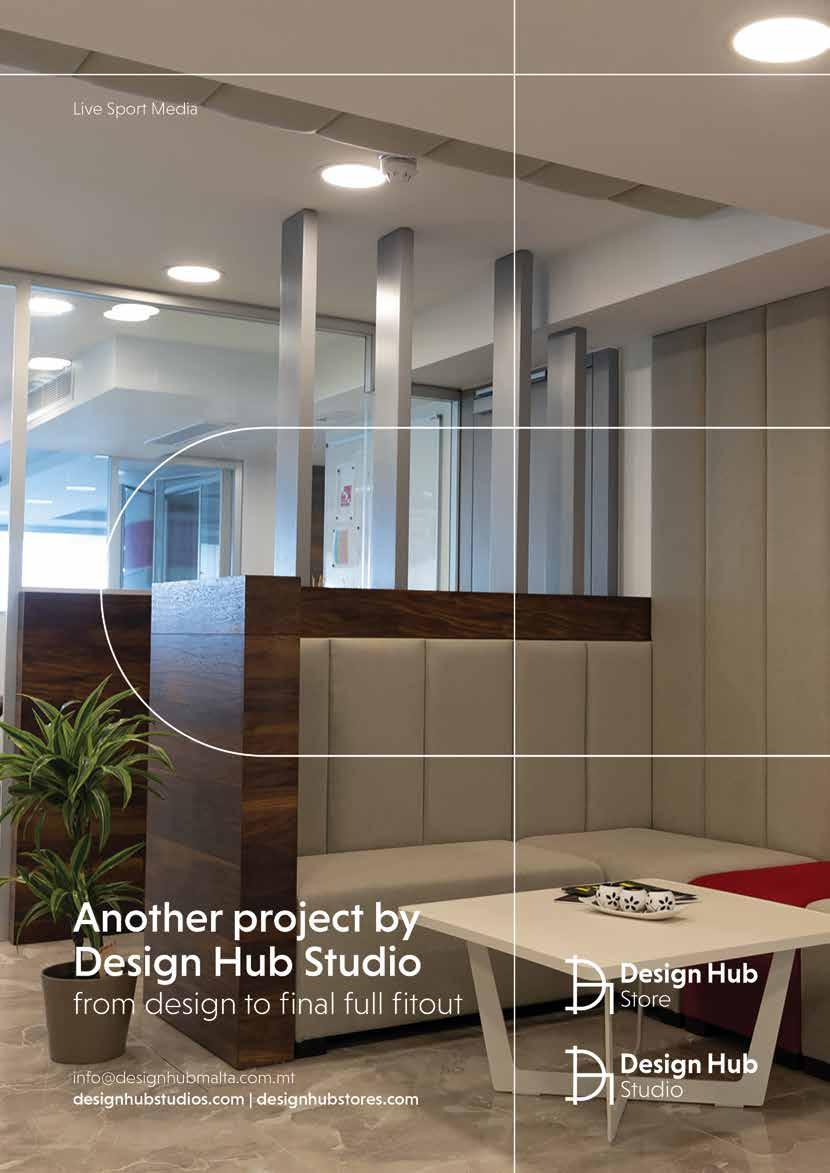
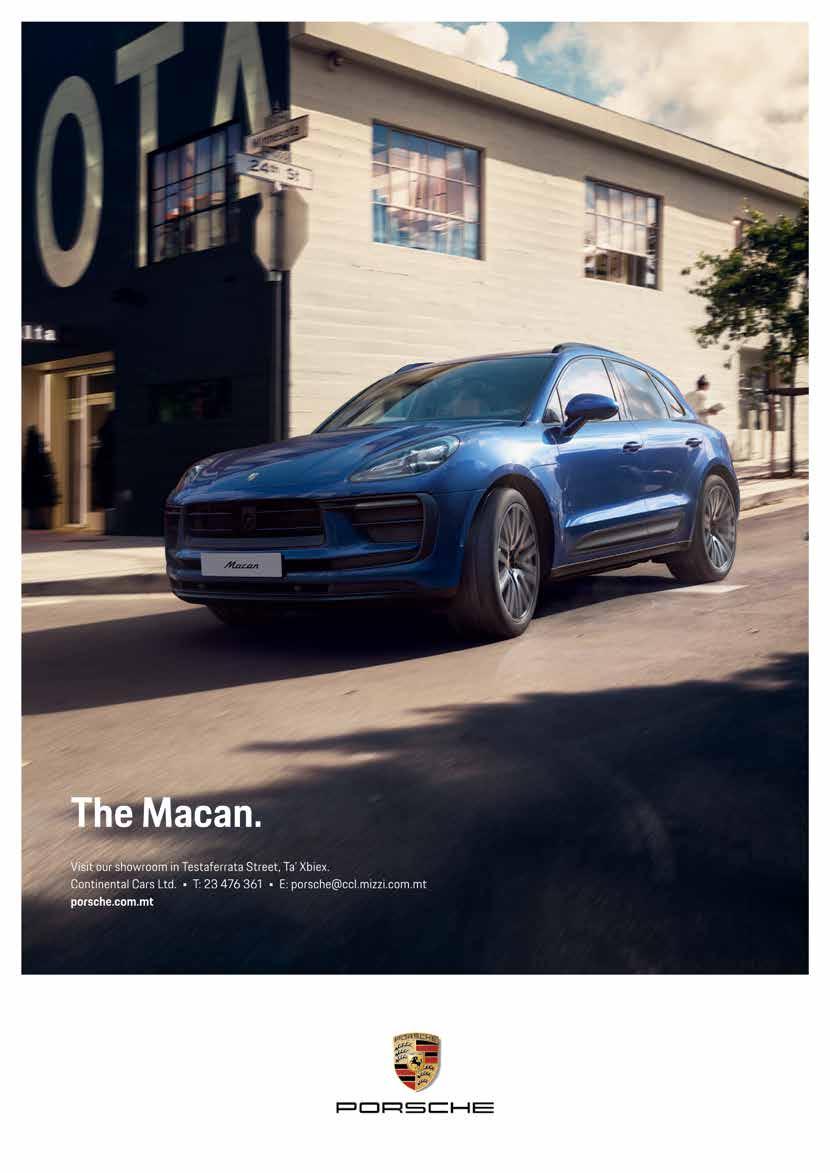 Angelo Dalli, CEO and co-Founder, UMNAI
Angelo Dalli, CEO and co-Founder, UMNAI
“This rapid expansion of AI means that its restrictions are mainly environmental – the trust deficit, computing power, public opinion, data and talent shortage – and regulatory, such as data privacy, security and bias management.”
“The main issue with AI is the advances in technology – the world is not there yet, and it may never be,” says Mr Livori. “Yet, when AI reaches a stage whereby it is more intelligent and capable than humans, called AI Singularity, the world will quickly become a very different place and gambling will be the least of our problems.”
Still, while simultaneously intimidating and intriguing in its potential, AI signals a new and exciting future across iGaming, he foresees. “iGaming is in constant growth worldwide, and always will be. If applied properly, AI can improve slot machine gameplay and perhaps even support virtual live casinos.”
Finally, Dr Gatt concludes that AI advances will continue to transform and grow the iGaming space – from its workforce to its player experience – but warns that the industry must pivot to ensure both employees and consumers can join the journey.
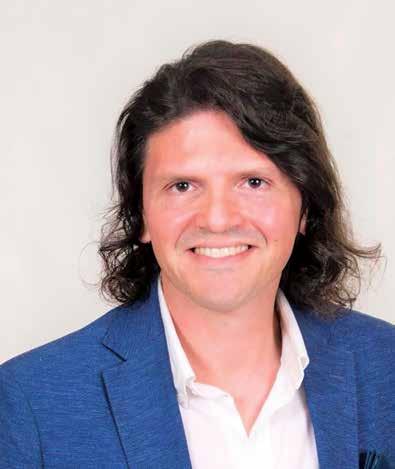
“iGaming businesses must have an agile mindset and a leadership team intellectually equipped to take decisions around data science. The workforce will change to exploit the capabilities of AI, leading to a restructuring of the supply chain. The future of jobs will be different. Employability will be less about what you already know and more about your capacity to learn and adapt over time,” he says.
“Much AI hype ‘hides’ the tough questions, shifting the discussion away from AI literacy to AI marketing-speak. We must explain key AI concepts, like classification and confidence levels, ethics, and fairness in machine learning, for non-technical audiences. This is a collective commitment towards the iGaming sector we serve,” Dr Gatt concludes.
083 2023 EDITION FOCUS
“THE LACK OF TRANSPARENCY MAKES IT HARD FOR OPERATORS, REGULATORS AND PLAYERS TO TRUST SUCH SYSTEMS, ESPECIALLY WHEN THERE ARE IMPORTANT IMPACTS ON FINANCIAL PERFORMANCE OR PLAYER PRIVACY.”
Accomplish YOUR MED-AESTHETIC goals
WITH
ST MARY’S MEDICAL AND BEAUTY CLINIC
St Mary’s Clinic is a medical and beauty clinic specialising in aesthetic medicine for over 20 years, with a complete medaesthetic division dedicated to the science of hair regeneration. The clinic prides itself on pursuing only the best methods with a medical team with extensive experience in the field of hair regeneration and surgical hair transplantation.
The aim of St Mary’s Clinic is to help clients rediscover confidence in their physical appearance, whether negatively affected by a growing waistline or receding hairline. Our clinic uses a holistic approach to achieve its goal, which is to nurture both the physical and emotional challenges that clients present.
YOUR HAIR RESTORATION JOURNEY

Your hair restoration journey at St Mary’s Clinic starts with a 30-minute consultation hosted by resident specialist medical practitioners. During the consultation, the specialist will examine the scalp, specifically those areas undergoing hair loss and identify healthy donor sites. Patients undergoing this journey have two options to consider: transplantation or a strengthening programme prior to transplantation. Our medical specialists will help you decide on the best course of action based on your end goal and their expertise.
Together with the medical practitioner, you will discuss the procedure and likely results, medical and family history of hair loss, as well as any previous procedures carried out. In the unlikely case of non-eligibility or if the choices given to you by our specialists are not appropriate for you, we have multiple non-surgical hair growth treatments available at our clinic for you to discuss with us. At the end of your consultation, you should feel confident in your chosen clinic and specialist practitioner. We pride ourselves on providing honest and factual information and advice based on real inpatient results.
084 2023 EDITION LIFESTYLE
FREQUENTLY ASKED QUESTIONS: WHAT IS A HAIR TRANSPLANT?
A hair transplant is considered to be the most effective procedure targeting male and female baldness. This is a surgical technique which involves removing hair follicles from a part of the body, called a ‘donor site’, which is planted into the desired bald or balding part of the head known as a ‘recipient site’. Hairs, called grafts, are removed from the ‘donor site’ one by one. Grafts contain hair follicles and are taken from parts of the head which are resistant to balding, such as the back of the head. The donor area is trimmed short prior to surgery so that grafts can be easily accessed and removed. Our hair transplant team will take great care in removing and placing the grafts to ensure that the transplanted hair will grow in a natural direction. The team will also make sure that the hair growth at the donor site is not adversely affected. The procedure takes approximately four to eight hours and no overnight stays in the clinic are required. Most hair transplants at our clinic are performed under local anaesthesia, making it a pain-free procedure.
WHAT IS THE POST-OPERATIVE STAGE LIKE?
Hair grafting requires post-operative care in order to obtain the best results possible. A detailed document is given to each patient who undergoes a hair transplant. A sample of this plan includes:
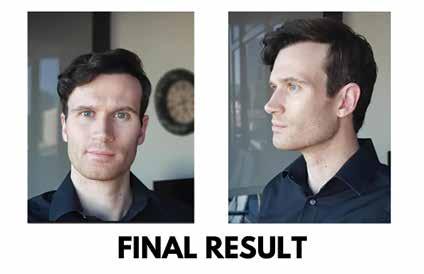
• Avoid washing your hair for the first three days after the procedure
• Rest as much as possible during the week following the procedure
• Spray the implanted area with saline solution every 20 minutes during the first few days after the transplant
• Wash your hair on day four after the procedure to remove any scabs formed after the transplant.
WHAT RESULTS CAN I EXPECT?
Results of a hair transplant start to show two months after the procedure and typically, results almost double within six to 12 months. Although grafts grow at varying rates in patients, significant growth can be seen within a six-month period. In our follow-up consultation, before and after photographs are compared to highlight the change. Final results of a hair transplant are seen one year after the procedure.


HOW LONG DO HAIR GRAFTS LAST?
After the surgery, more than 95 per cent of the hair follicles remain in the scalp, since these are genetically predisposed to resist hair loss. Therefore, they will remain in the head indefinitely. Of course, this is supported by proper care of the scalp and hair to further strengthen and prevent pre-existing hair from falling out.
For more information, visit www.stmarysclinic.net
085 2023 EDITION LIFESTYLE
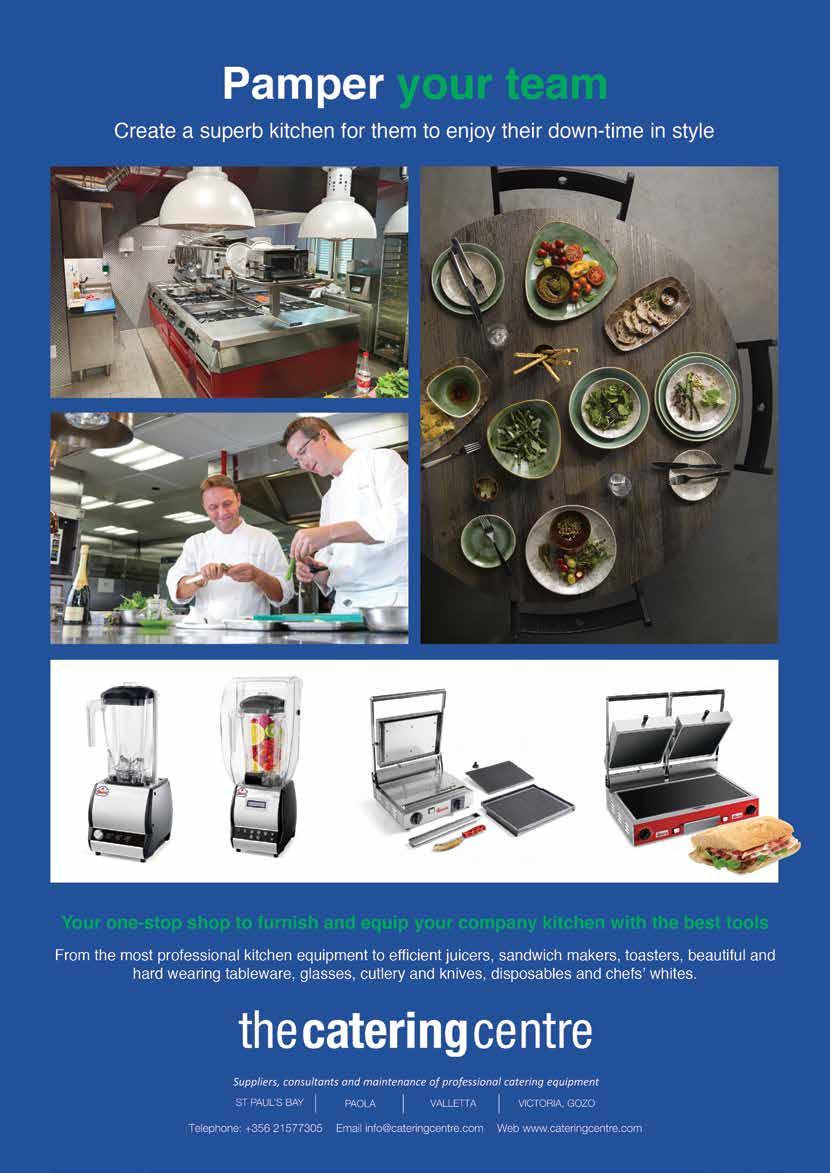
WEDNESDAY
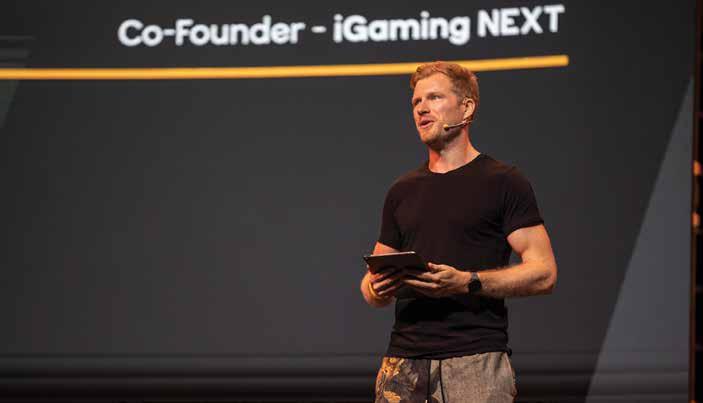
TUESDAY
TUESDAY
087 2023 EDITION CALENDAR iGaming Calendar NOVEMBER 2022
2ND Scandinavian Gaming Show Copenhagen, Denmark MONDAY 14TH SiGMA Europe MFCC, Malta THURSDAY 17TH Analytics & AI in iGaming Dubai, UAE Gaming & Sports Dubai Summit 2022 Dubai, UAE TUESDAY 22ND Eastern European Gaming Summit Sofia, Bulgaria Never miss a beat! Here are some of the most anticipated iGaming events, trade shows and conferences happening worldwide in 2022 and 2023. iGaming NEXT 2022. Credit: iGaming NEXT FEBRUARY 2023
7TH ICE London London, UK WEDNESDAY 8TH Lyceum Fire & Ice 20 years! London, UK TUESDAY 28TH Casino & eSports Conference Las Vegas, USA MARCH 2023
7TH iGaming NEXT: New York New York City, USA WEDNESDAY 8TH Gaming Expo Francophone Africa (GEFA) Casablanca, Morocco WEDNESDAY 29TH Prague Gaming & TECH Summit ‘23 Prague, Czech Republic APRIL 2023 WEDNESDAY 19TH SAGSE LATAM 2023 Buenos Aires, Argentina
iGaming Calendar
MAY 2023
TUESDAY 16TH
Mare Balticum Gaming & Tech Summit ‘23 Riga, Latvia
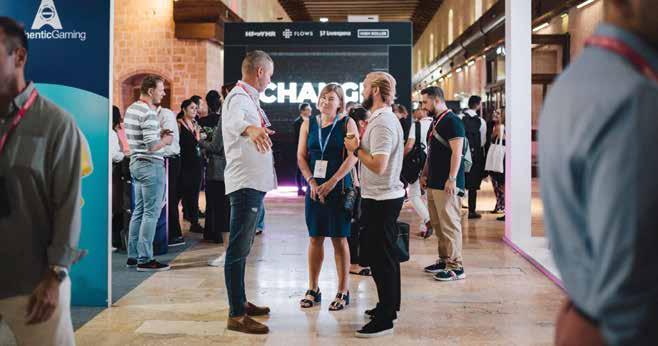
THURSDAY 25TH
Gambling Brasil São Paulo, Brazil
JUNE 2023
TUESDAY 13TH
Canadian Gaming Summit 2023 Toronto, Ontario, Canada
TUESDAY 20TH
iGaming NEXT: Valletta Valletta, Malta
THURSDAY 22ND
iGaming Central America San Jose, Costa Rica
MONDAY 26TH
World Gaming Executive Summit Barcelona, Spain
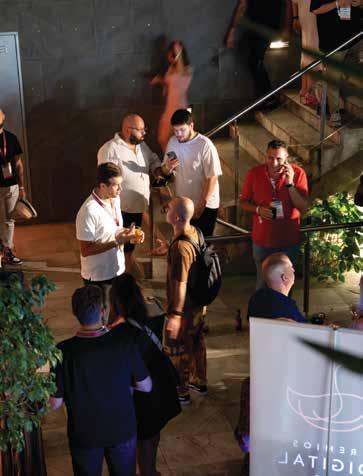
JULY 2023
WEDNESDAY 19TH
SiGMA Asia 2023 Manila, Philippines
WEDNESDAY 26TH
SPiCE Sri Lanka 2023 Colombo, Sri Lanka
088 2023 EDITION CALENDAR
iGaming NEXT: Valletta 2022. Credit: iGaming NEXT SBCBarcelonaSummit . Credit:SBC
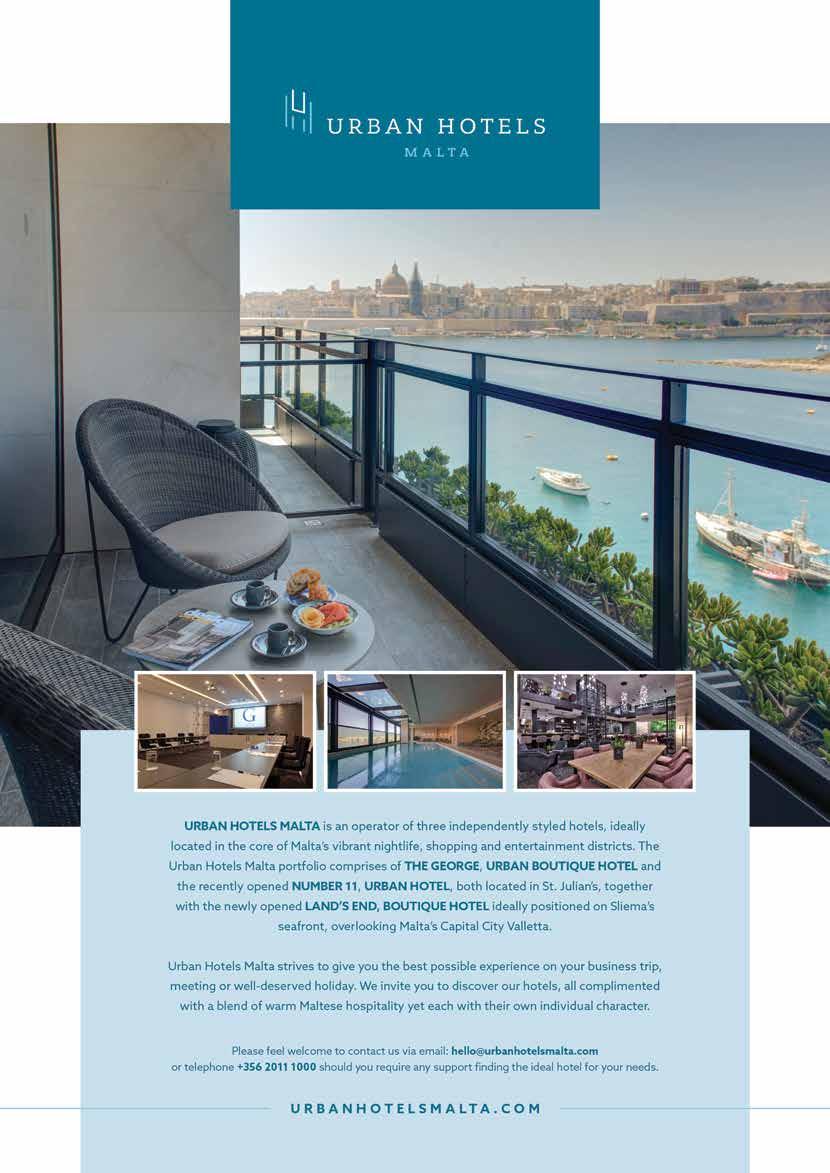

ADOPTING
glocalisation
glocalisation
AS AN
BUSINESS PRACTICE
In this regular column, Marion Gamel, Executive Coach and former C-level executive with over 20 years’ experience in corporate settings –including working for Google, Eventbrite and Betsson Group – explores the new phenomenon of ‘glocalisation’ – a trend that could be described as conducting business with the aim of global distribution, but which is adjusted to appeal to users in a local market.

he COVID-19 pandemic and the war in Ukraine both draw attention to realities of globalisation. The butterfly effect is more obvious today than ever before. However, consumers are increasingly drawn to what’s local to them – culture, talent, food, arts and sustainable production, for ecological reasons but also to re-create or strengthen the feeling of belonging to a community that’s geographically close. Many leaders I coach today are faced with the conflictual reality of what’s known as glocalisation: conducting
T >business according to both local and global considerations.

GLOCA-WHAT?
Glocalisation is not new: The term was first popularised by Roland Robertson, a British sociologist, in the 1990s. Globalisation is defined as the process of localising a global brand, concept or offering to a scale that fits local needs. Glocalisation is the cultural appropriation of a global brand or offering, so it is engaging among local customers.
091
essential
COACH 2023 EDITION
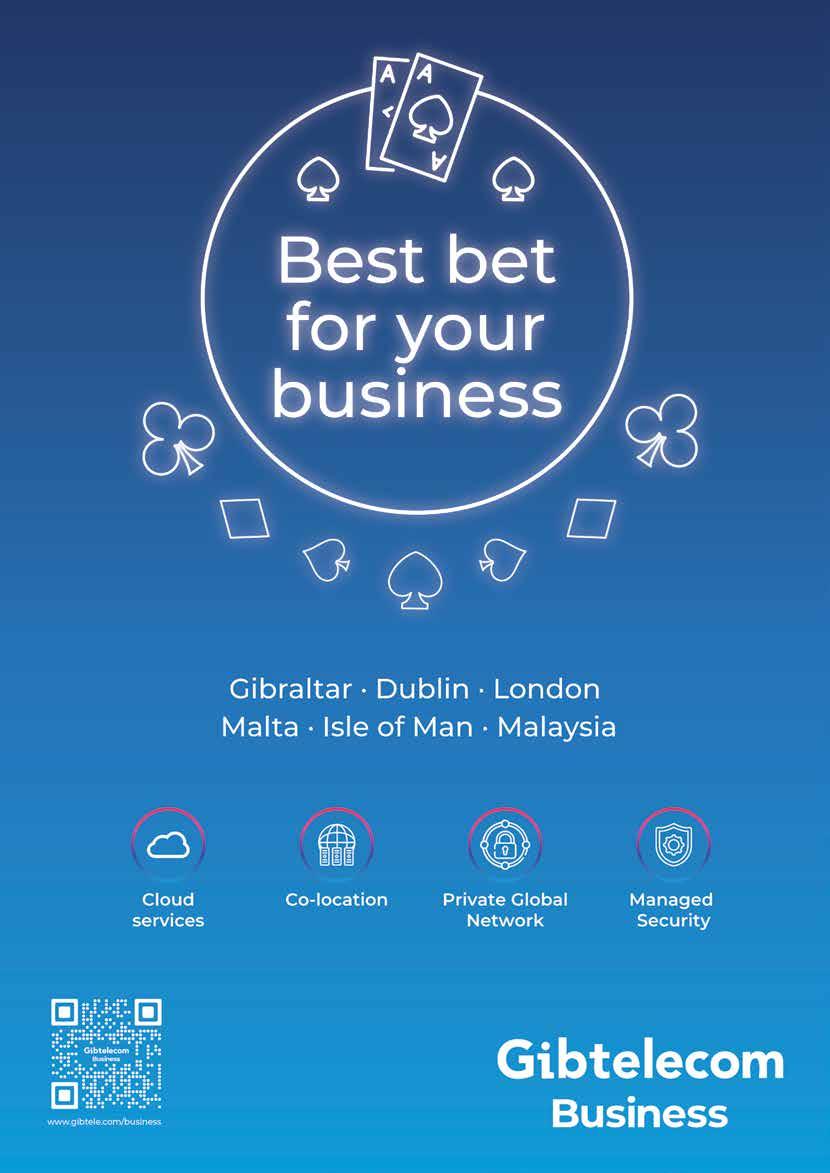
EMPOWERS COMPANIES TO SIMULTANEOUSLY KEEP GLOBAL AND LOCAL CONSIDERATIONS IN MIND, WHICH IS INVALUABLE IN REACHING AND MAINTAINING RELEVANCE AND EFFICIENCY.”
McDonald’s is a great example of glocalisation, often used to concretely explain the trend: McDonald’s has mastered customising its branding and its product offering to each of its markets, while maintaining a strong global brand and business model that is recognisable the world over.
McDonald’s restaurants in Israel sell ‘kosher Big Macs’ without cheese, while in Mumbai, India, McDonald’s has shifted from beef towards vegetarian and chicken options. Companies which have today mastered glocalisation are numerous: Starbucks, Lays, Pepsico, KFC, Ford, Gillette and Subway. They are all adept at the glocalisation mantra: “Global reach + local relevance”.
GLOCA-WHY?
Glocalisation brings several advantages to global businesses:
• Faster and deeper penetration of markets, in any region
Optimisation of marketing and PR messages, per market
Encouraging innovation, from any country
• Talent pool opening up to local and locallyknowledgeable talent
Enhanced access for customers to a wider choice of products and services due to increased volume and adequate pricing.
In short, glocalisation empowers companies to simultaneously keep global and local considerations in mind, which is invaluable in reaching and maintaining relevance and efficiency. Glocalisation is giving businesses the ability to deepen market access through a better understanding of local nuances and to leverage local efficiencies and talent.
GLOCA-WHO?
Two business functions noticeably take the lead in adopting a glocalised approach: talent management and marketing.
Talent management
Many expatriates have returned home during the pandemic, leaving behind talent gaps. Talent mobility remains uncertain, at least in the near future. International talent is still vital, and glocalised talent may be the key to recovery.

Two profiles define what glocal means when it comes to talent: local talent with a global outlook and global talent with local roots. These two profiles bring the best of both worlds: the ability to navigate local markets and a solid understanding of global business.
In talent management, glocalisation doesn’t happen overnight. It takes time for local and locallyknowledgeable talent to be given global opportunities so they can broaden their mindsets and keep learning, and for global and local ways of doing business to become intertwined. While glocalisation starts with leaders, in time, it cascades down the organigram.
It may be the right time for organisations to rethink their talent strategy for the long term, with >
093 “GLOCALISATION
2023 EDITION COACH
glocalisation in mind. Pankaj Ghemawat, Professor of Strategic Management at IESE business school says it best: “Global leaders need to understand the factors that shape international interactions in their business, by undertaking structured examination of crosscountry differences and their effects.”
Glocalisation not only entails identifying local differences, but also requires leveraging local characteristics to create a global competitive advantage. Such skills are essential for leaders driving global expansion and for managers of multicultural teams. Mastering glocalisation is de facto an essential skill for HR leaders of international organisations who need to identify, attract and retain top talent around the world.
Here’s a basic glocalisation challenge, relating to HR. Today, a global company may need to offer remote working as an option to its USA and European workforce who embraced working-from-home during the pandemic and who now prefers to continue working remotely. In the USA and Europe, many candidates see the ability to work remotely as a key factor when selecting a new employer and role, as many people have moved out of large cities during the pandemic. On the other hand, in many emerging markets, working for a global leader is seen as a ‘different experience’. A large percentage of candidates wish for a total immersion into the brand and the company culture, meaning, an office. It doesn’t take long to understand that in order to attract talent at a global scale, a one-size-fits-all approach won’t cut it anymore.
Marketing
Businesses seek to penetrate local markets, building brands that shine globally and resonate locally. Due to the global volatility we face, businesses focus on growing domestic market share, particularly in countries experiencing steep growth. A glocalised marketing message is not just relevant and appropriate, it signals commitment and sensitivity to customers: Glocalisation embodies the notion of diversity while being faithful to inclusion.
Let’s focus on Google’s take on marketing glocalisation. I joined Google in 2003, when it was a fast-growing, pre-IPO company taking over the world, one product at a time, starting with a transformational search experience to “make the world’s information available to all”.
After focusing on Google’s first international markets, UK and Ireland, I decided to focus on India where over one billion users would soon be ready for Google products. Then, I looked after Google’s expansion in the Middle East and Africa. At this time, Google was fuelled by the best talent and a unique ability to create transformative technology. In the early 2000s, Google was on a global mission using a global, fully scalable approach.
However, as the search giant set foot (and increased its investment) across the globe, the limits of a pureplay global approach started to be felt, primarily the lack of relevance on a local level. While Black Friday was popular in the USA, it meant nothing in Egypt. While YouTube was exploding in the Northern hemisphere, low Internet connectivity was delaying its progression in the Southern hemisphere. How to merge the two?
Google’s solution to glocalisation was 70/30:
• 70 per cent of marketing decisions (strategy, templates, campaigns, targets and so on) came from global. Marketers the world over received the tools, the creatives, the budget and more from Google’s headquarters.
• 30 per cent of marketing decisions could be customised to fit the context of local markets. It’s this 30 per cent of local freedom that gave Google its reach in markets as different as India and Egypt.
• To ensure that global branding guidelines were followed, Google put in place several touch-points for local teams, through which they could check that local initiatives respected the company’s overall brand. That’s glocal! >
094 2023 EDITION COACH
“A GLOCALISED MARKETING MESSAGE IS NOT JUST RELEVANT AND APPROPRIATE, IT SIGNALS COMMITMENT AND SENSITIVITY TO CUSTOMERS.”
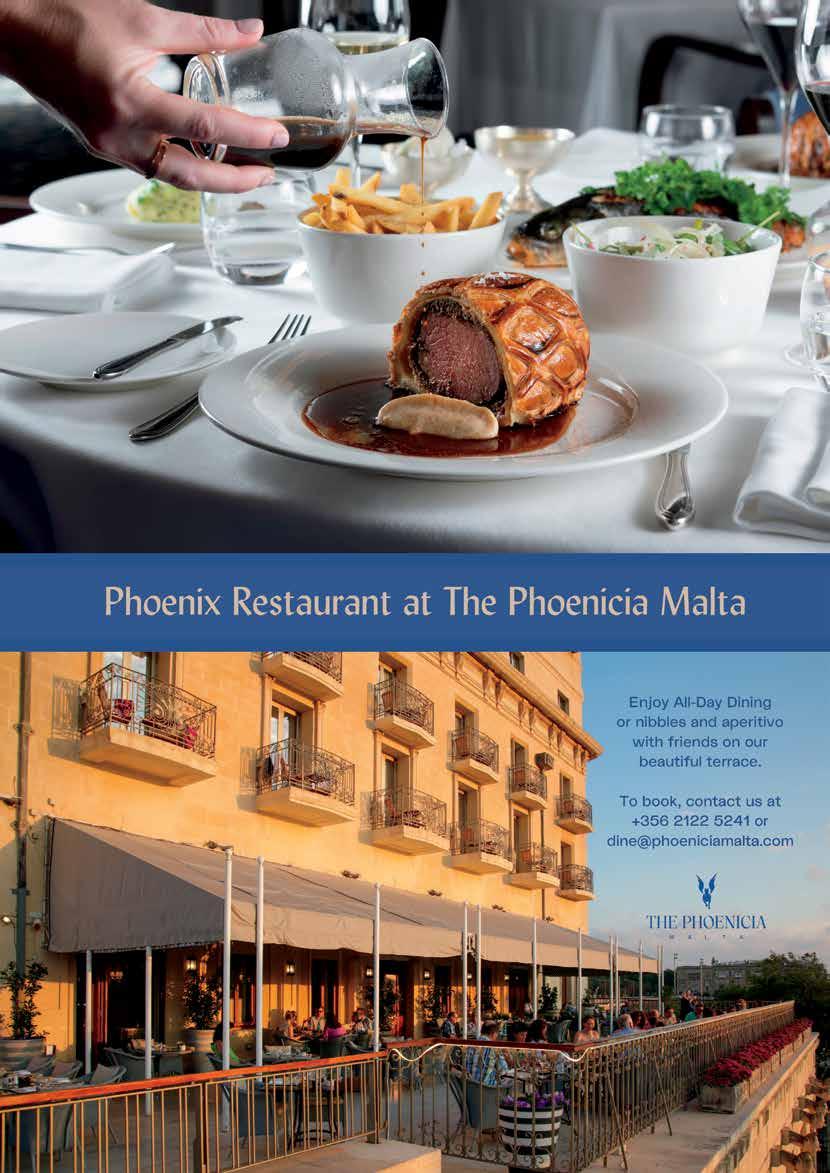

GLOCA-HOW?
There are four essential steps to a successful glocal approach.
STEP 1: Understand the market and local competition, customer preferences, local talent expectations, local culture and beliefs, as well as influencers. All are essential to developing an effective glocal strategy.

STEP 2: Understand the local talent pool and market as well as the best way for the local arm of the business to become a talent-magnet in each country. Recruit local as well as locally-knowledgeable top talent. Furthermore, several country regulations make the use of local labour compulsive. Once this is done, companies create synergies between a great local talent pool and global talent. Local insights help reduce resistance in some markets, and they also foster innovation.
STEP 3: Glocalisation also entails creating partnerships with local companies. Global players benefit from synergies with local companies, not only for the supply chain but also for promotion, distribution, etc. At Google, co-marketing partnerships were an essential part of local marketing strategies and a way to marry a globally-loved brand with locally-trusted players. A good example is the partnership that was created between Google and Vodacom in South Africa.
STEP 4: Creating a web of synergies is the final step. As local contexts may largely differ in political, economic, socio-demographic, regulatory and competitive terms, they require customised approaches. Companies can accelerate growth by creating synergies of global and local best practices, competences and processes.
Glocalisation is on leaders’ minds these days. In the VUCA (volatile, uncertain, complex and ambiguous) world we live in, the questions of how to combine the need for companies to grow at scale while being locally relevant in the message they send to users and potential candidates is ever present. This comes down to knowing what is core to your offering, mission and message – the global stuff that can’t be changed or you risk losing your soul – and what’s not core, that could be customised to each market or region in order to resonate further with local talent and customers.
Got a question for Marion? Email her at marion.gamel@gmail.com
097 2023 EDITION COACH
THAT MAKES A
Mindful OFFICE DESIGN home AWAY FROM

home
Following three years of intense works, Sean Cassar, Founder and Lead Designer of Design Hub Studio, can proudly add the completion of Bally’s Interactive’s offices as another feather in his (and his team’s) cap. He tells Martina Bartolo Parnis all about the project, from its initial concept four years ago through to the finish line.
Photos by Shaun Spiteri
WORKSPACE 2023 EDITION
098
From a process that began with the design of half an office floor back in 2018, the team at Design Hub Studio hadn’t imagined that, within four years, they would have gone on to complete the interior design and fit-out of the whole of The Emporium building in Msida, consisting of five floors, largely occupied by gaming company, Bally’s Interactive, which forms part of Bally’s Corporation.


Sean Cassar, Founder and Lead Designer at Design Hub Studio, says that, as the company’s branding evolved from their initial meetings, it increasingly needed more office space, which inevitably led to its expansion within the building, and to the evolution of a design brief that supported the studio’s evergrowing client base.
“Towards the end of us completing the first stage, which started out with half of level five, the client asked us to work on level zero, consisting of 1,000sqm of floor space, and then another, and another. In the middle of this, a bank moved into the building and commissioned us to carry out their office design and fit-out too, so by the end of it, we had designed and finished the entire block. This all took place during COVID-19, and we’re proud to have completed the project on budget and by deadline, and that the client kept returning to us time and again.”
From the outset, the client gave the studio flexibility to explore a creative design concept that factored brand identity into the space, but in a way that is subtle and indirect. “They gave us complete freedom. We were given the brand story and colour palette, which evolved over the course of the project. Therefore, we were inclined to create a space that is flexible but, most importantly, that is functional and provides a cosy, home-away-from-home feel.” >
099 2023 EDITION WORKSPACE
“WE WERE INCLINED TO CREATE A SPACE THAT IS FLEXIBLE BUT, MOST IMPORTANTLY, THAT IS FUNCTIONAL AND PROVIDES A COSY, HOMEAWAY-FROM-HOME FEEL.”

Sean says that, additionally, as the team worked on the space during the pandemic, “we were tasked with factoring in delicate scenarios such as hybridisation, bearing in mind that the company invested a lot in new desks areas and increased office capabilities, including a large kitchen and break-out space.”
At the very start, intensive interviews were carried out with all the team leaders to extract as much detail and information as possible about the intricacies and dynamics of every team, and subsequently customising the space around them.
“Space allocation is the backbone of everything –having the exact dimensions of all the work areas and traffic zones, establishing the best position for each team, understanding the constraints of the building itself, such as the positions of the ventilation system, as well as the doors and windows for natural light,” says Sean. “A lot of planning goes into this stage, and being in control of these many elements is what helps make a project successful.”
Bally’s Interactive occupies three and a half floors of The Emporium, beginning at level zero, which features several clusters of open-plan working spaces, a large boardroom, small meeting rooms, restrooms and a striking, geometric feature wall using dark timber and greenery towards the back of the floor.
“On this floor, we needed to flush as much light as possible from the front part of the building, so we used a glass partition to separate the entrance of the building from the work area towards the back.” >


0101 2023 EDITION WORKSPACE
Next up is level two, half of which is occupied by Bally’s, and includes an auditorium with a classroom-style setting that’s intended for interactive meetings and gatherings, as well as more meeting rooms and a kitchenette.
Level four, meanwhile, is home to many exciting spaces and features, not least the space control centre-inspired IT department and striking break-out space, which comprises a spacious terrace on the front of the building, a games area and a dining area adjacent to the kitchen, which is also an inviting social space for employees to mingle while making a coffee, having a snack or availing of the in-house catering service.
“The client wanted the kitchen to display what it offers to its staff, including the daily provision of fresh fruit, so we created a variety of preparation areas, such as a coffee station, a zone for heating up food, surfaces for preparing food and an island equipped with all kinds of tableware.”
Sean adds that, throughout the whole office, but especially on this floor, the team was very mindful of the acoustics. “The recreational area is often used as an events space for large groups of people, so here too we installed a large glass wall that separates the break-out space from the work space, and which also has the function of bringing in as much light as possible to the work area.”
Here, the studio introduced a partitioning system that is a prime example of how form and function can work beautifully together. Purposely-built units were affixed to the side of the desks, containing acoustic padding for sound absorption and covered with soft greenery, complemented with touches of timber. These units offer privacy between desk clusters and between the traffic zones and work zones of the office, but also hide untidy desks and ingeniously gather all unsightly wires that accumulate around them.

The design of the IT department on the same floor is one of the designer’s favourite areas, both for the work that went into it, and for the way it turned out – that is, just as he had intended. The area was modelled on a control centre-style setup, with all desks facing in the same direction, where a purposely-built wall was fitted, capable of supporting several large screens, acoustic padding and timber cladding. The rear side of the wall, which conceals all wiring and connections, can be accessed via a back door. “This area is an example of the level of customisation that we go for,” says Sean. “The panel was built for this purpose, and fitted with the right amount of padding which is both functional and fun.”
Customisation is at the core of the company’s design ethos and applied every step of the way – from furniture and doors to any kind of carpentry, including the acoustic padding used throughout the office. This serves the dual purpose of sound absorption and functional design. “The padding was an opportunity for us to play around with colours, fabrics and details wherever it was used – be it for a small meeting room where it extends up into the soffit, for the break-out area where it is paired with greenery and timber, or for the large boardroom, where the orange and
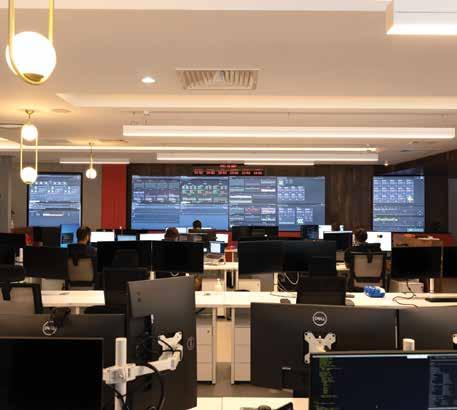
2023 EDITION WORKSPACE 0102 >

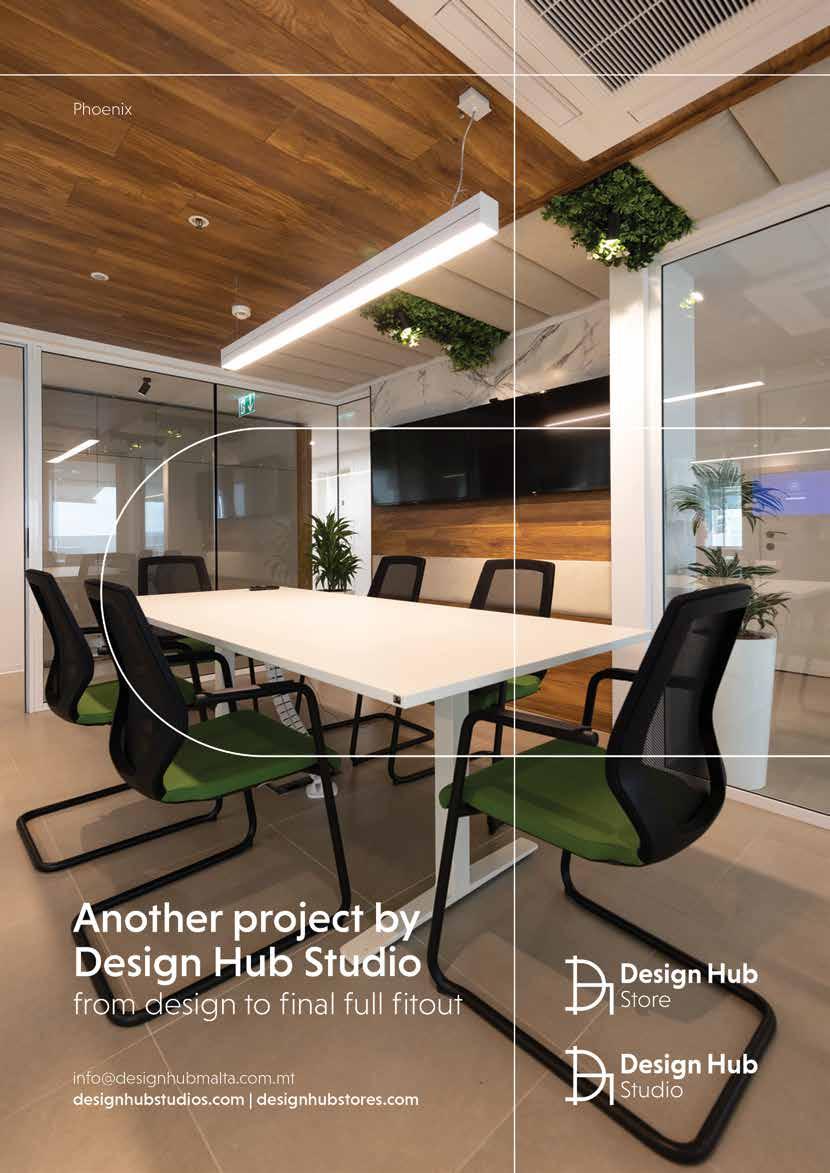
grey padding contrast against the bright yellow and blue chairs. Every piece was designed and created by our studio.”
On the uppermost floor, level five, the team embraced the same design methodology and aesthetic, despite having worked on half of the floor at the very beginning and the other half at the end of the process. “On this floor, we also experimented with timber, including for the soffit, and ambient lighting. We kept the exposed concrete in some areas and toned it down in others with softer finishes,” says Sean.
Impossible to miss is the designer’s love for natural materials which feature heavily throughout the office. “I’m a big fan of trying to make an office a home away from home, and this is also the company’s ethos. They want to ensure people are happy working there, which comes through in many ways, from the design of the space to the kitchen, freebies and amenities,” says Sean. “This
immediately follows through with deciding how to make that space warmer and more enticing for someone working long hours, including at night.”
The studio achieved this with the right tone of timber and ambient lighting, followed by the introduction of other materials and finishes. “We adopted a palette that is 80 per cent neutral, which includes timber, grey, white and a touch of metal that is consistent throughout, and paired it with a splash of marble, onyx and coloured acoustic padding,” says Sean.
After the palette is established, the team archives it, at least for a number of years, in order to maintain the individuality of each company. Sean adds that, to complement the studio’s growing clientele, the Design Hub Store was set up – an extensive library of resources for the team and clients to see, select and visualise materials and combinations for their project. >

2023 EDITION 0105 WORKSPACE
“THE [ACOUSTIC] PADDING WAS AN OPPORTUNITY FOR US TO PLAY AROUND WITH COLOURS, FABRICS AND DETAILS WHEREVER IT WAS USED.”
“Certain combinations might not appear to be an obvious match, but we use our creative know-how and experience to guide the client and convince them of what looks good and what will work. Following this, the design team builds a detailed visual render, complete with plans, elevations, sections, details of all the fittings and furniture to be built, as well as a bill of quantities, before an investment is confirmed.”
Sean asserts that, while certain elements of the original renders may change to ensure that the design fits within the client’s budget, the end result is mostly identical to what was proposed at the start of the design process. “Clients appreciate the consistency, and we’ve always taken pride in having the sketch, rendering and final photos look as close as possible.”
Throughout the course of this office project, the team at Design Hub Studio proved its ability to be agile and nimble in the face of a client’s evolving needs, be it a fresh brand identity or a growing workforce. Sean adds that the client, particularly Workspace Experience Manager at Bally’s, Lisa Galea, made the process smooth and satisfying for the Studio. “Her awareness of design and space allocation was really helpful to us, and it is a pleasure to work with such clients. We’re proud to have worked with quite a few who trusted us this way.”

Sharing his personal highlights of this project, Sean says the design and completion of the IT department was both a challenge and a reward. “A lot of thought went into it, and although it was challenging, it was also fun – very often, the harder it is, the more fun it is to find a solution that is functional and aesthetically pleasing,” he shares. “Overall, the way this level came together, with the work area, break-out space, kitchen, meeting rooms and IT department all on one floor, is something we’re proud of and which we think truly paid off.”

0106
“CLIENTS APPRECIATE THE CONSISTENCY, AND WE’VE ALWAYS TAKEN PRIDE IN HAVING THE SKETCH, RENDERING AND FINAL PHOTOS LOOK AS CLOSE AS POSSIBLE.”
2023 EDITION WORKSPACE

THE RISE AND property OF MALTA’S RENTAL MARKET
 Photo by Gergely Vas / viewingmalta.com
Photo by Gergely Vas / viewingmalta.com
rise
As the iGaming industry proves it’s very much back in the game following an uncertain couple of years, it once again has an important role to play in Malta’s property rental market. Edward Bonello catches up with three leaders from the sector for their thoughts on how these two economic players go hand in hand.
PROPERTY 2023 EDITION
0108
With a feeling that the COVID-19 pandemic is now, somewhat, behind us, the economy has bounced back with considerable energy, releasing a great deal of pent-up initiative across several sectors. This upward burst is also being felt in the property rental market, as the iGaming industry is once again firing on all pistons and bringing back significant momentum to this real estate segment after a two-year slowdown.
Philippa Tabone, Letting Division Manager at Frank Salt Real Estate, paints an upbeat picture about the current status of the property rental market, saying “it has bounced back big time and we are very much back to prepandemic levels, and more so.”
“Though this cannot be attributed entirely to employees in the gaming sector alone, they form an important part of the mix. As a general observation, we are noticing a considerable influx of clients hailing from a number of economic sectors, yet the gaming industry continues to attract several employees who choose to relocate to Malta.”

Ing. Kevin Muscat, General Manager at Mizzi Estates Ltd is in agreement. “Gladly we notice that the market is picking up. We are gradually approaching pre-pandemic rates and our indications are very encouraging. Occupancy levels across our entire portfolio of residential properties has been very positive,” he notes, as he reflects on the market’s performance in 2022 so far.
Architect, real estate entrepreneur and former CEO of Engel & Völkers Malta, Benji Tabone Grech, shares that “prices during the pandemic reduced considerably, which caused significant movement. Now, a low supply of property when compared to demand, is pushing prices back up. The main areas around Sliema and St Julian’s remain the most popular,” he notes. >
0109 2023 EDITION PROPERTY
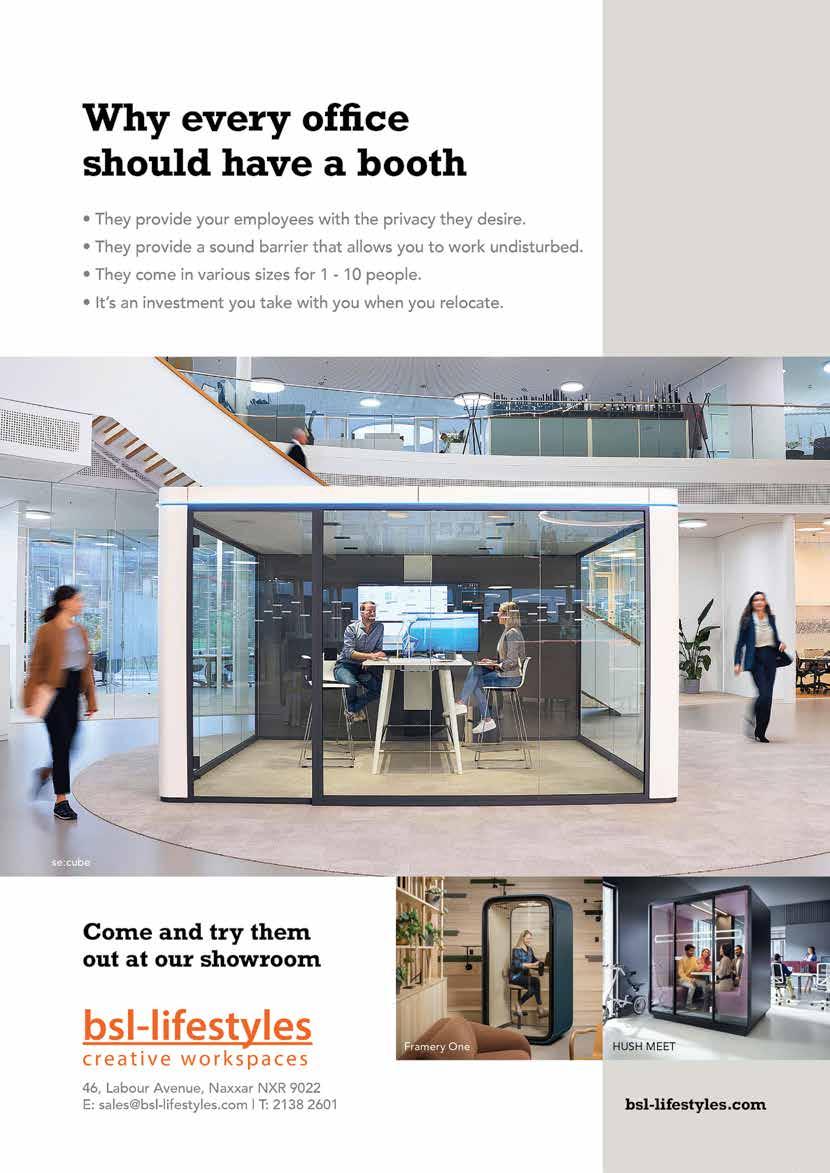
“Short lets have created competition between landlords and between the long- and short-let market. As travel restrictions were lifted, greater confidence in the shortterm market was noticed, reducing the availability of long rentals,” Mr Tabone Grech reflects. “2022 has been one busy year for sure. I have most certainly seen some record rental values in the region of €18,000 monthly. However, in general, the average value demand has reduced to what we were accustomed to pre-pandemic. This is clear with the average worker not being a whitecollar employee.”
Frank Salt’s Letting Division Manager explains how iGaming professionals tend to have a variety of requests when it comes to rental preferences. “They will usually go for a number of rental options, however, the majority of them will more likely choose apartments in the areas of Gzira and Sliema, which are close to their workplaces. Vicinity to St Julian’s, Malta’s entertainment hub, remains an important factor for this cohort,” Ms Tabone notes.
She explains that the average iGaming employee will often choose a two-bedroom apartment, however this also depends on whether they would be sharing or renting alone. “The truth is that when they can afford to rent alone the majority prefer to do so. But many opt to share accommodation. This solution is evidently convenient as it allows them to go for better renting options than they would if they rent on their own.”
When it comes to location, Ms Tabone adds that many iGaming employees are starting to venture further from the usual spots, even considering villages in the south, “though these would most likely be the more seasoned employees who would have been living in Malta for a while and usually drive.”

0111 2023 EDITION PROPERTY
“I WOULD PUSH ANYONE WHO HAS SOME SAVINGS TO LOOK INTO INVESTING IN AN APARTMENT WITH THE AIM OF RENTING IT OUT, ESPECIALLY SMALLER UNITS WHICH ARE THE STRONGER PLAYERS IN THE GAME.”
Philippa Tabone, Letting Division Manager, Frank Salt Real Estate
>
Ing. Muscat shares that after pinpointing the ideal location, iGaming professionals normally consider the standard and quality of a property’s furnishings and finishes, “which is in fact one very important consideration we value at Mizzi Estates.”
“Best-of-breed energy efficient appliances, key-less entry systems and back-up generators are all elements which clients nowadays look at and value when renting a property. Hybrid and work-from-home models have also brought about a noticeable change in this field – with home comfort moving further up the priority list when one is looking to rent. Overall service and experience provided by the landlord are also key elements – and essentially what drive a client to either renew a lease for another year or look elsewhere,” he explains.
The General Manager at Mizzi Estates says there’s a mix in the market of clients choosing to rent alone or share with others. “It’s a combination of both. Naturally, it very much depends on one’s income. C-suite employees and executives tend to rent an apartment of their own – especially if they have relocated to Malta with their families. Middle-income earners often share an apartment between two or even three.”
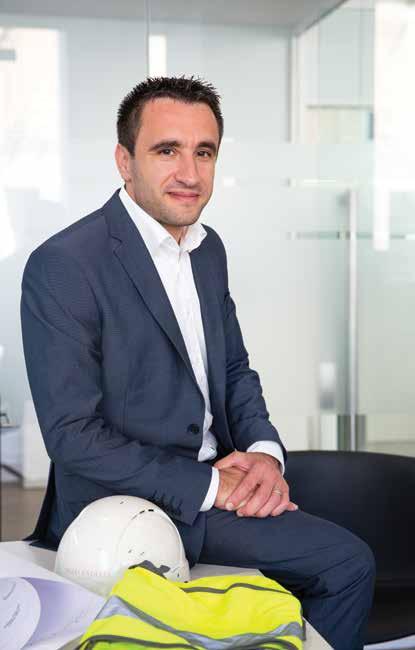
Reflecting on the choice of location, Ing. Muscat agrees that the central areas are the most popular with iGaming renters. “Swieqi, Ibragg, Sliema, Gzira and St Julian’s remain the most popular since a substantial number of gaming companies are based there, and one would also be close to what is probably Malta’s main entertainment and commercial district. However, we have seen increased interest in other areas such as St Paul’s Bay and Bugibba.”
While convenience and budget play a significant part in where individuals choose to rent, these are certainly not the only factors. “The importance a client gives to one consideration over another, such as travelling time, over choice and variety of entertainment options and amenities available close-by, all play an important role in the decision process.” >
0112 2023 EDITION PROPERTY
“GLADLY WE NOTICE THAT THE MARKET IS PICKING UP. WE ARE GRADUALLY APROACHING PRE-PANDEMIC RATES AND OUR INDICATIONS ARE VERY ENCOURAGING.”
Ing. Kevin Muscat, General Manager, Mizzi Estates


Mr Tabone Grech has also seen a spike in requests for shared accommodation, with areas such as Msida, Gzira, San Gwann, Sliema and St Julian’s remaining the most popular. However, location trends are changing, especially among expats who have made Malta home for quite some time. “Renters who have been in Malta for a while are finding it preferable to choose locations such as Zebbug and Rabat, as they are venturing outward from areas of high demand,” he notes.

“We are also pleased to note that Valletta is rising in the charts as a preferred location, together with a number of villages. I believe that initially iGaming employees will be willing to try new areas based on better pricing options, however, they quickly discover different, quieter neighbourhoods which they grow to prefer,” he says.
With positive forecasts for Malta’s real estate rental market, which shows no signs of slowing down, Ms Tabone from Frank Salt concludes, “I would push anyone who has some savings to look into investing in an apartment with the aim of renting it out, especially smaller units which are the stronger players in the game.”
2023 EDITION PROPERTY
“RENTERS WHO HAVE BEEN IN MALTA FOR A WHILE ARE FINDING IT PREFERABLE TO CHOOSE LOCATIONS SUCH AS ZEBBUG AND RABAT, AS THEY ARE VENTURING OUTWARD FROM AREAS OF HIGH DEMAND.”
Benji Tabone Grech, Architect and real estate entrepreneur
Photo by Inigo Taylor
0115
GET YOUR licence Dhalia
WHY YOU NEED TO real estate WITH REAL ESTATE SERVICES
Dhalia Real Estate is the first real estate agency in Malta licensed by the Malta Further and Higher Education Authority (MFHEA) as a further education institution. Our training centre provides anyone wishing to acquire a real estate licence and join the real estate industry the opportunity to do so with our qualified courses and experienced tutors.
Following the recent change in the law concerning the accreditation of real estate professionals, all those seeking to work in real estate must hold a certificate and qualify for a special licence, which is valid for five years.
Our training centre is up to date with all real estate industry knowledge and skills required for certification, including work experience and guidance from our managers. However, acquiring your certificate through us also provides trainees with other great benefits.
GET CERTIFIED FROM HOME WITH FLEXIBLE SESSIONS
Trainees have the option to carry out their training remotely, with different sessions during the week, making our course flexible and easily accessible from the safety and comfort of one’s own home. We understand the needs of our trainees and the current times, so flexibility is one of our top priorities!

TRAINING IS ON THE HOUSE
Courses cost money, but at Dhalia, we want you to save. Training is in-house, meaning that our courses are being offered free of charge. We want to invest in your success.
0116 PROPERTY 2023 EDITION
LICENSED FROM A WELL-KNOWN, REPUTABLE AND RESPECTED AGENCY
At Dhalia, we pride ourselves on the work we have done to become one of the most successful real estate agencies on the island, as well as being the first licensed agency to provide this certification. We aim to offer high-quality services in everything we do, including our training. By getting your certification with us, you can be assured that what you are taught is supported by years of arduous work, commitment and experience.
The benefits of our training centre are not to be missed – this is a terrific opportunity to get your certification through a reputable agency, which has your success in mind. We provide the expertise and dedication to help make our trainees successful in all aspects of their work in the real estate industry. Dhalia is made up of professionals who have built a reputation based on trust. Our role is to help people find property in Malta and Gozo and act as a guide and educator to ensure our clients are as satisfied with their new property as they are with our service.
Since 1982, Dhalia has followed this philosophy and it has allowed us to grow and become Malta’s largest privately owned real estate agency. Today, our branch office network stretches across Malta and Gozo, facilitating contact with our customer base and ensuring our property consultants are always within easy reach. Apply now to get the full training experience.
Dhalia Real Estate Services is licensed by MFHEA as a Further Education Institution (Licence: 2021-001).
For more information, contact Ingrid Sciberras, HR Executive, on hr@dhalia.com; M: 9949 5187; T: 2149 0681.
LEARN FROM OUR EXPERIENCED TUTORS
Our course provides training from several experienced tutors – these include lawyers, notaries, and our marketing manager, all with years of experience working with real estate. These tutors add to the quality of our course and provide a holistic look at the workings of the real estate industry.
GUIDANCE FROM EXPERIENCED MANAGERS AND CONSULTANTS

Apart from our theoretical education course, at Dhalia we also place importance on education by experience. Once the course is complete, beginners are paired with experienced property consultants and managers. We aim to prepare new recruits for everything they may encounter in the working world as a property specialist.

0117 2023 EDITION PROPERTY
PAPA
RAZZI
It’s been a fun-filled and social summer for Malta’s iGaming community, with several large-scale gatherings as well as smaller, team-building activities taking place across the island.

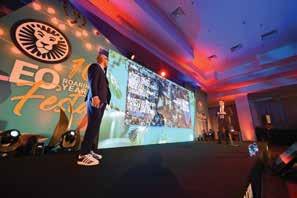




LEOVEGAS
LeoVegas Group marked its 10-year anniversary with the elaborate LeoFesta, a three-day event held in St Julian’s in September. Almost 900 employees from offices across the globe took part in the festivities to celebrate the Group’s success story as it embarks on a new chapter, following its acquisition by MGM Resorts International. Among the eminent guest speakers present was the Minister for the Economy, EU Funds and Lands, Silvio Schembri. >

0118 2023 EDITION PAPARAZZI

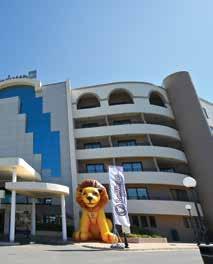
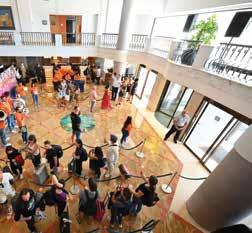





0119 2023 EDITION PAPARAZZI

HERO GAMING
1. Battlemaxx team building event
In June, Hero Gaming’s commercial team battled it out at a Battlemaxx session at the old prison in Kordin.


2. Summer Event
At the start of summer, the team, including remote employees, got together for a summer party held at Ta’ Betta Winery.



3. Malmo Pride
The Swedish Hero team got together in their new offices to celebrate Pride in Malmo, which is marked every year in July.


4. Hero Talk
Thomas Jones, CEO at games studio Yolted, visited the team in August to share his knowledge about localisation, how it works, its significance, and how it affects everyone in iGaming.
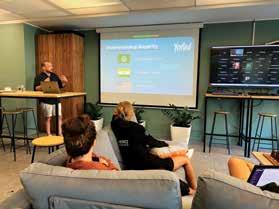
5. All Hands Get Together
In September, the team got together for an All Hands Meeting – an opportunity to regroup and go through the company’s progress, achievements and company updates, and to realign on strategy.
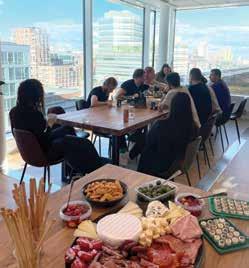
0121
1 2 3 4
> 5 2023 EDITION PAPARAZZI
BALLY’S INTERACTIVE
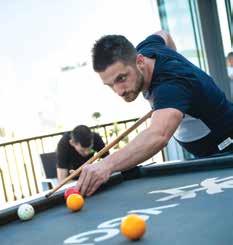
Summer 2022 marked the 15-year anniversary of the team in Malta, which lined up with the grand re-opening of Bally’s newly refurbished fourth floor space, complete with a brandnew kitchen and terrace area. CEO Lee Fenton and Chief of Staff Tina Southall never miss an opportunity to celebrate company milestones, so they popped the champagne and welcomed the teams to their sprucedup environment.
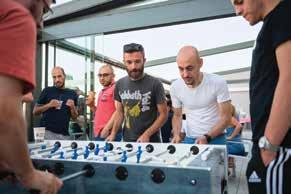
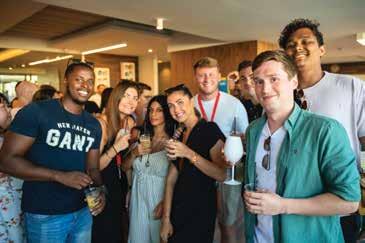
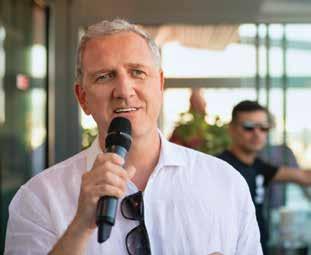

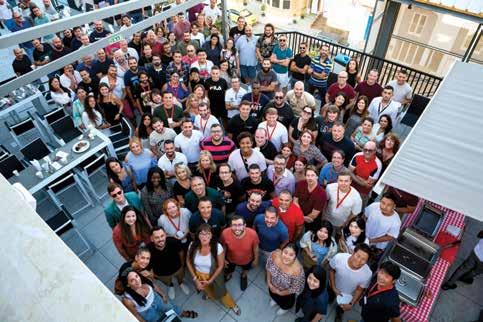

2023 EDITION PAPARAZZI
0122

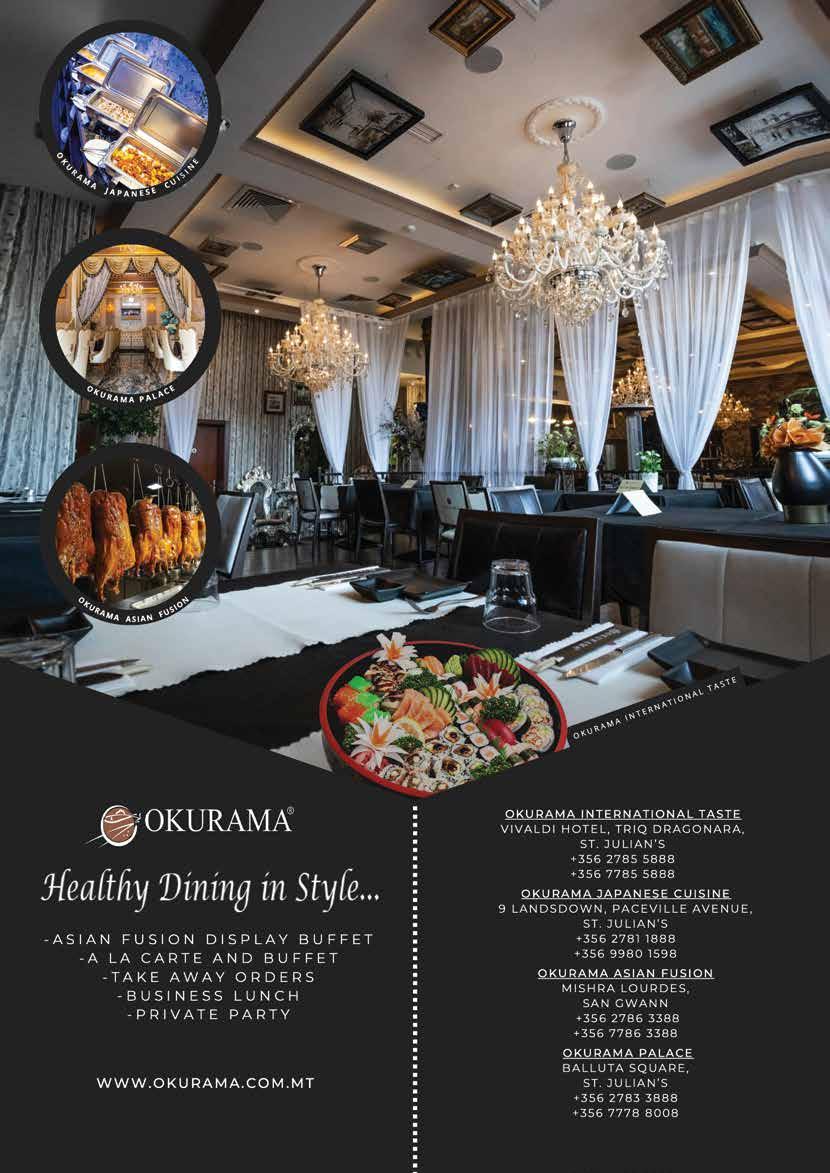































 Russell Mifsud, Director and Gaming Lead, KPMG
Russell Mifsud, Director and Gaming Lead, KPMG

























 Nikolai Livori, CEO, Kanon Gaming
Nikolai Livori, CEO, Kanon Gaming









































 Angelo Dalli, CEO and co-Founder, UMNAI
Angelo Dalli, CEO and co-Founder, UMNAI
































 Photo by Gergely Vas / viewingmalta.com
Photo by Gergely Vas / viewingmalta.com











































